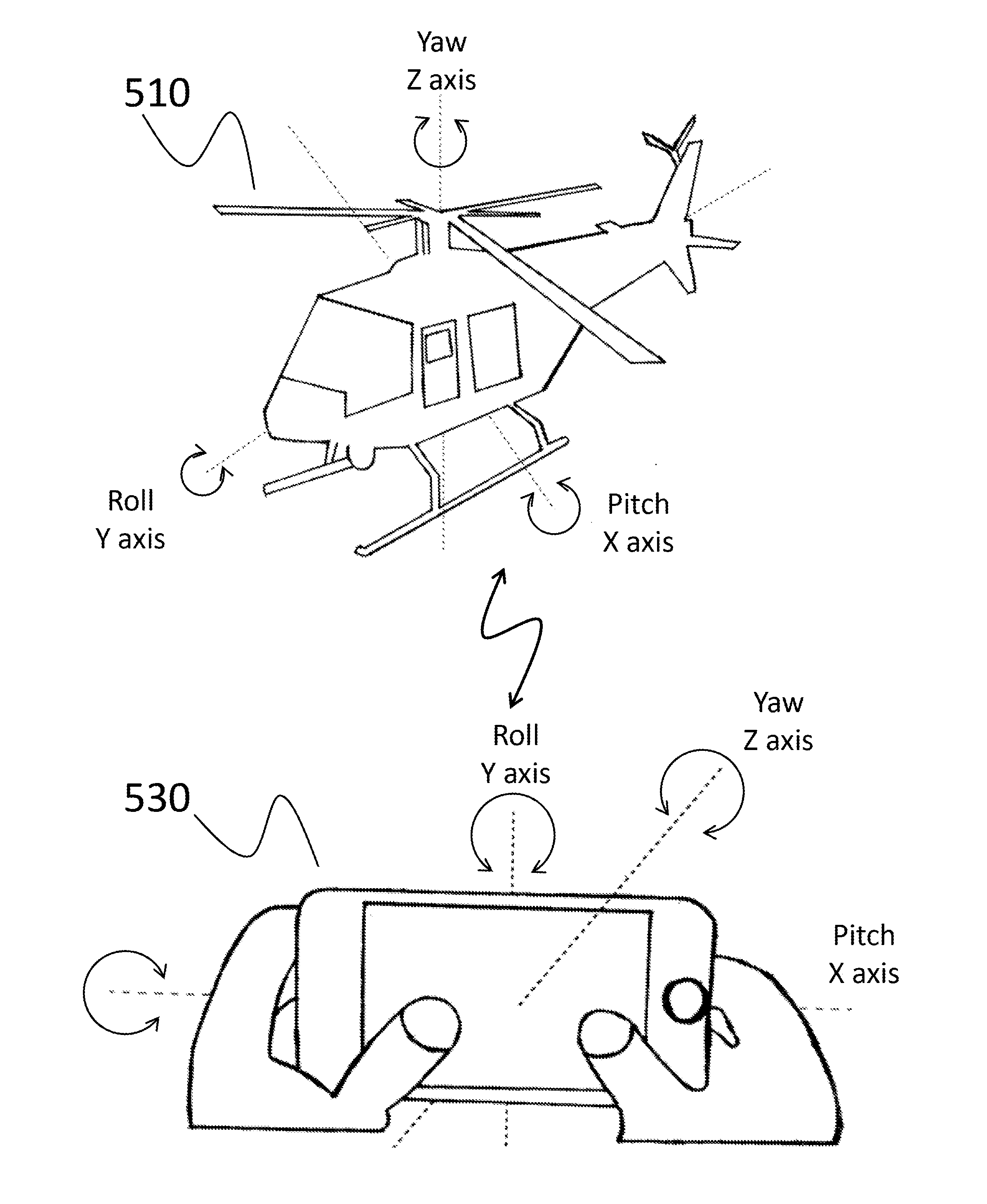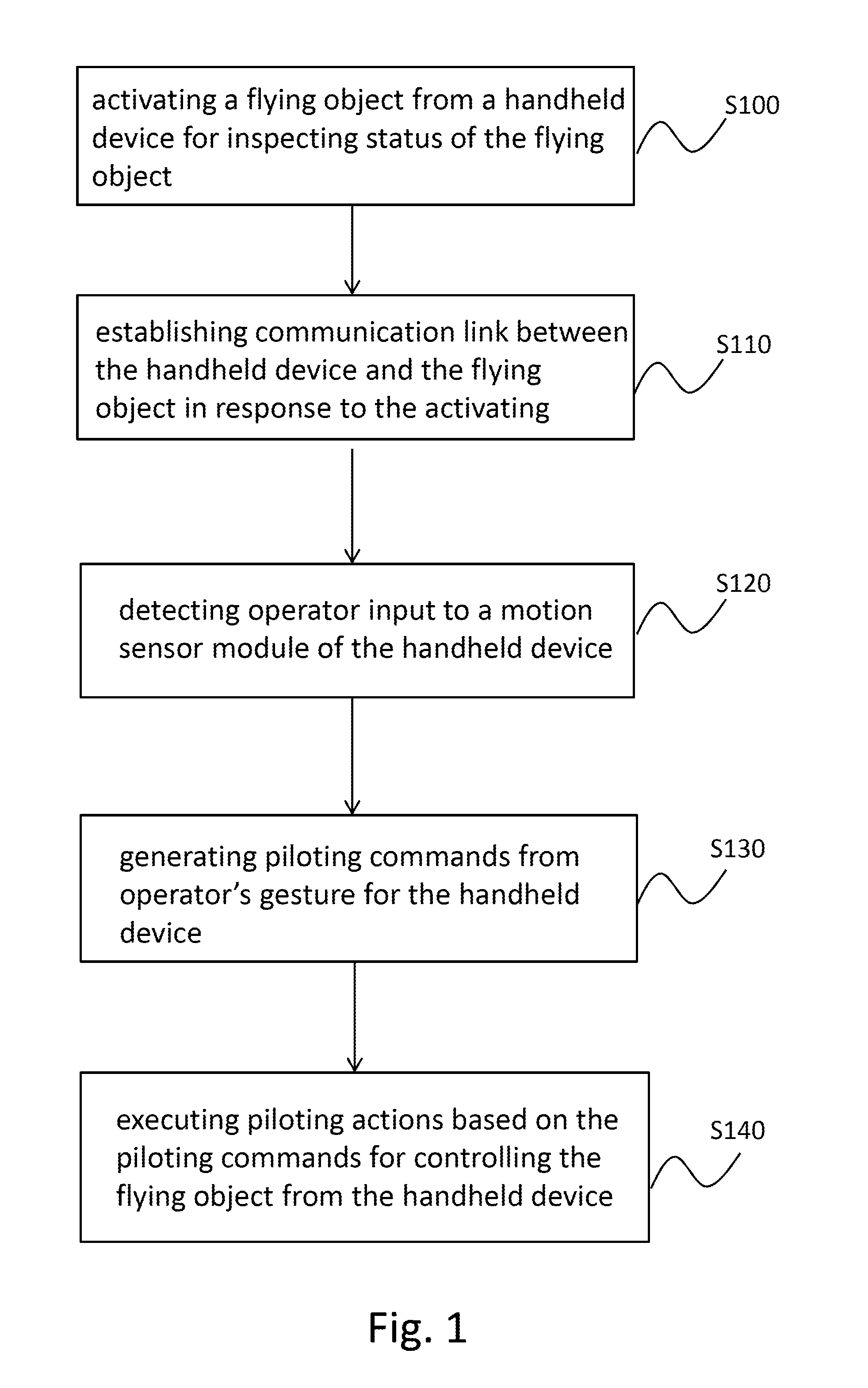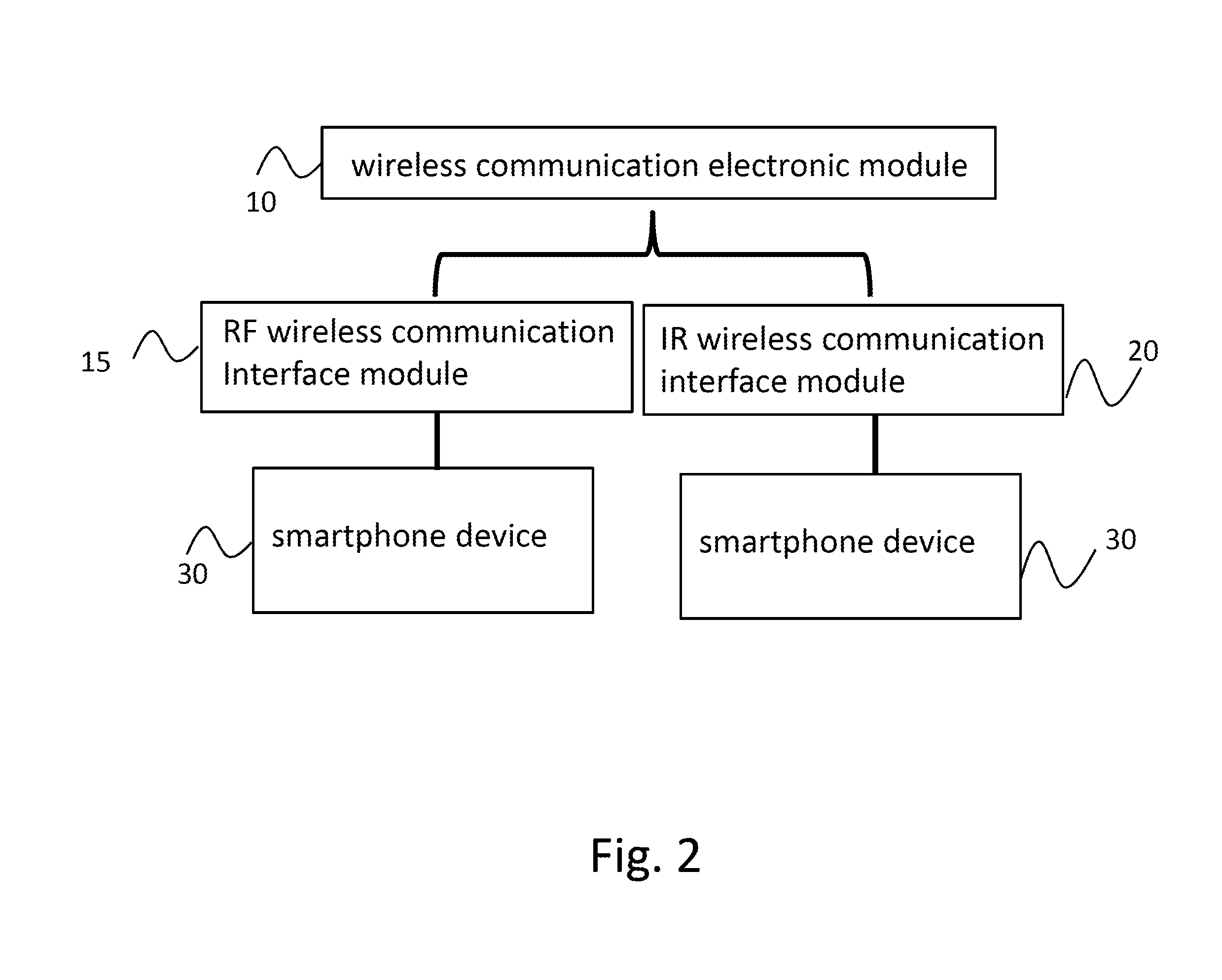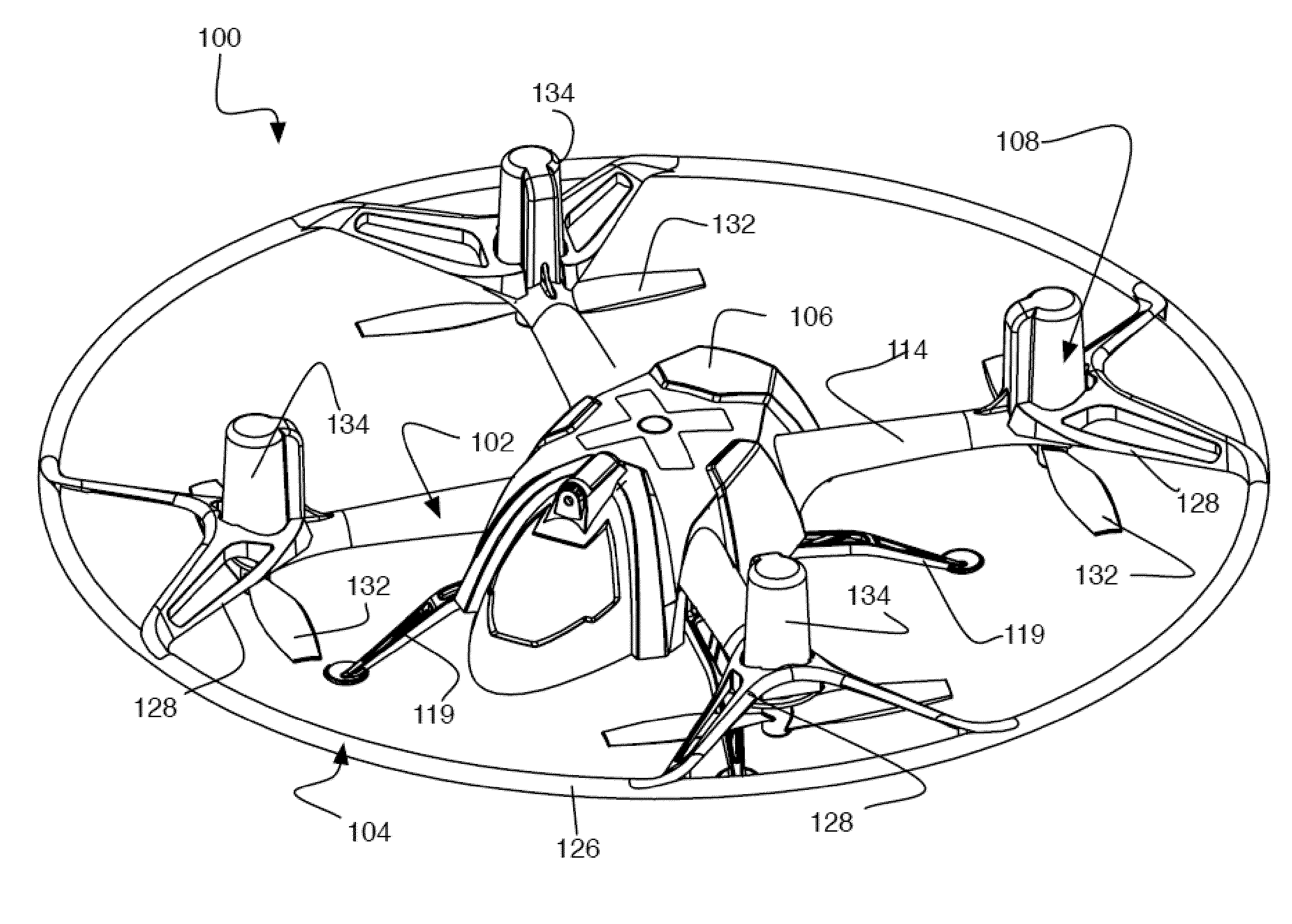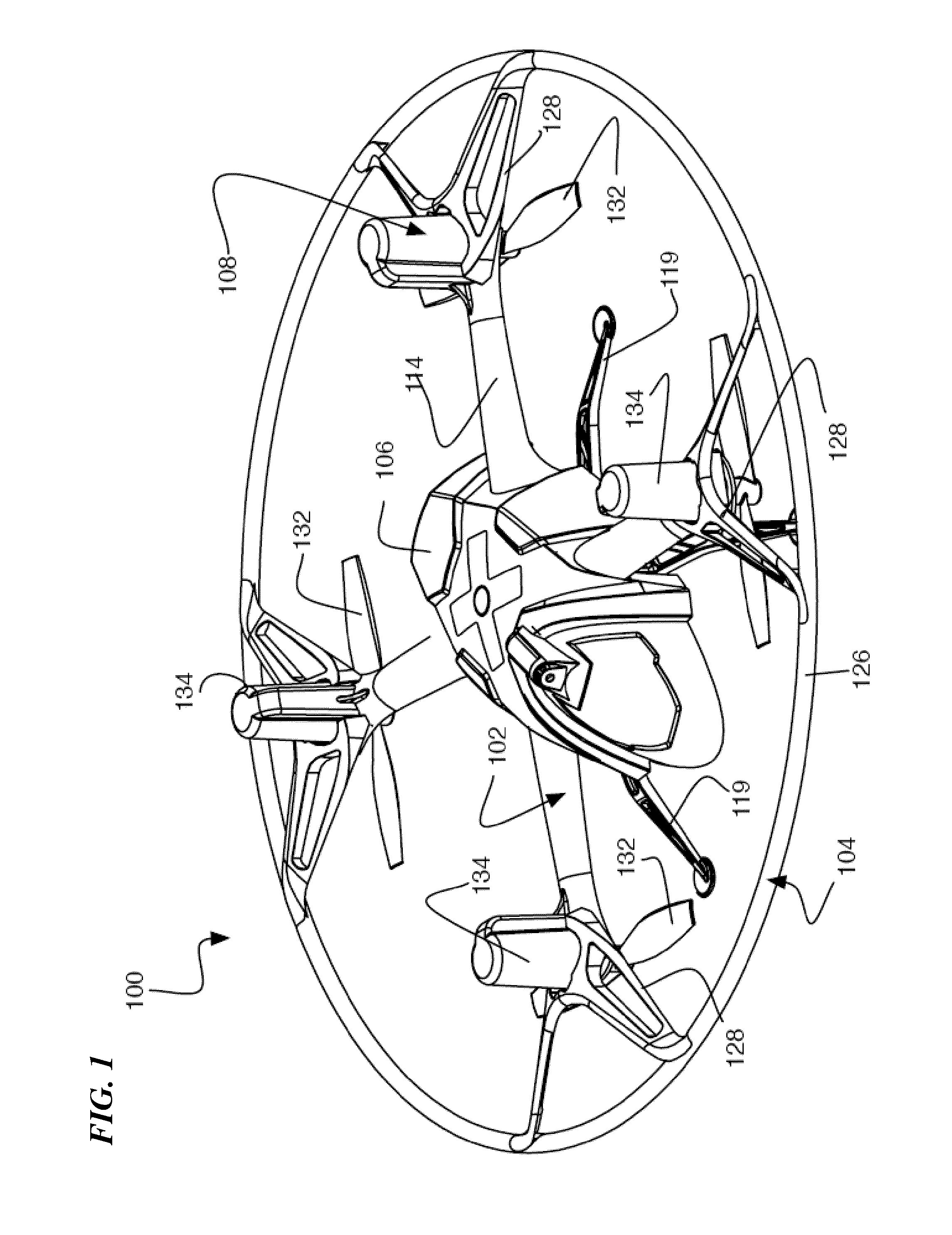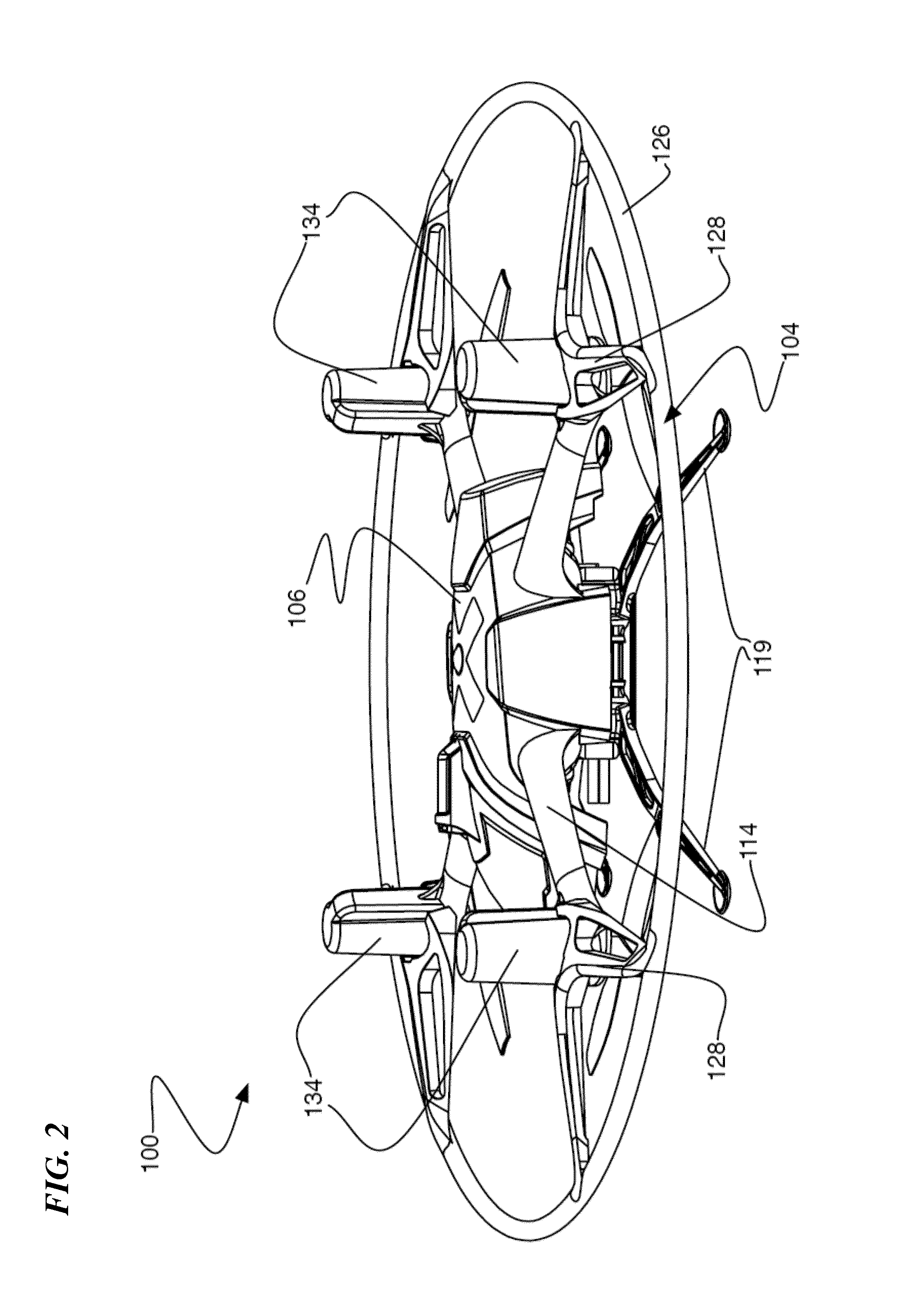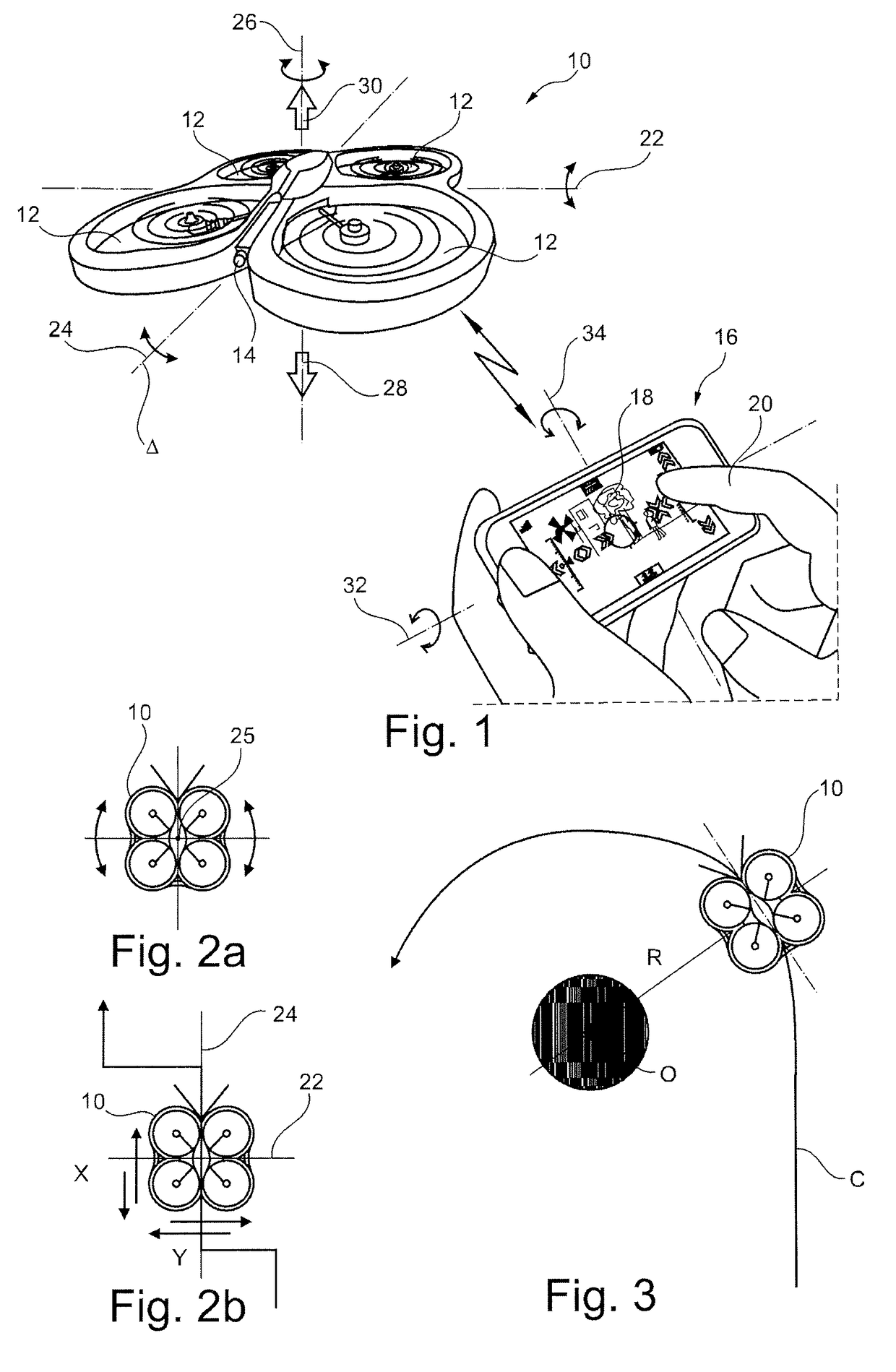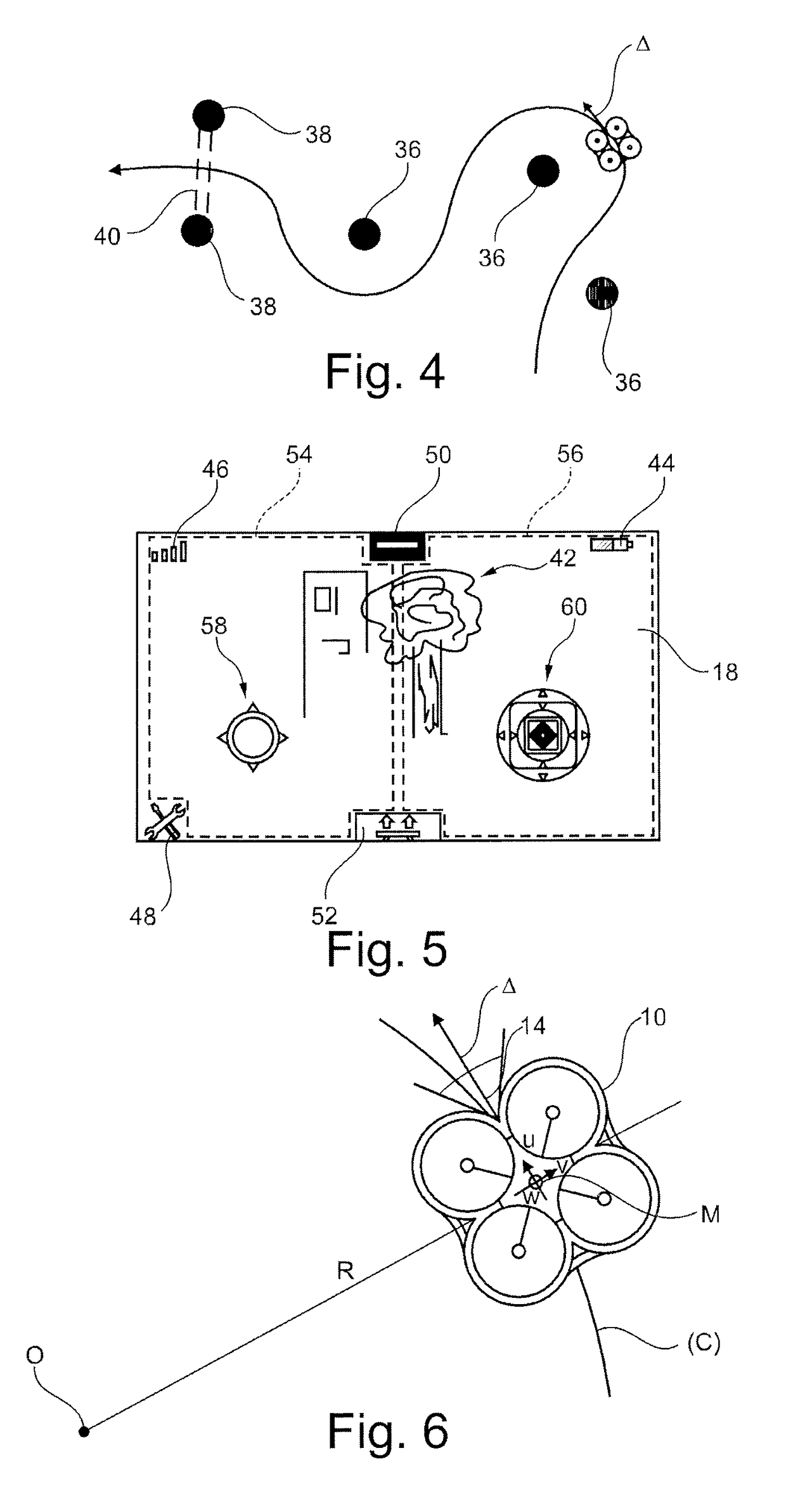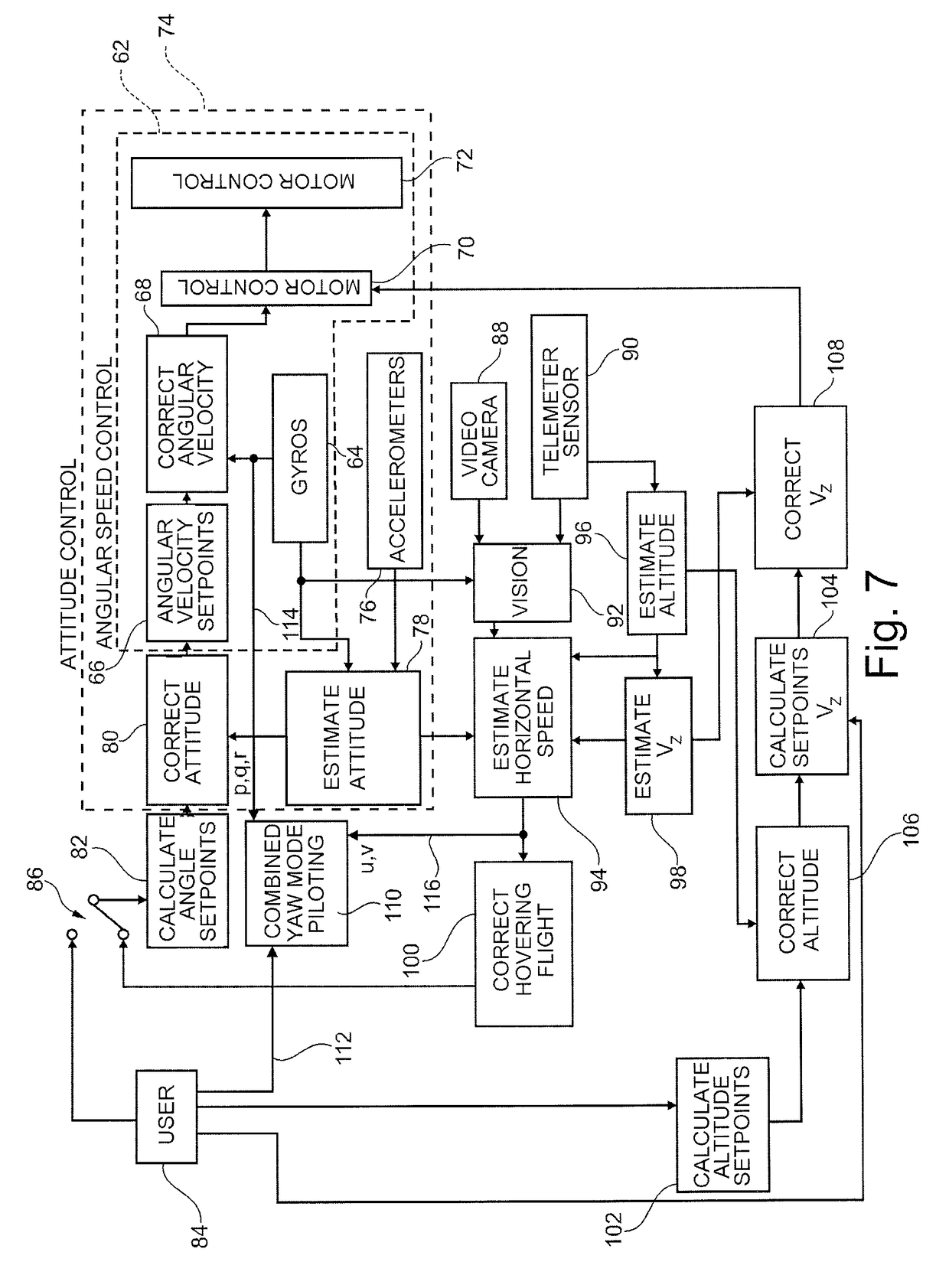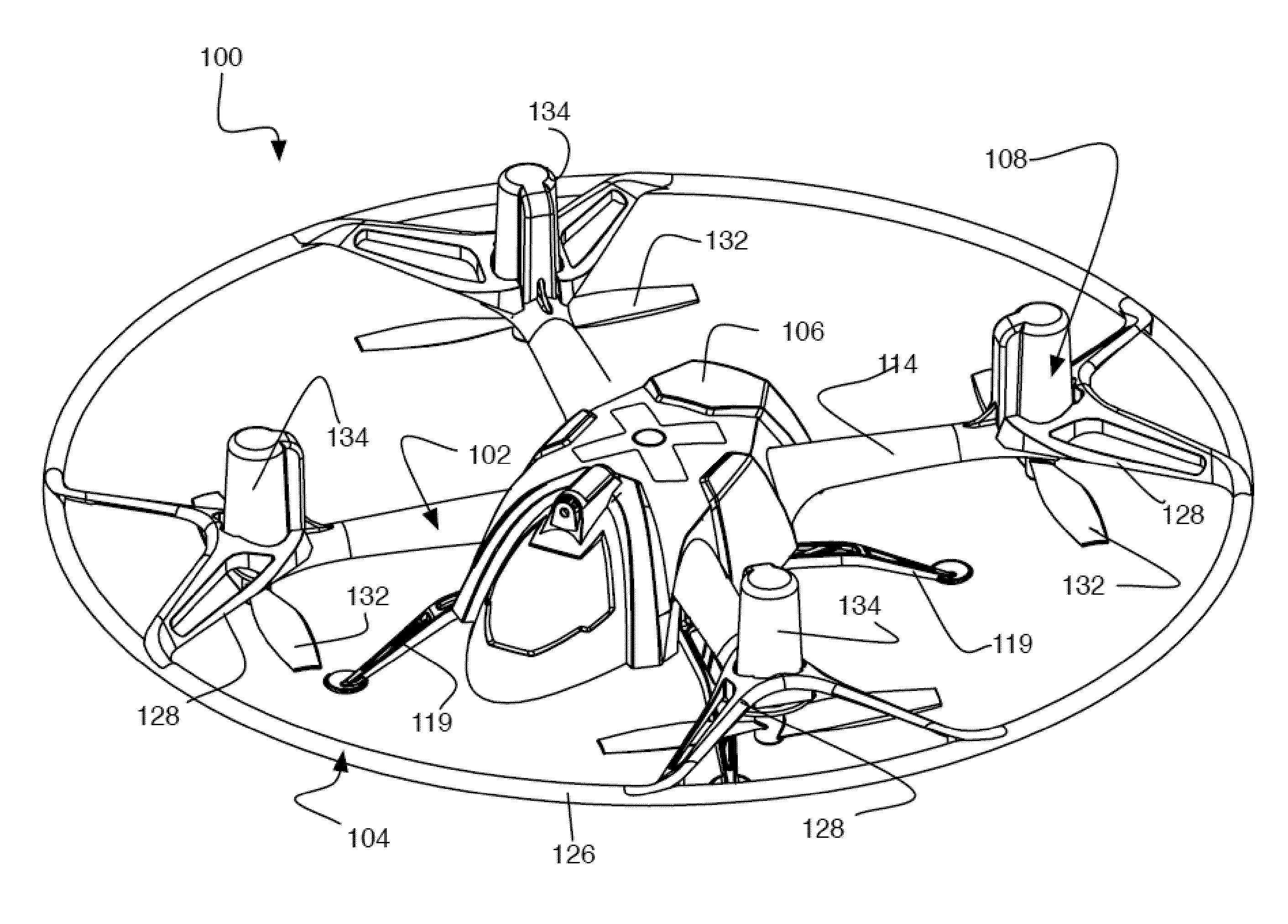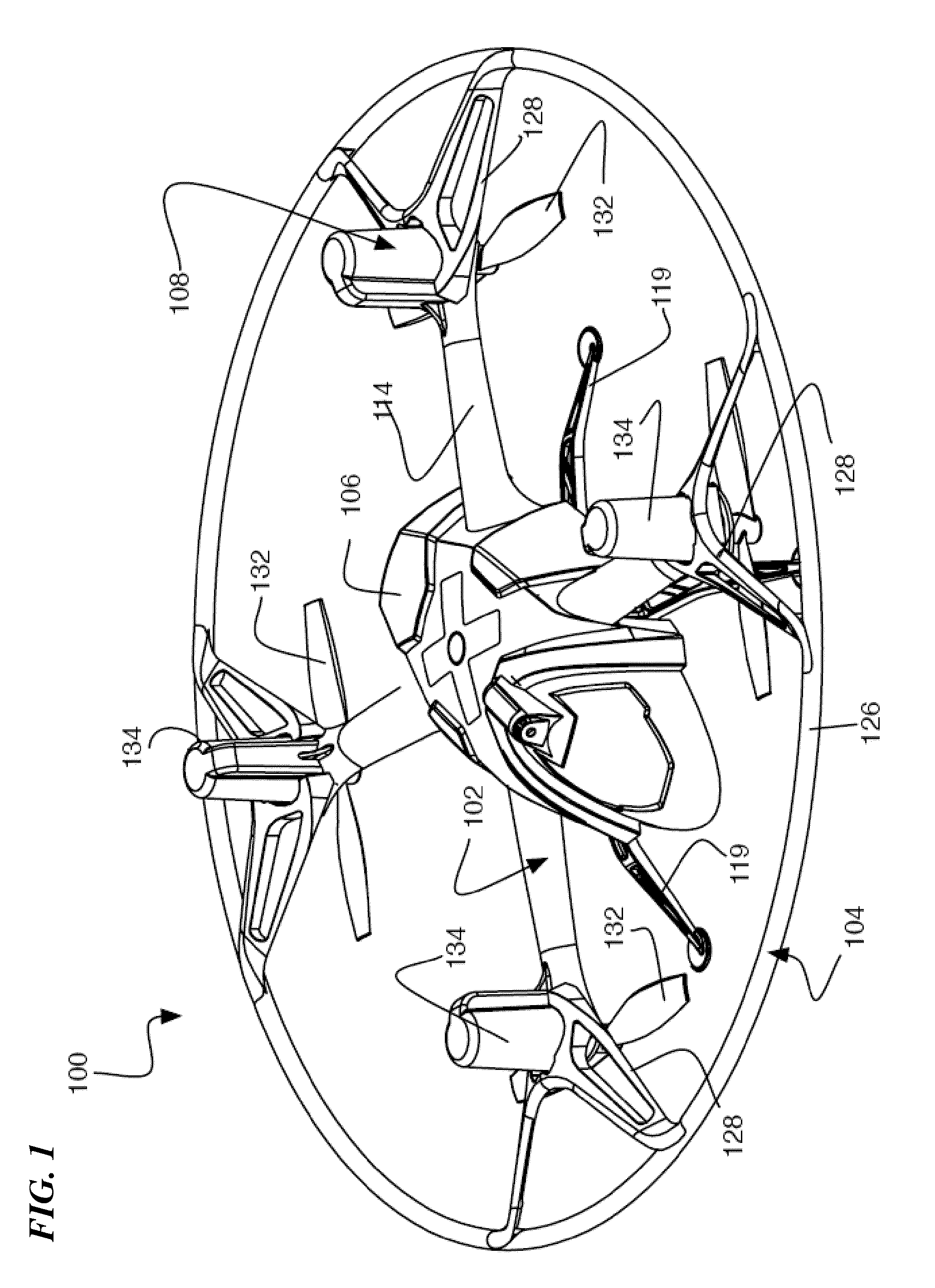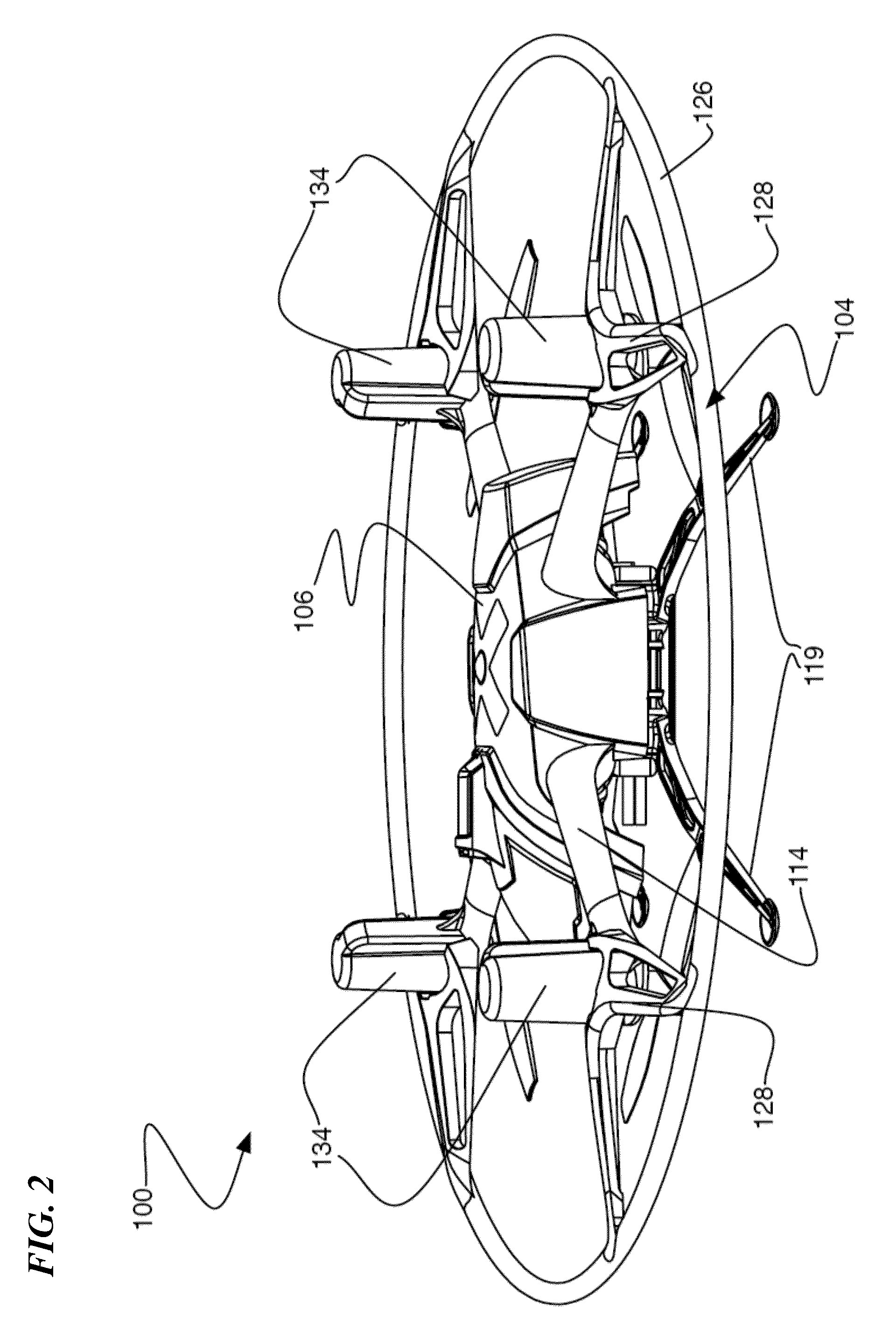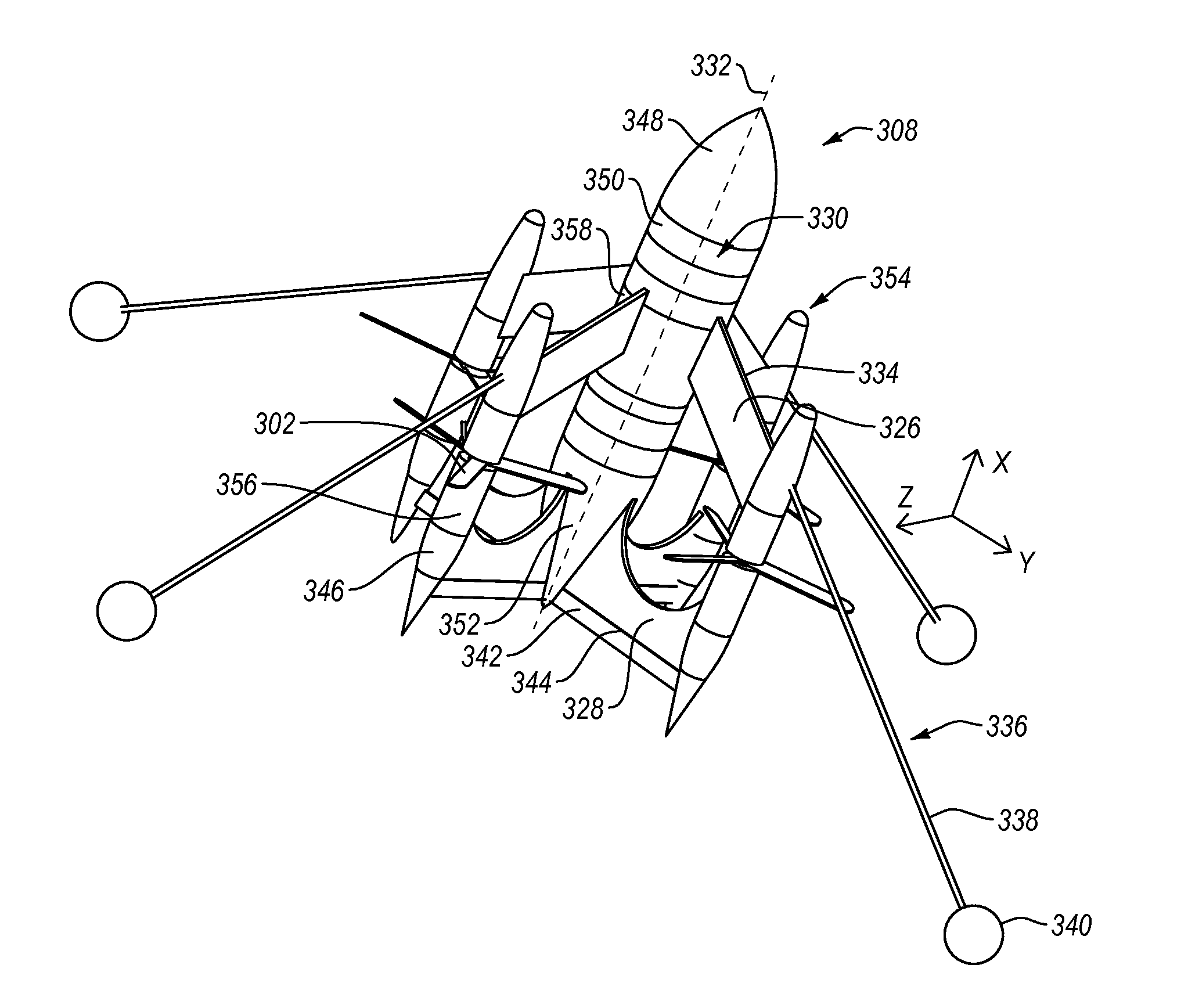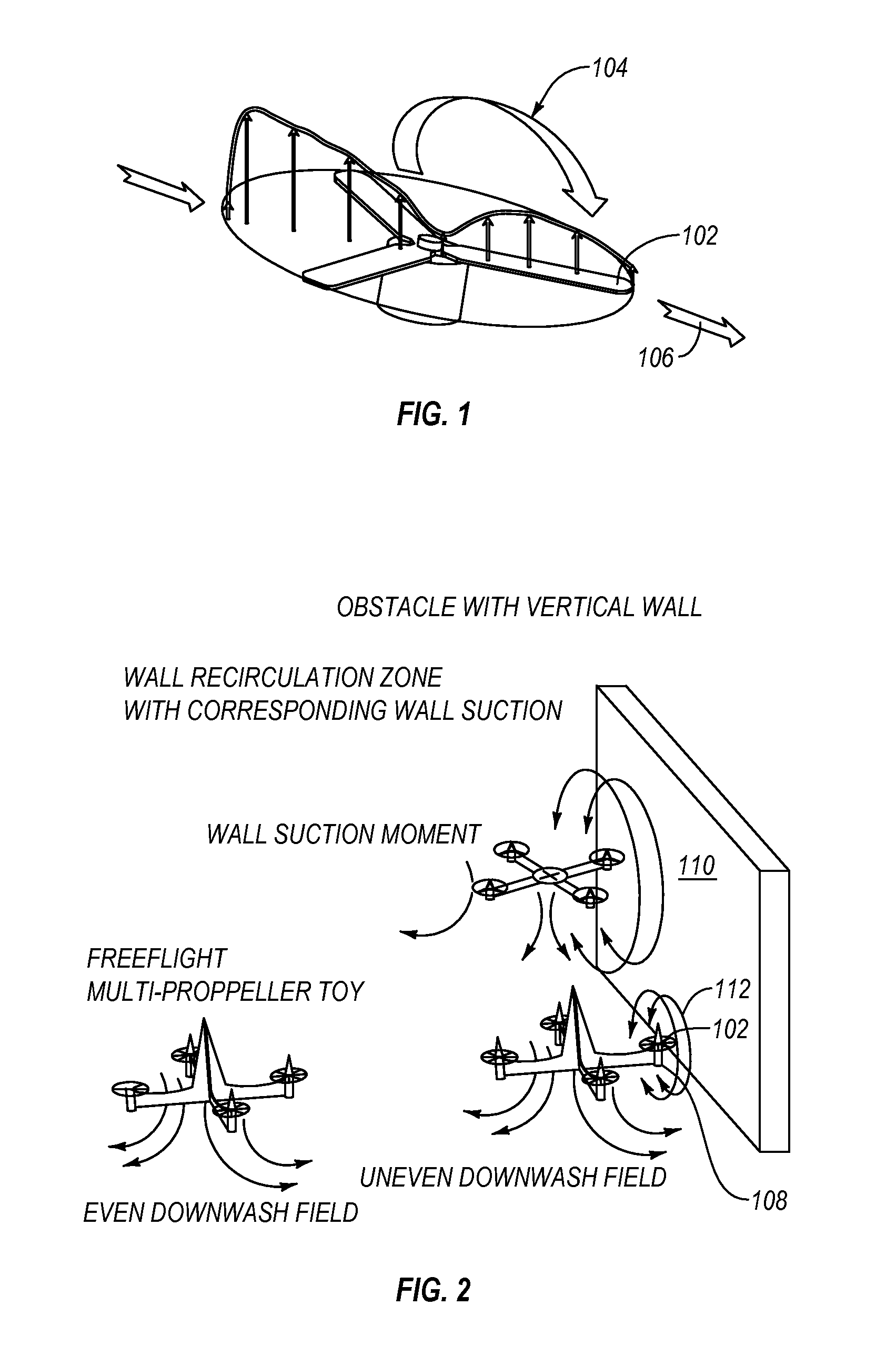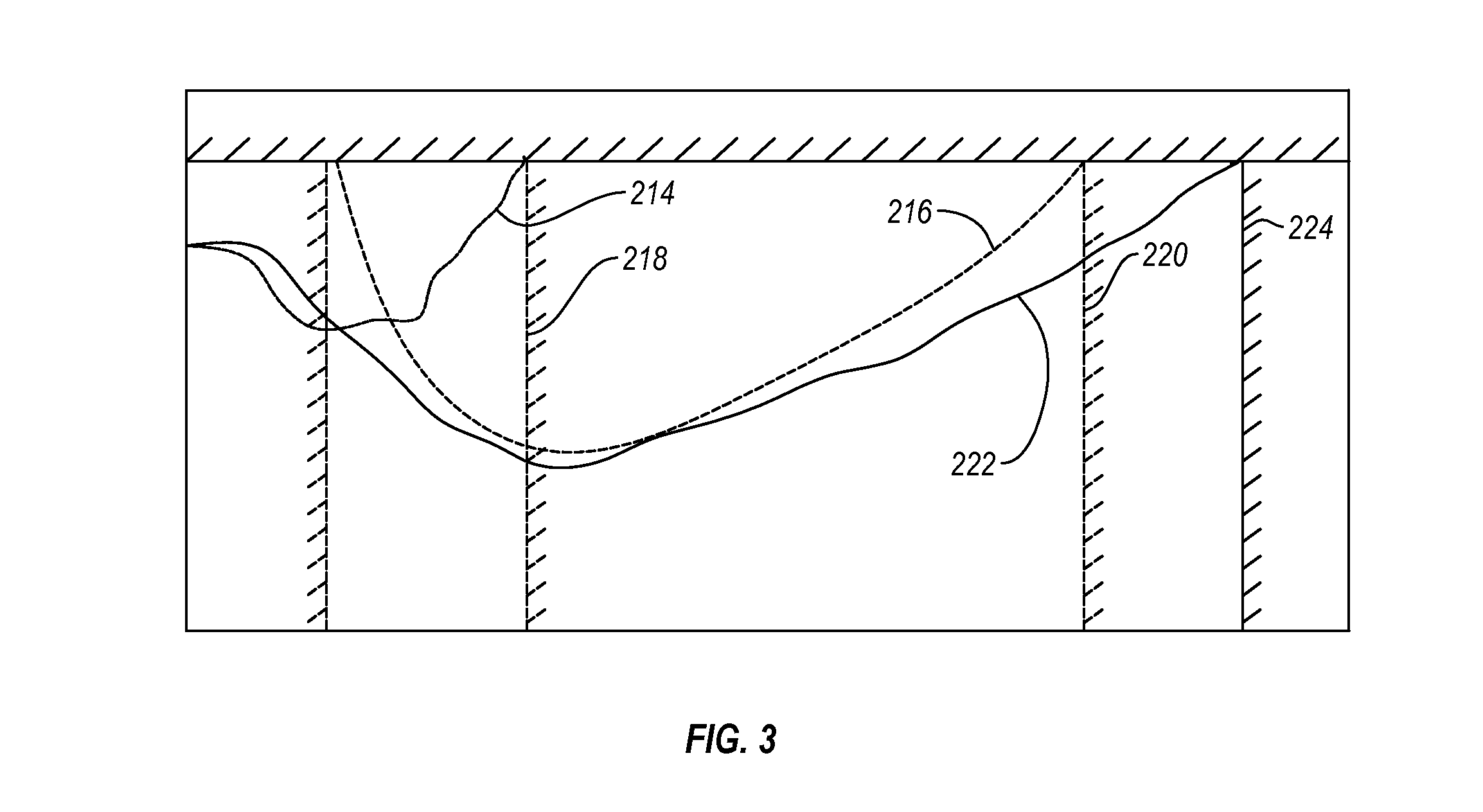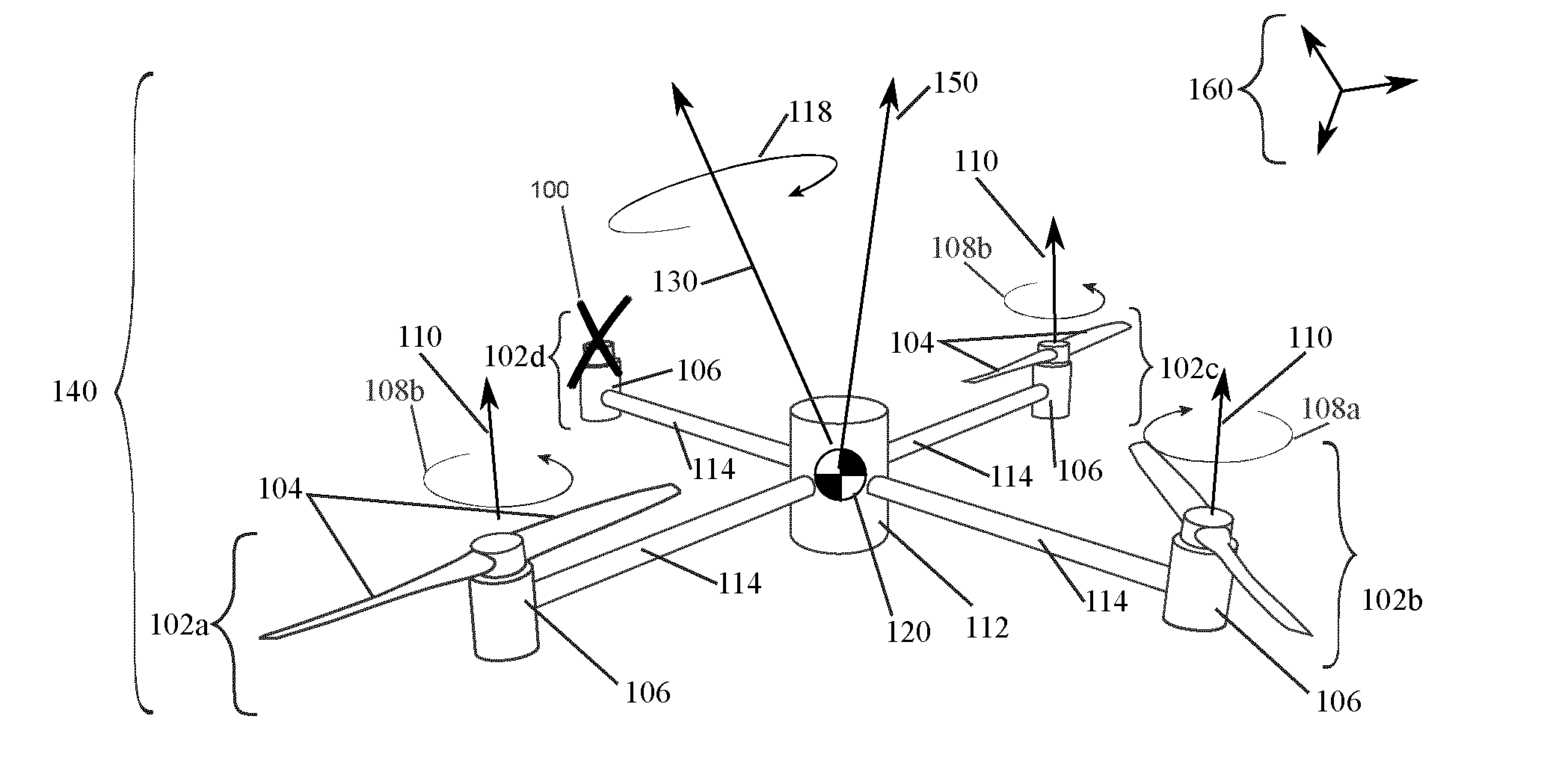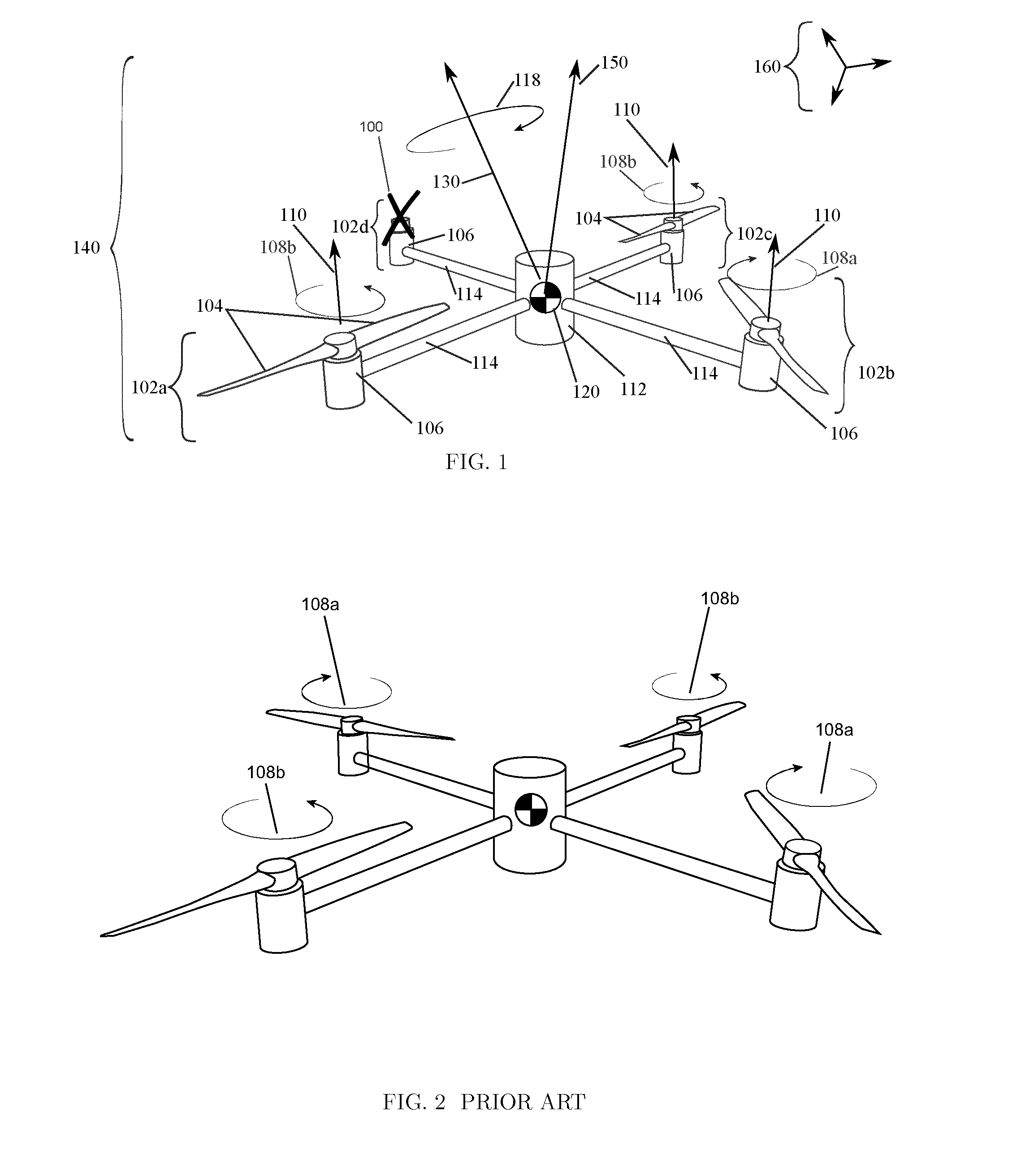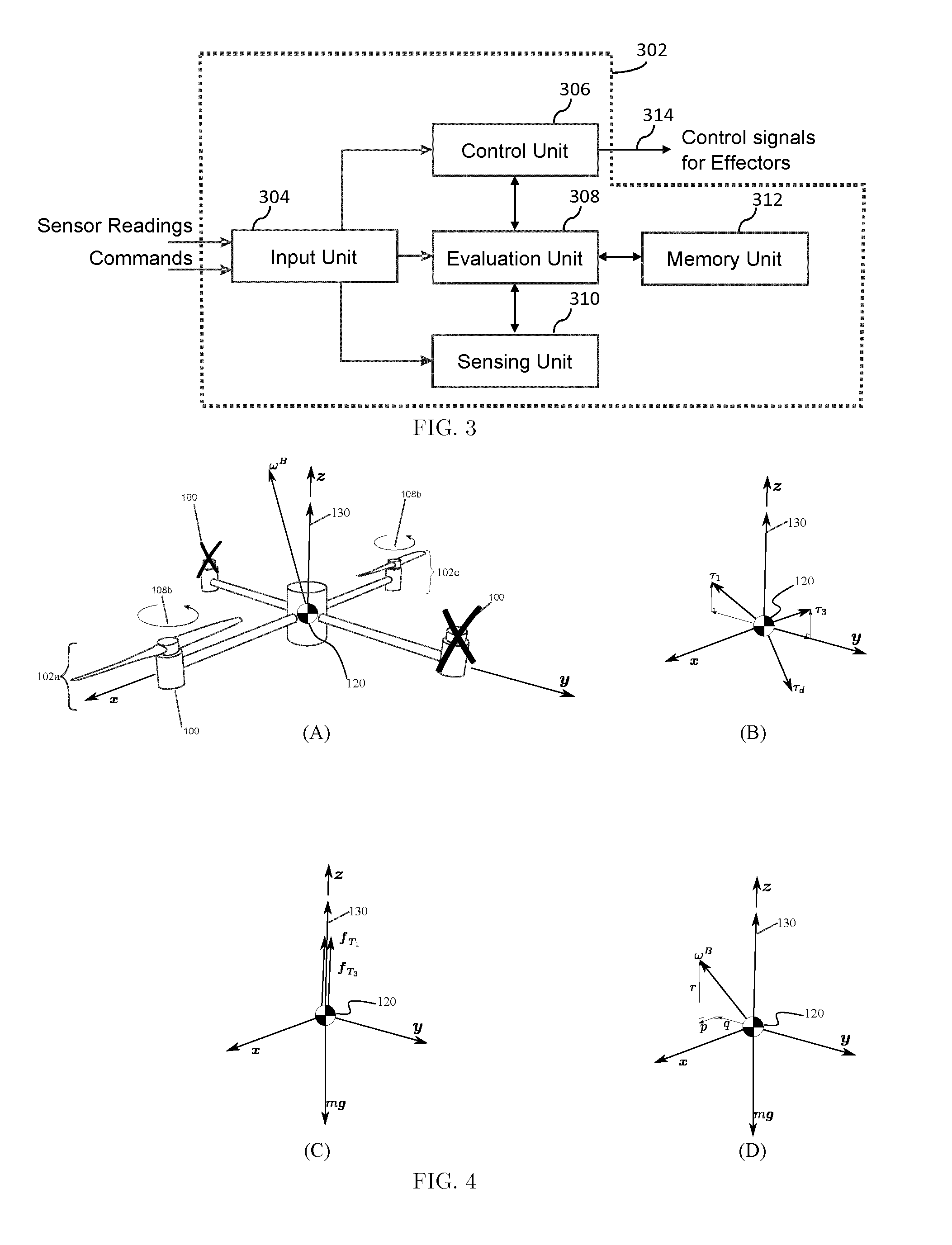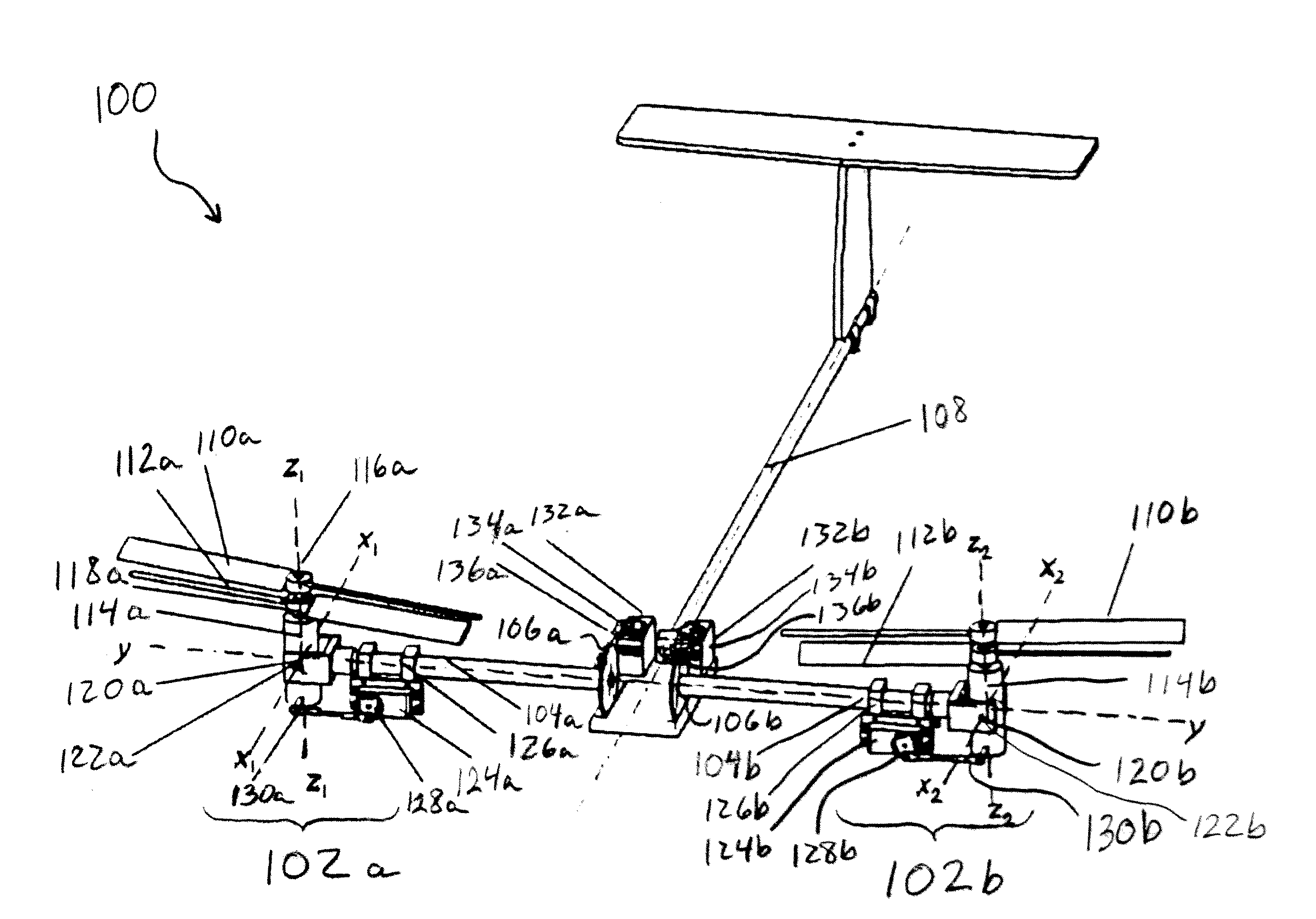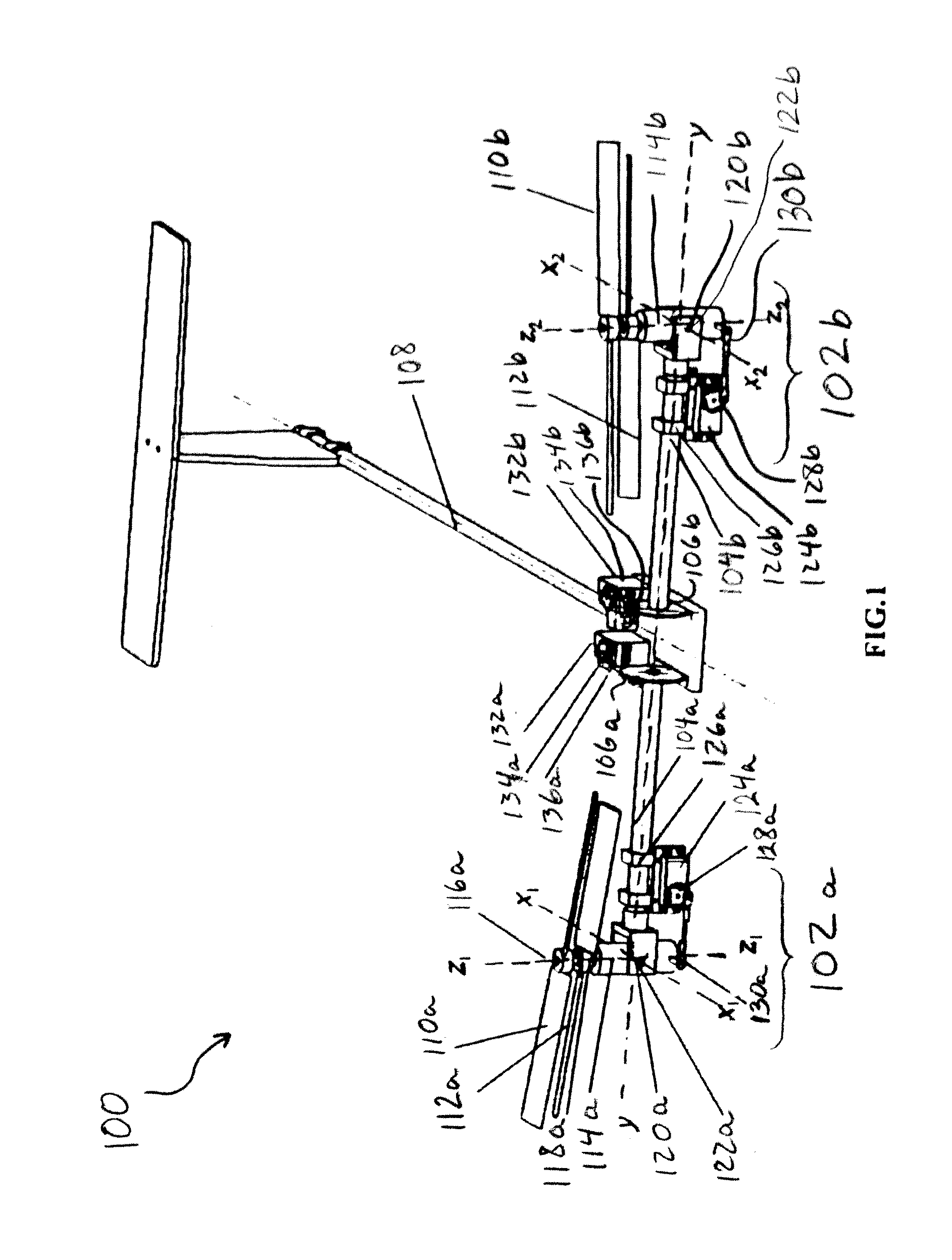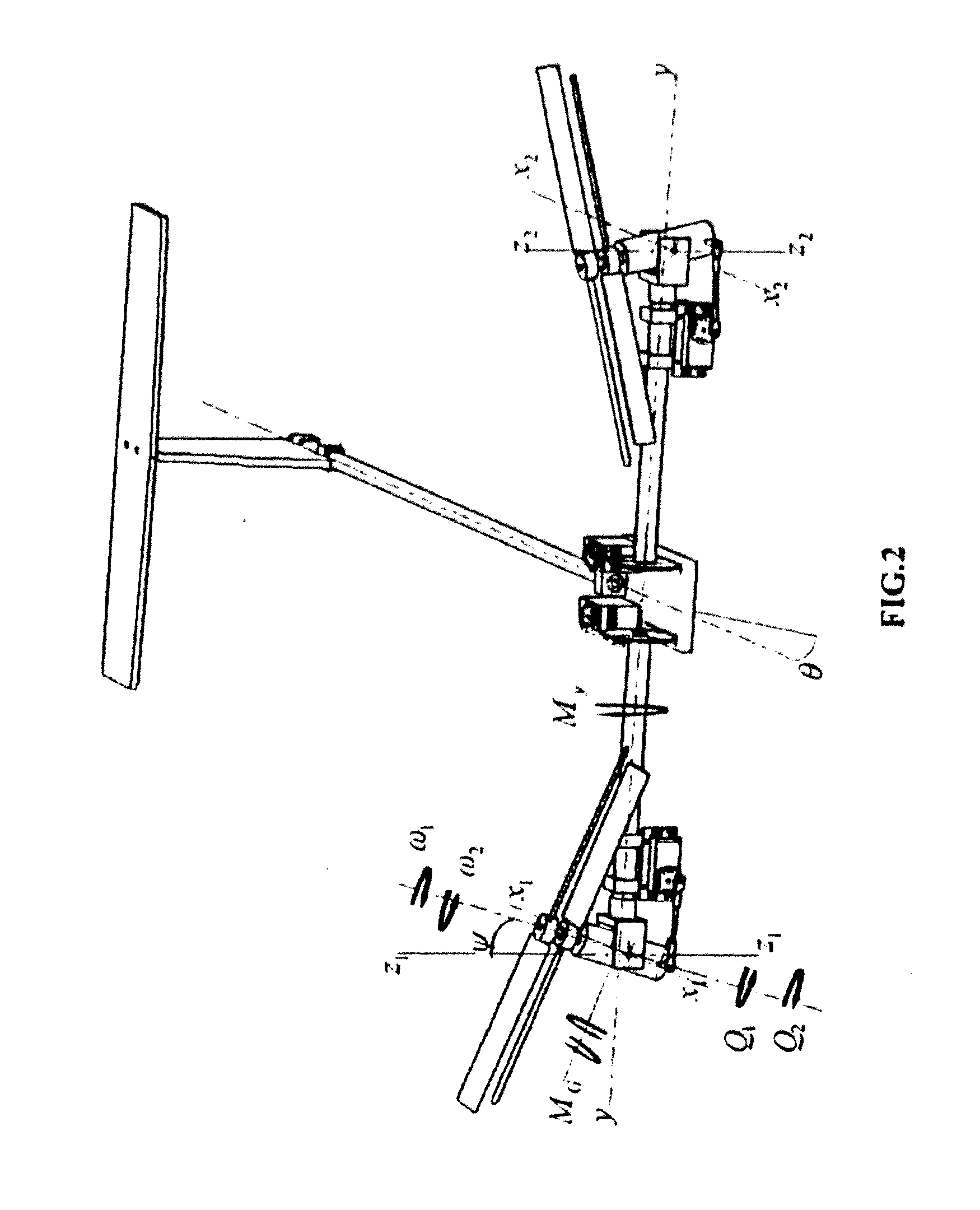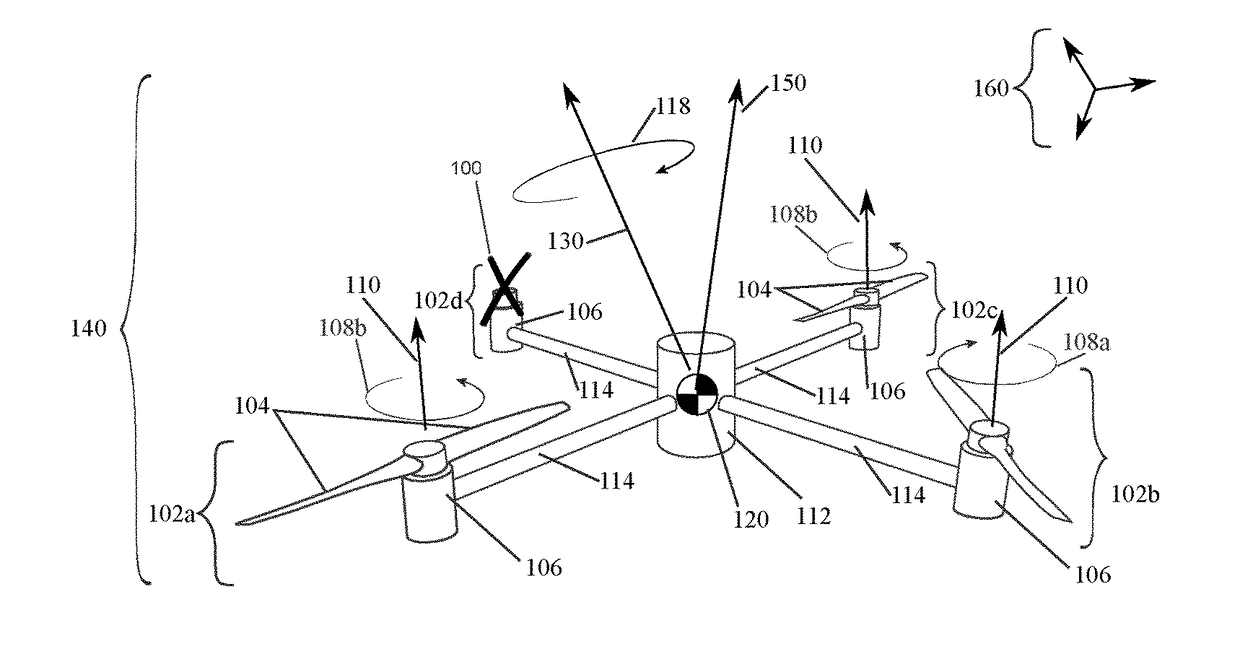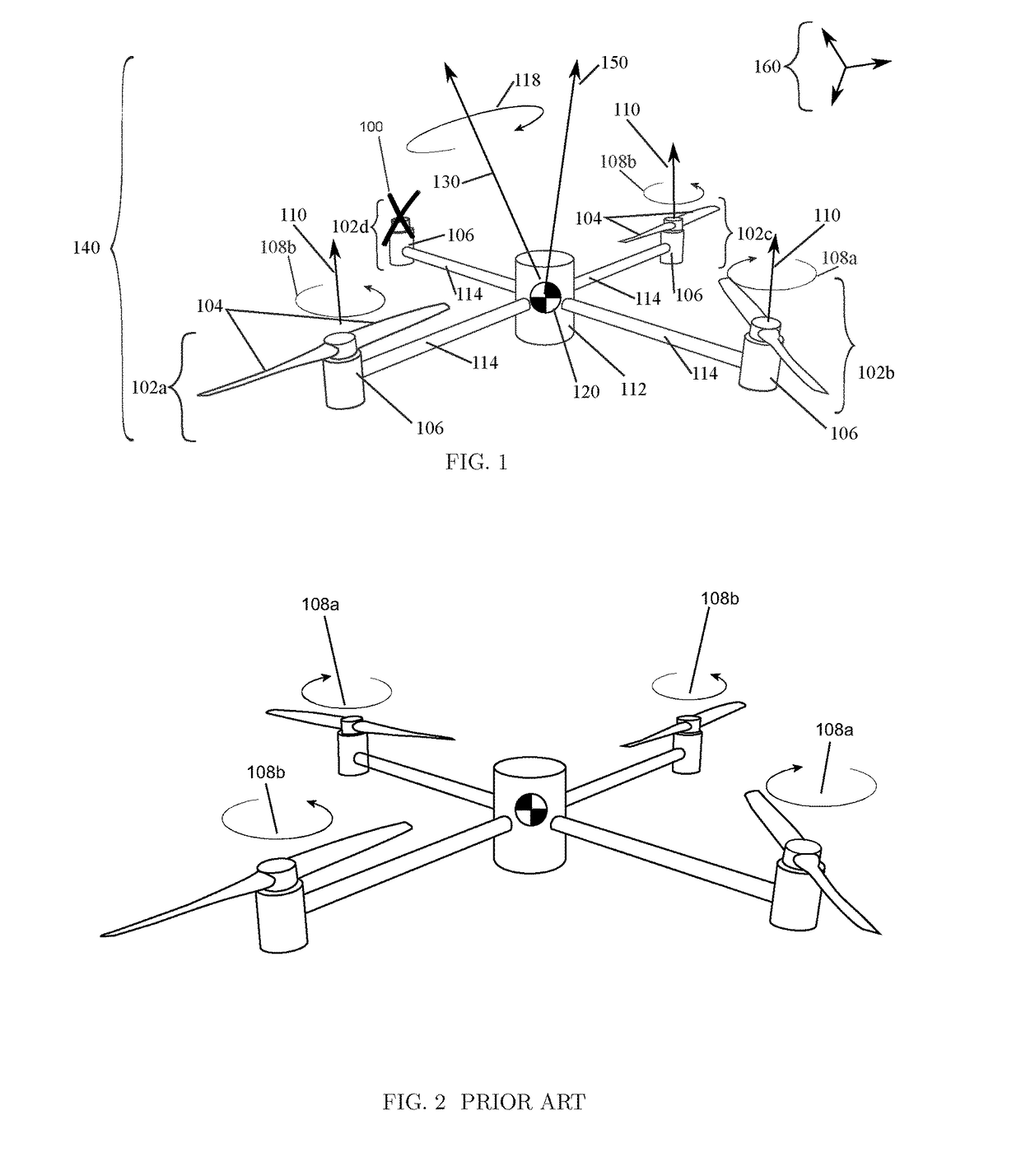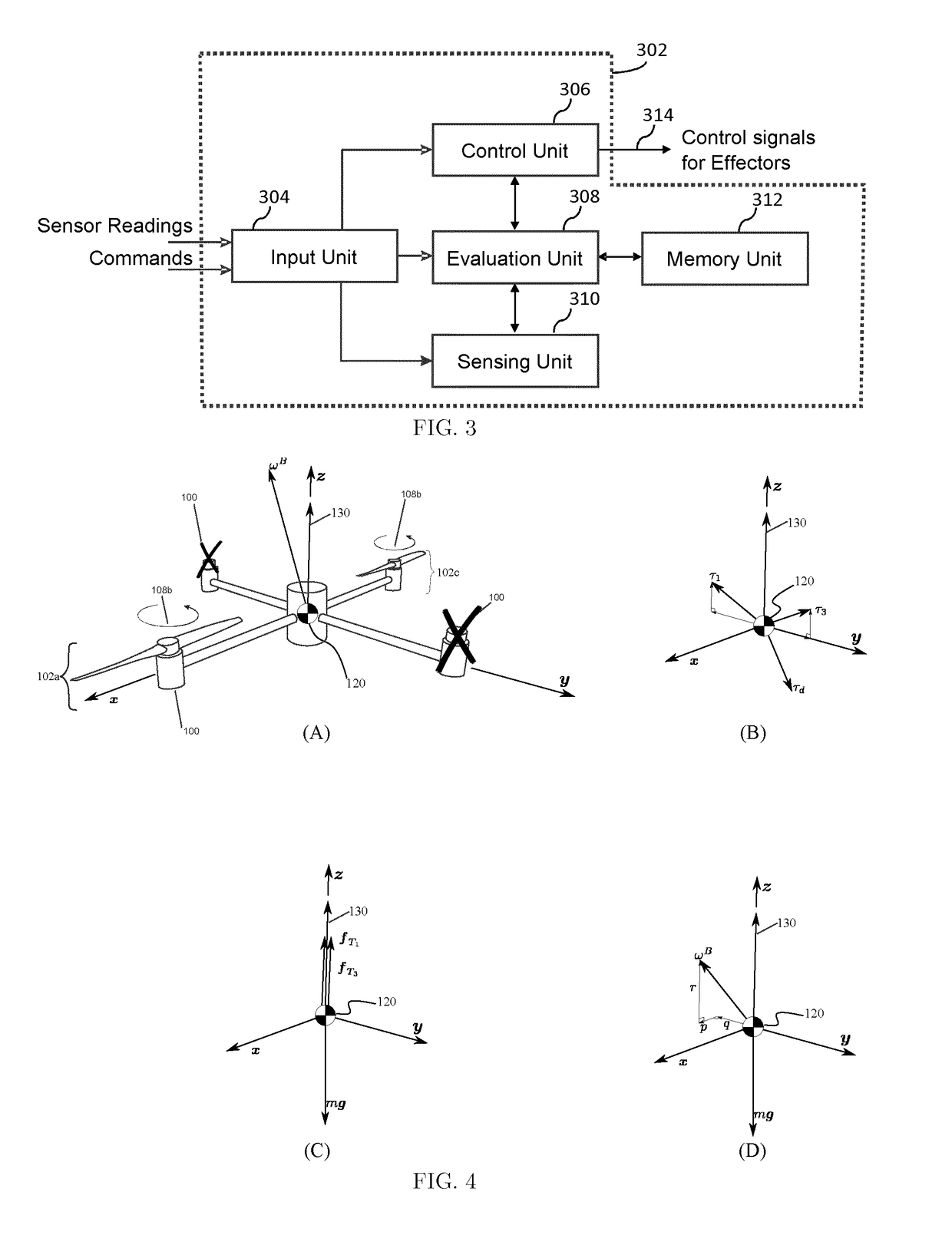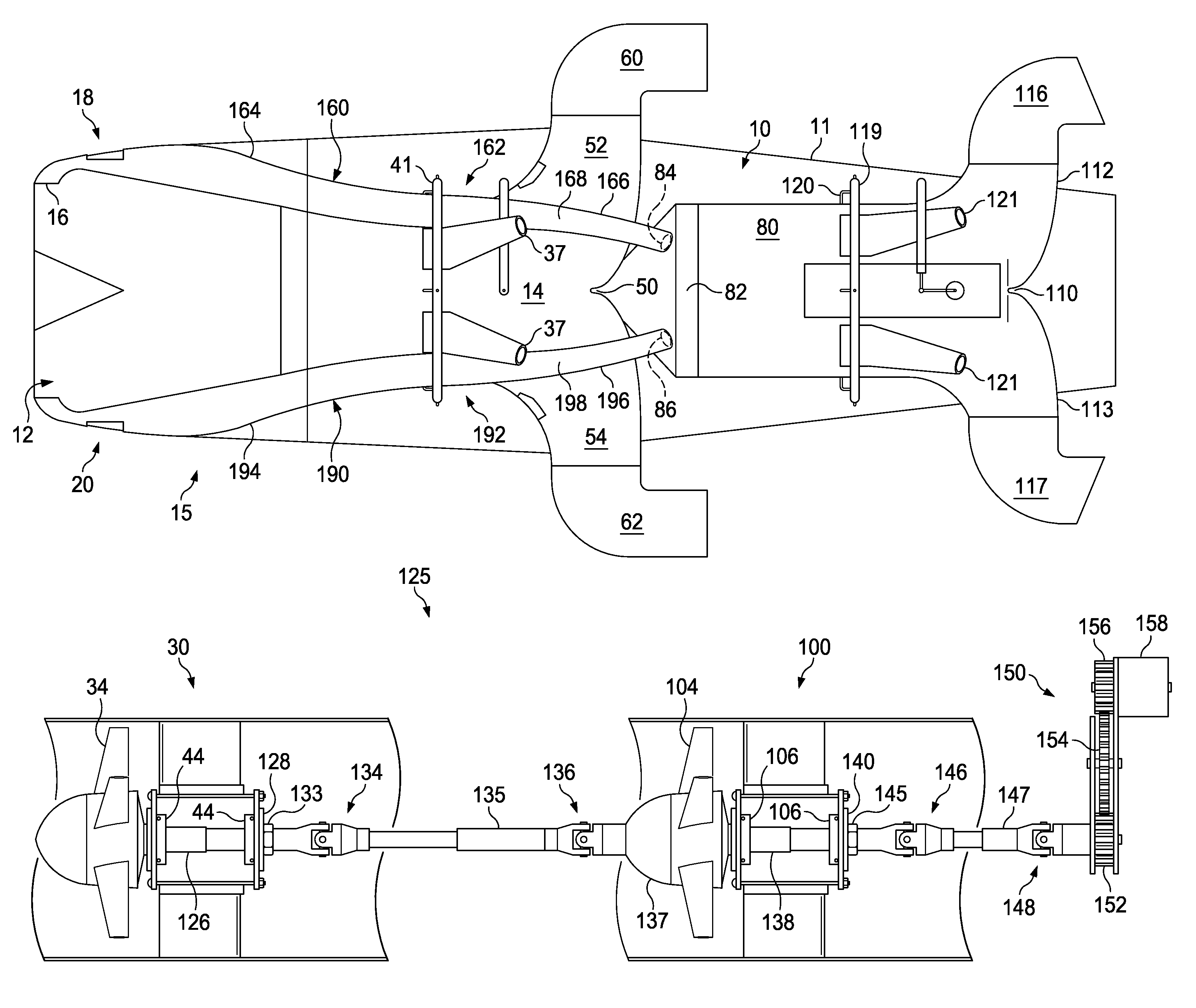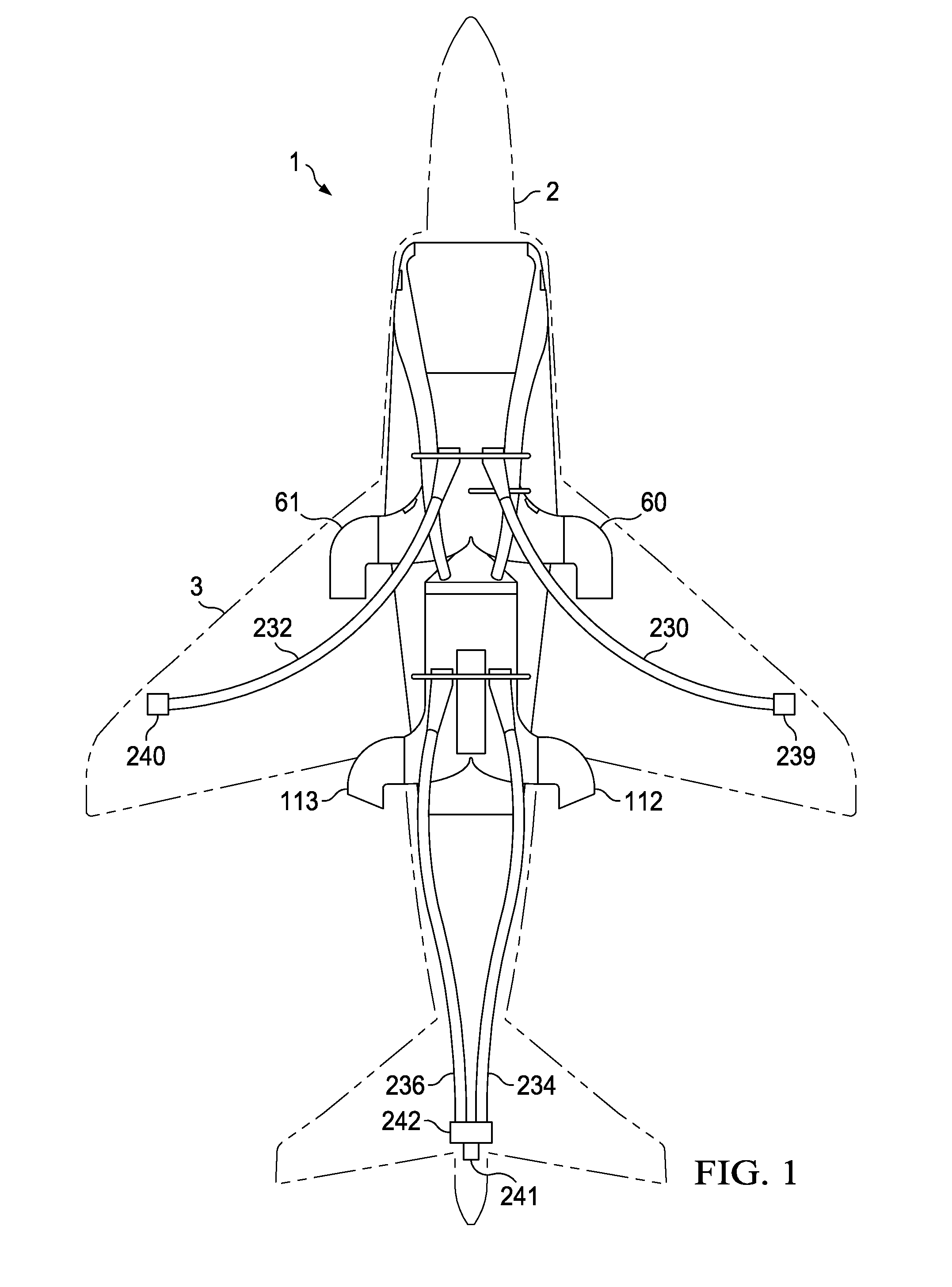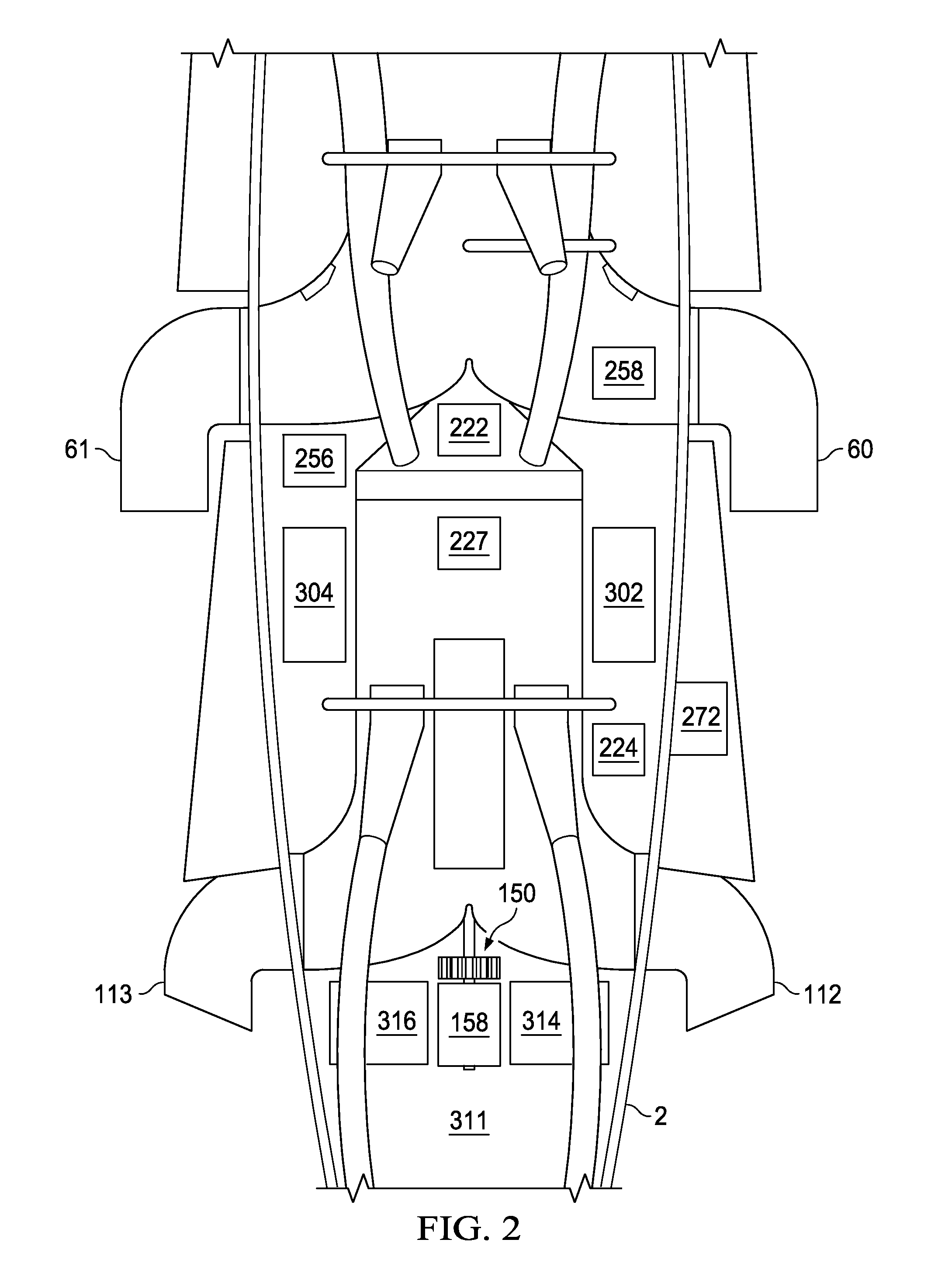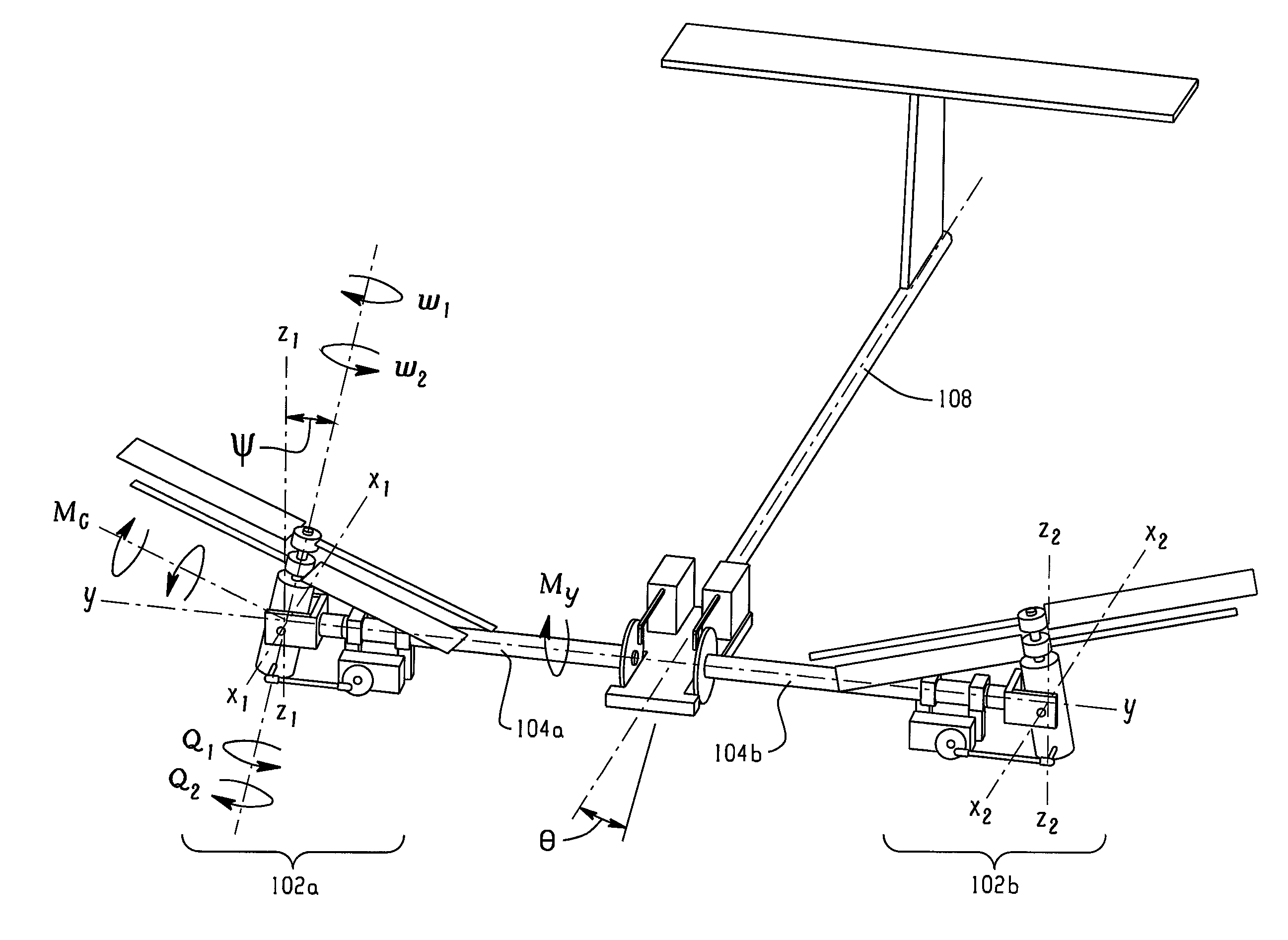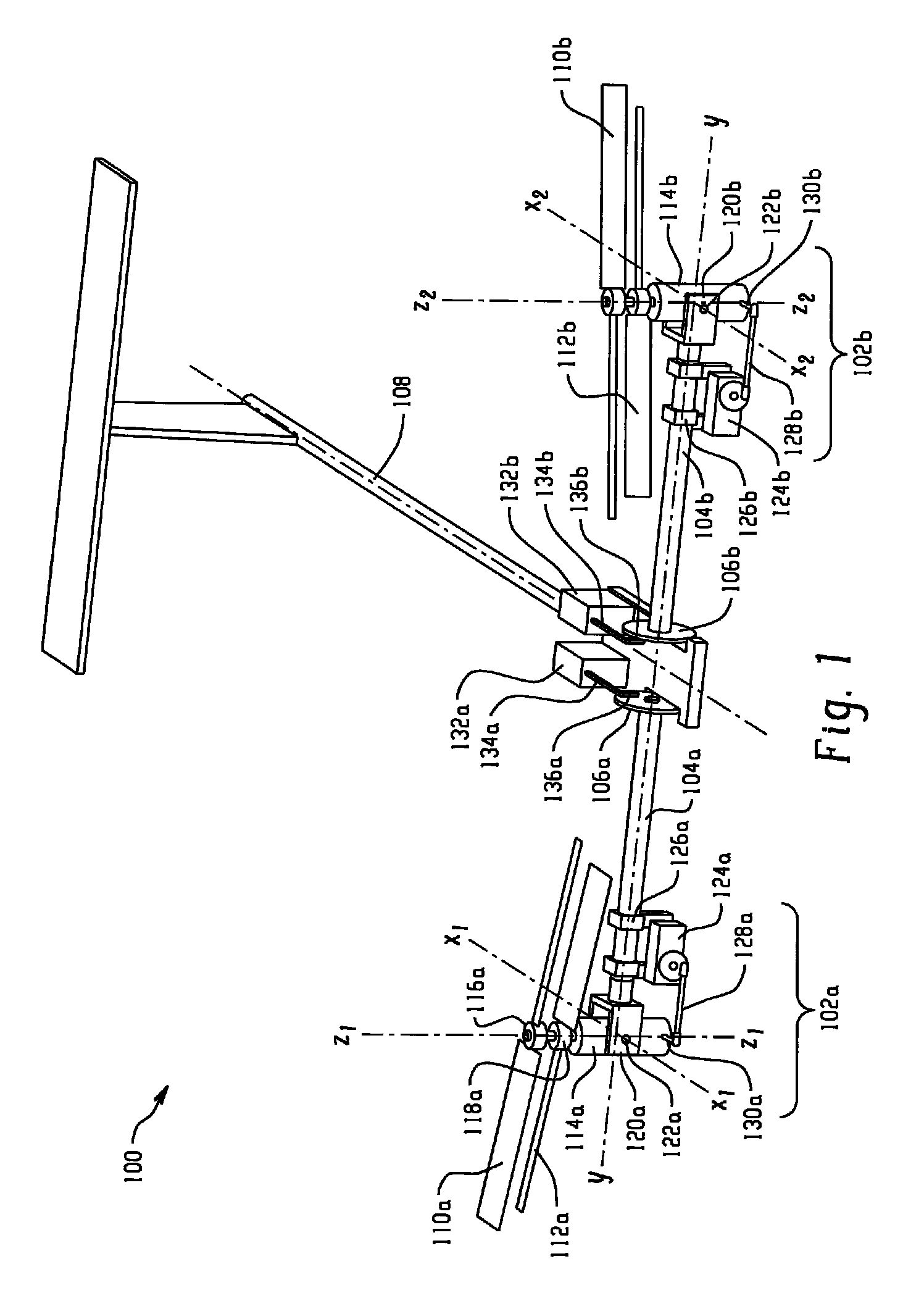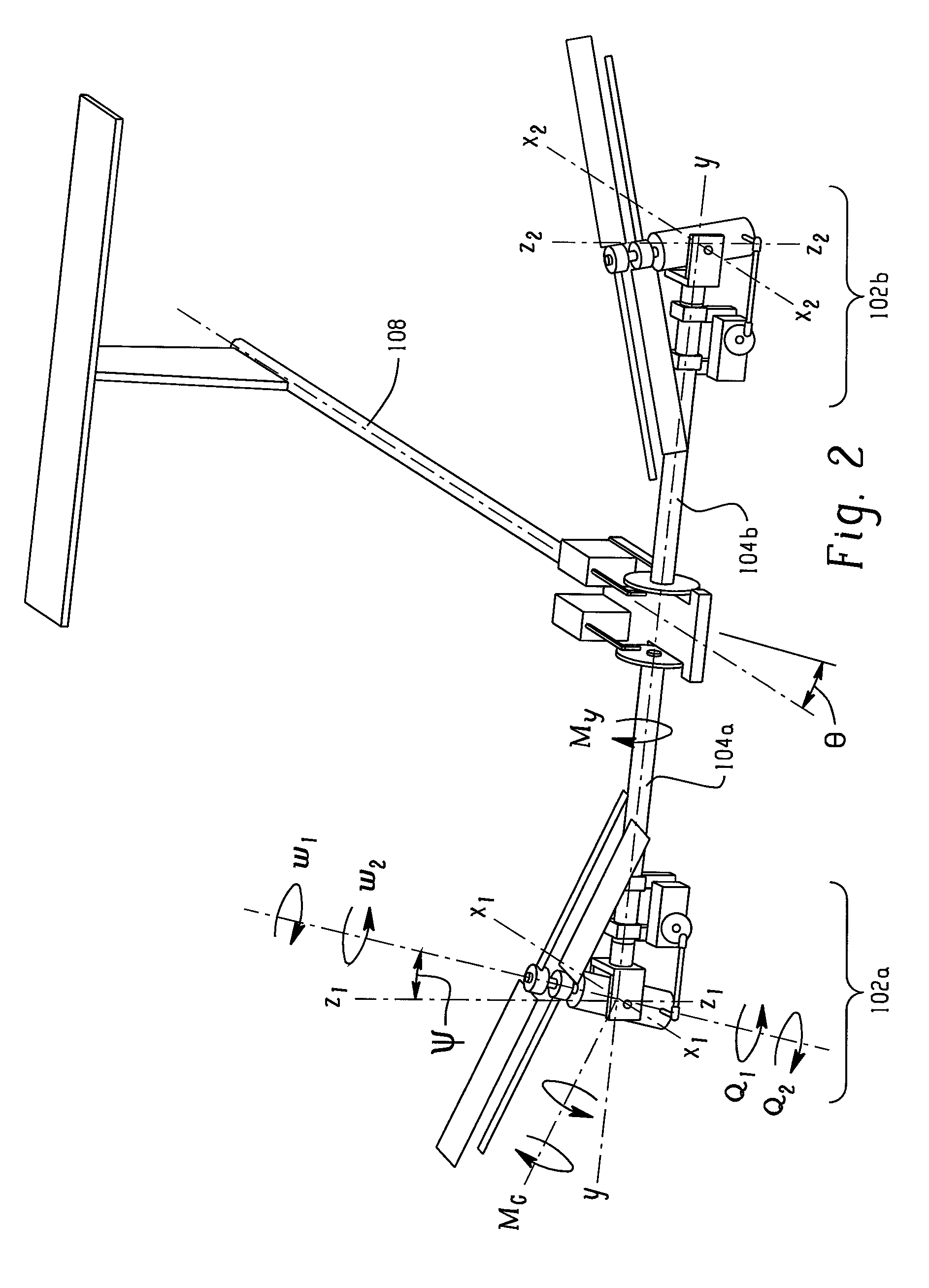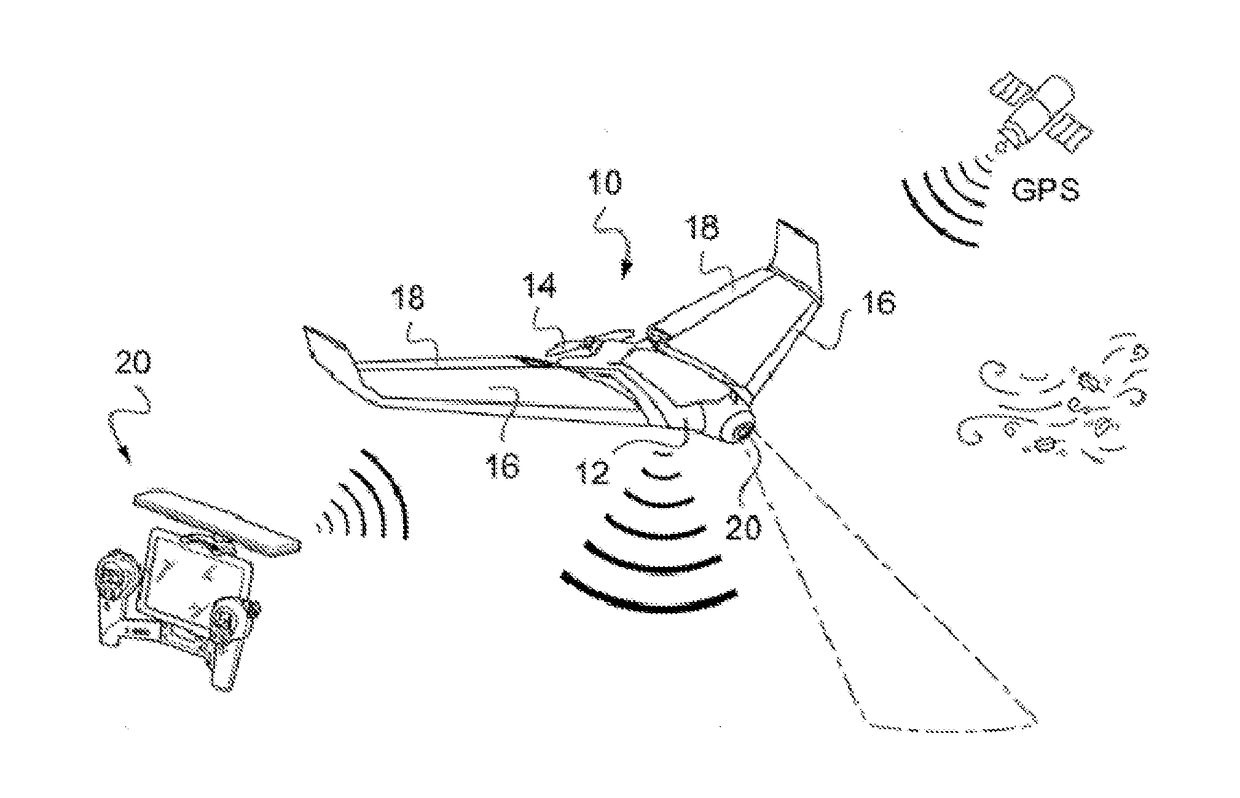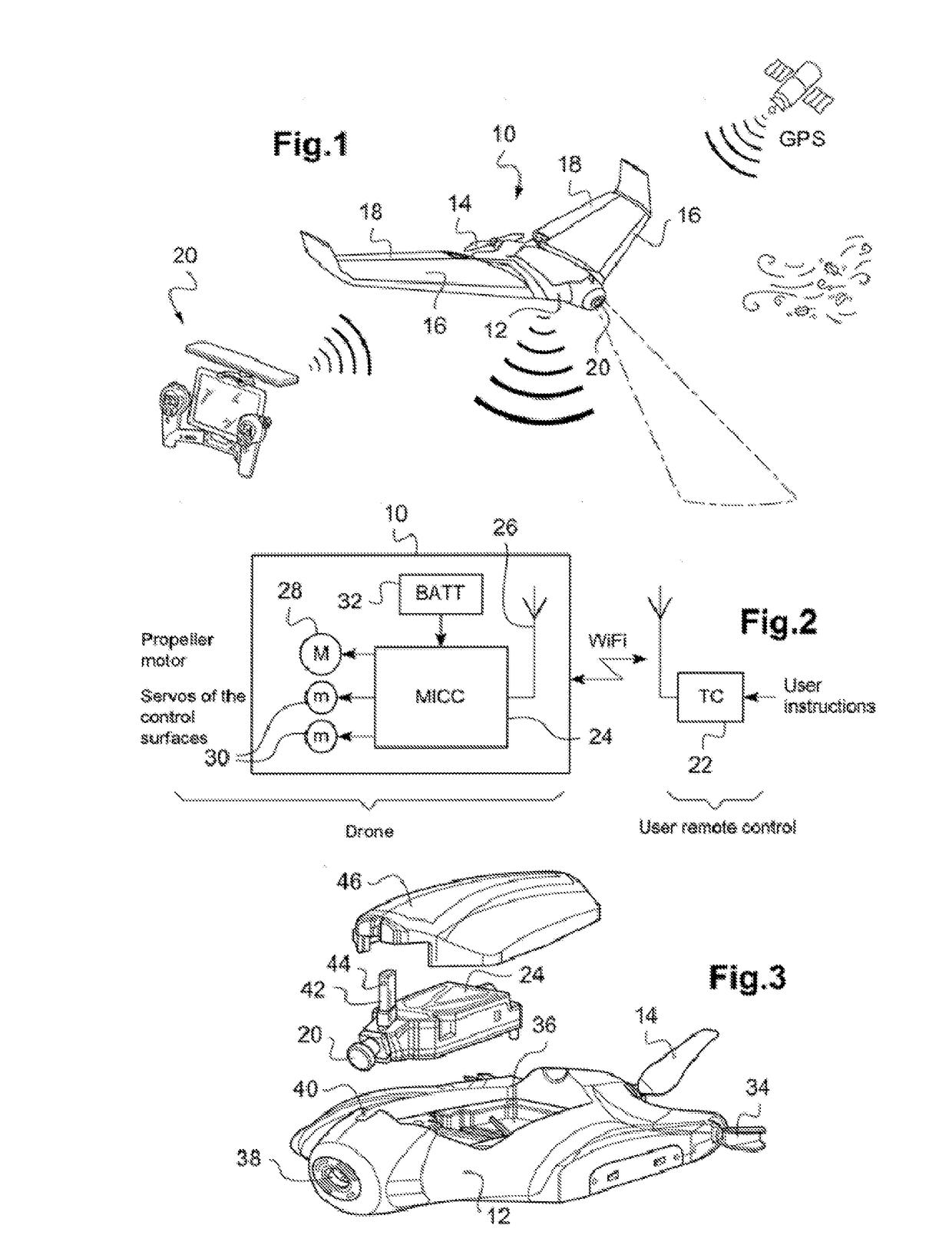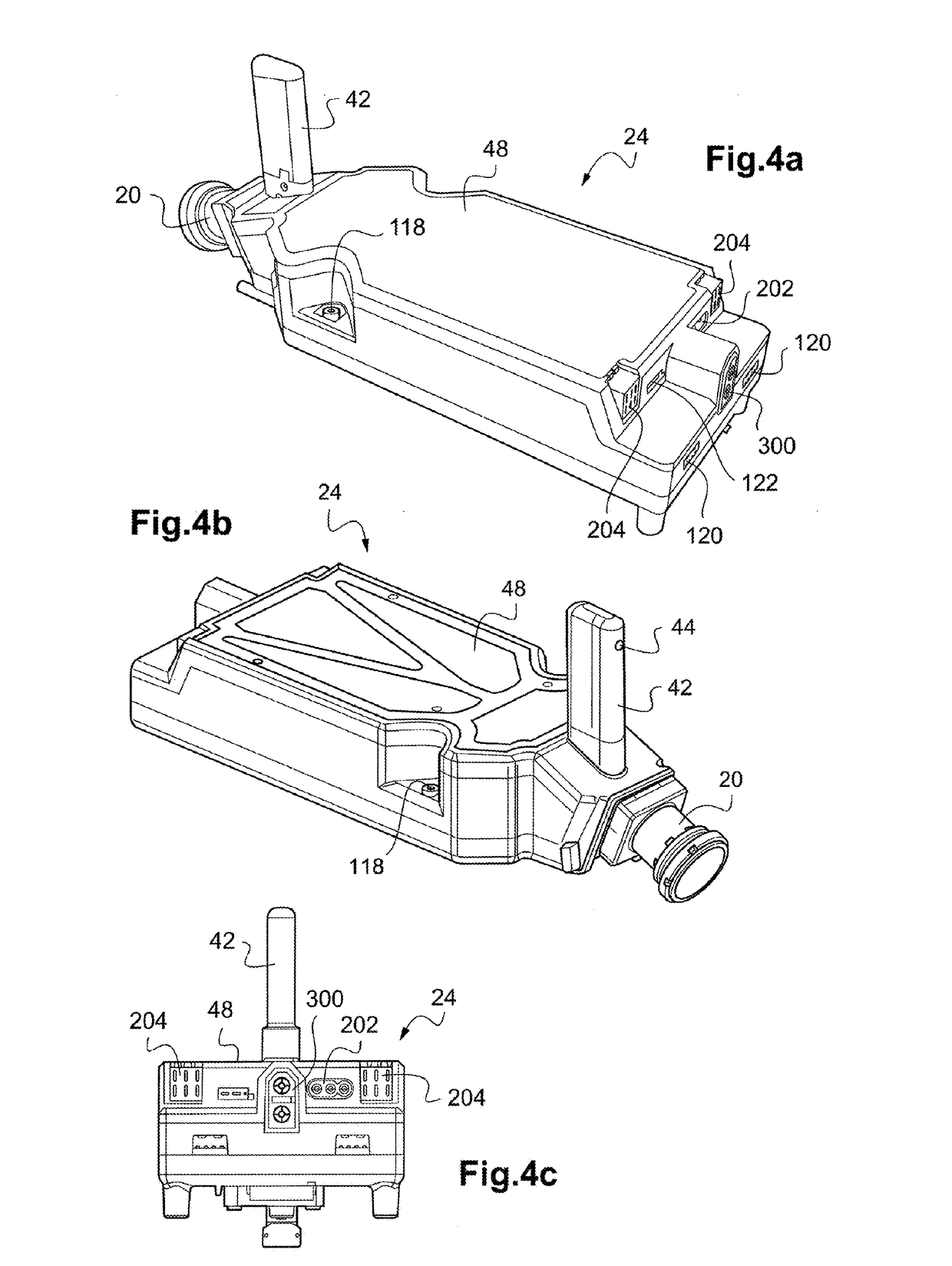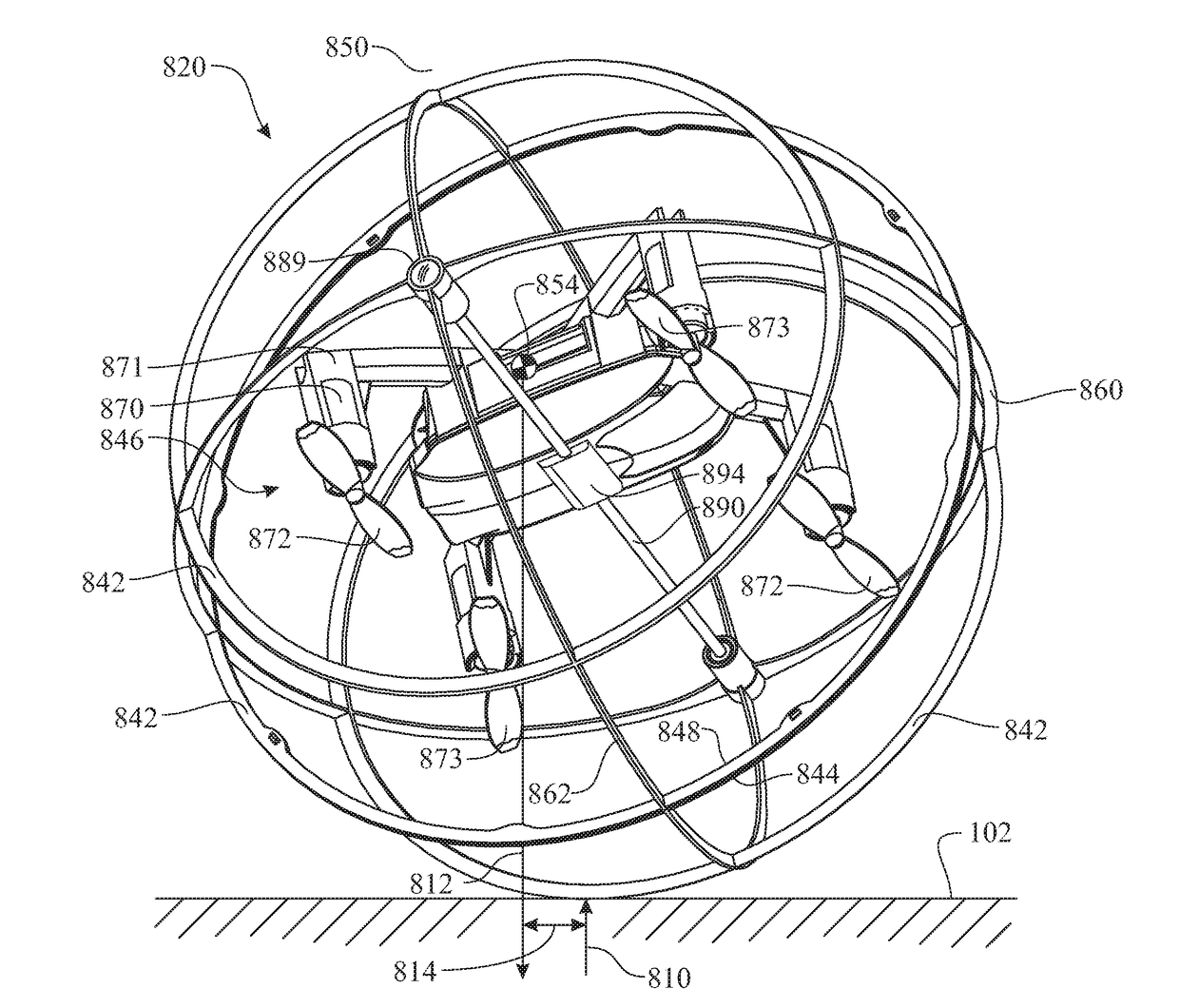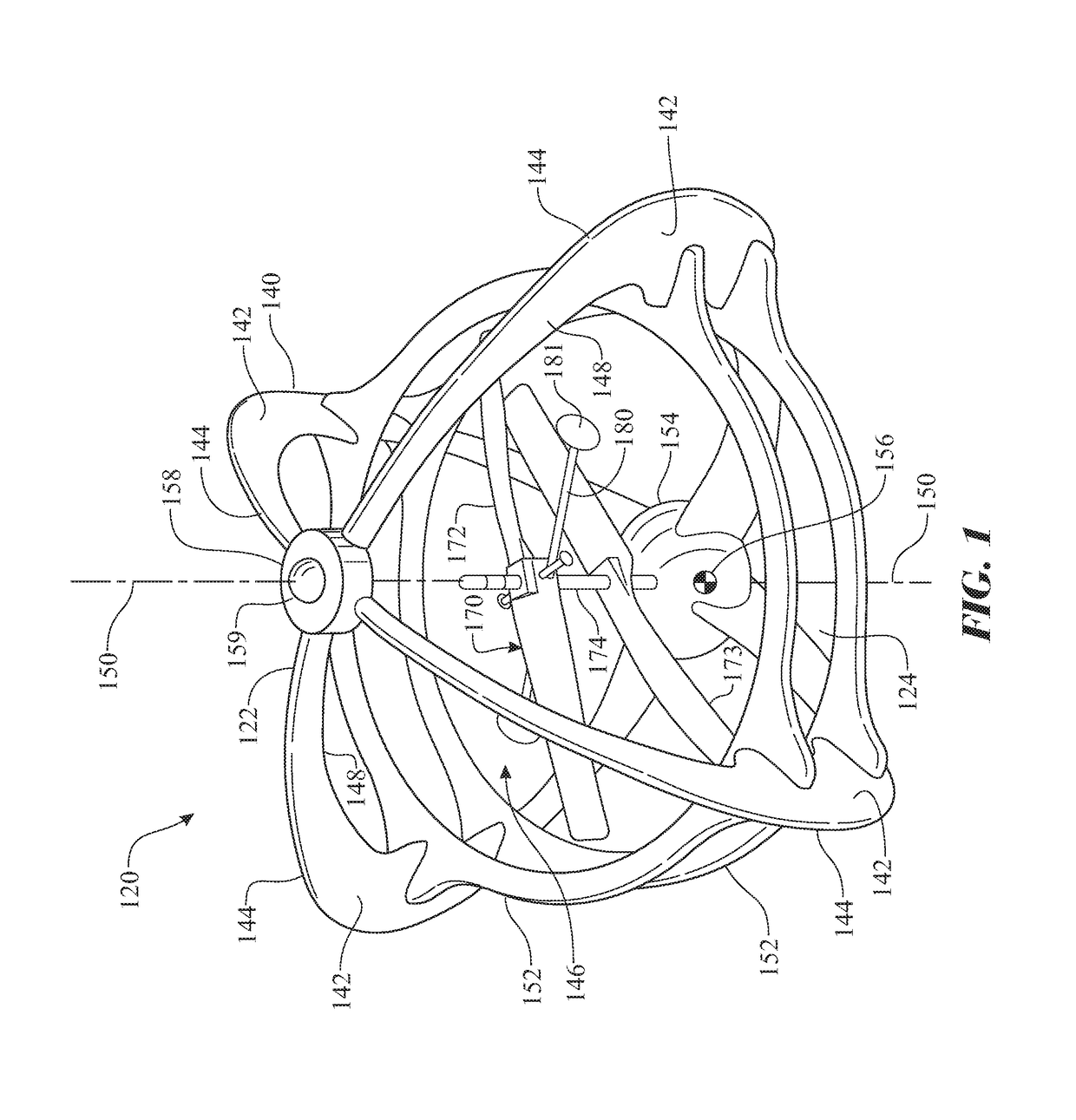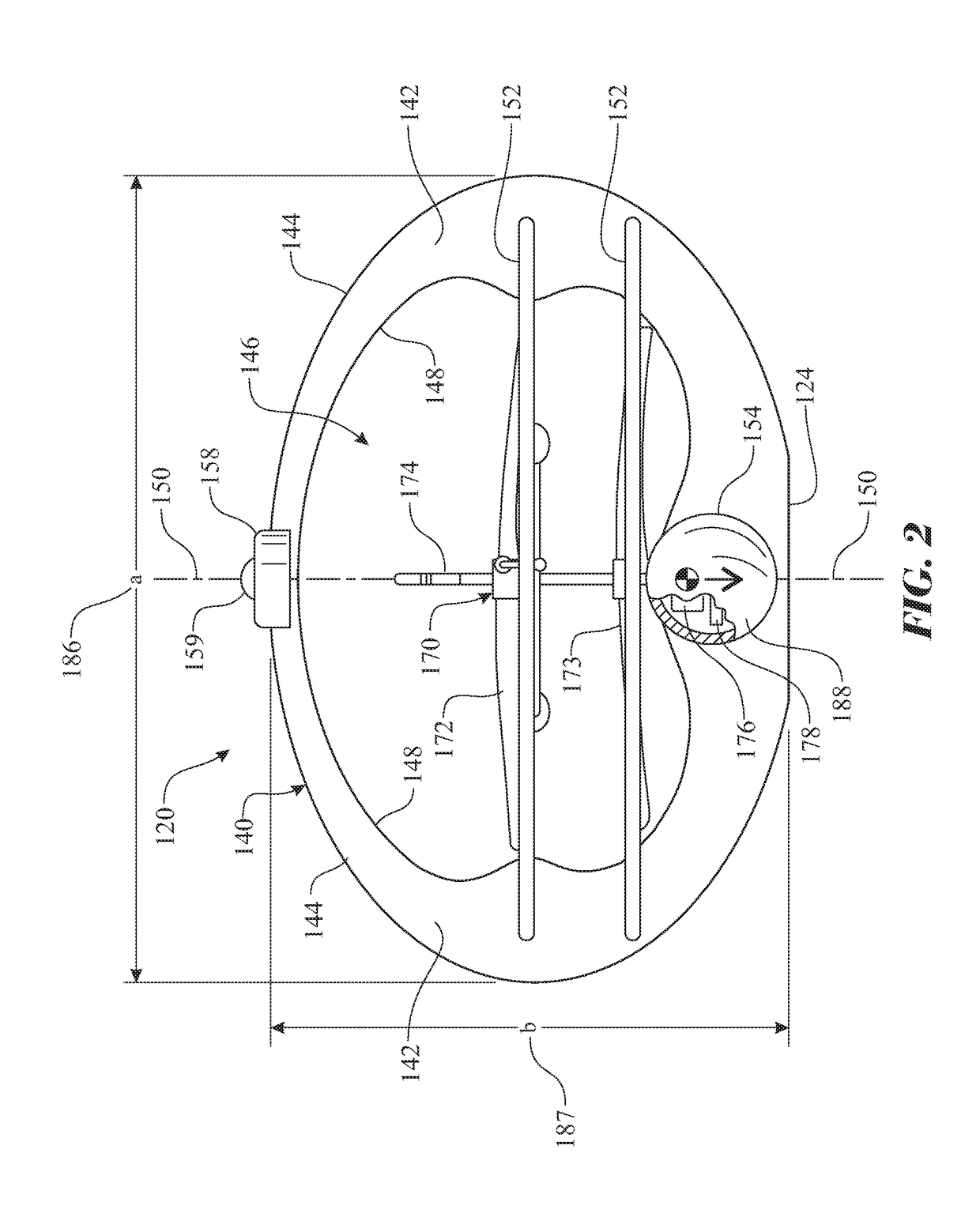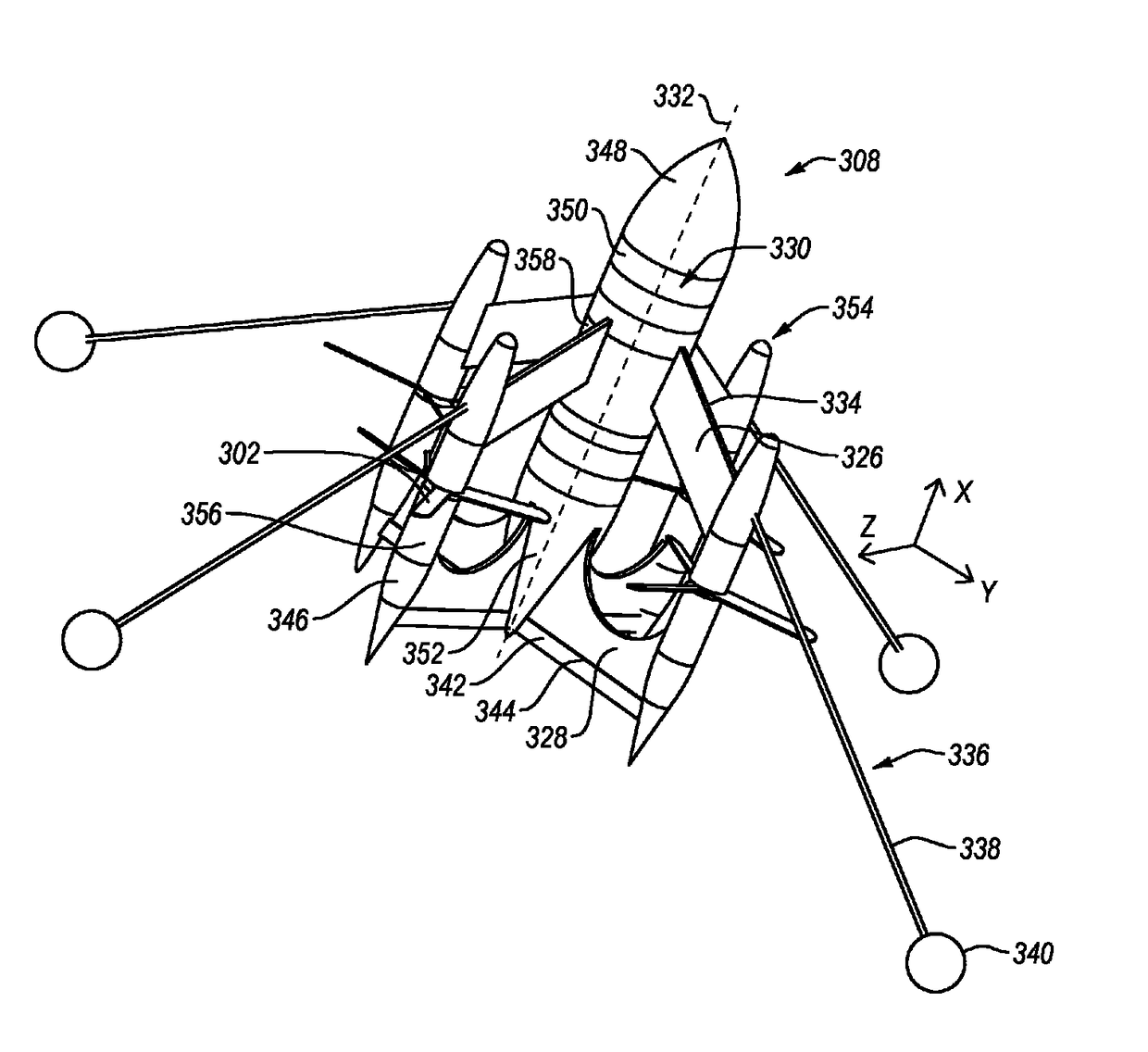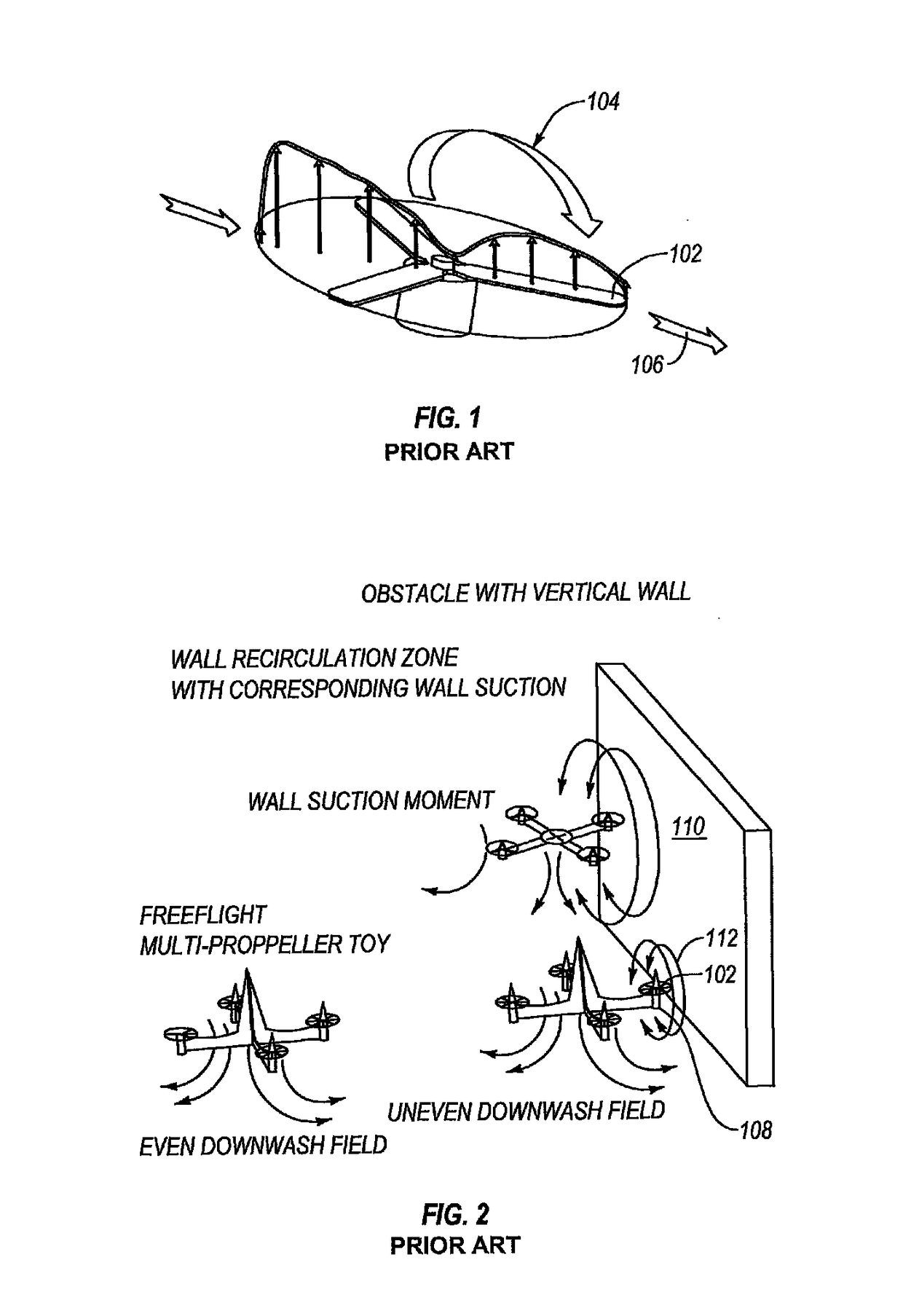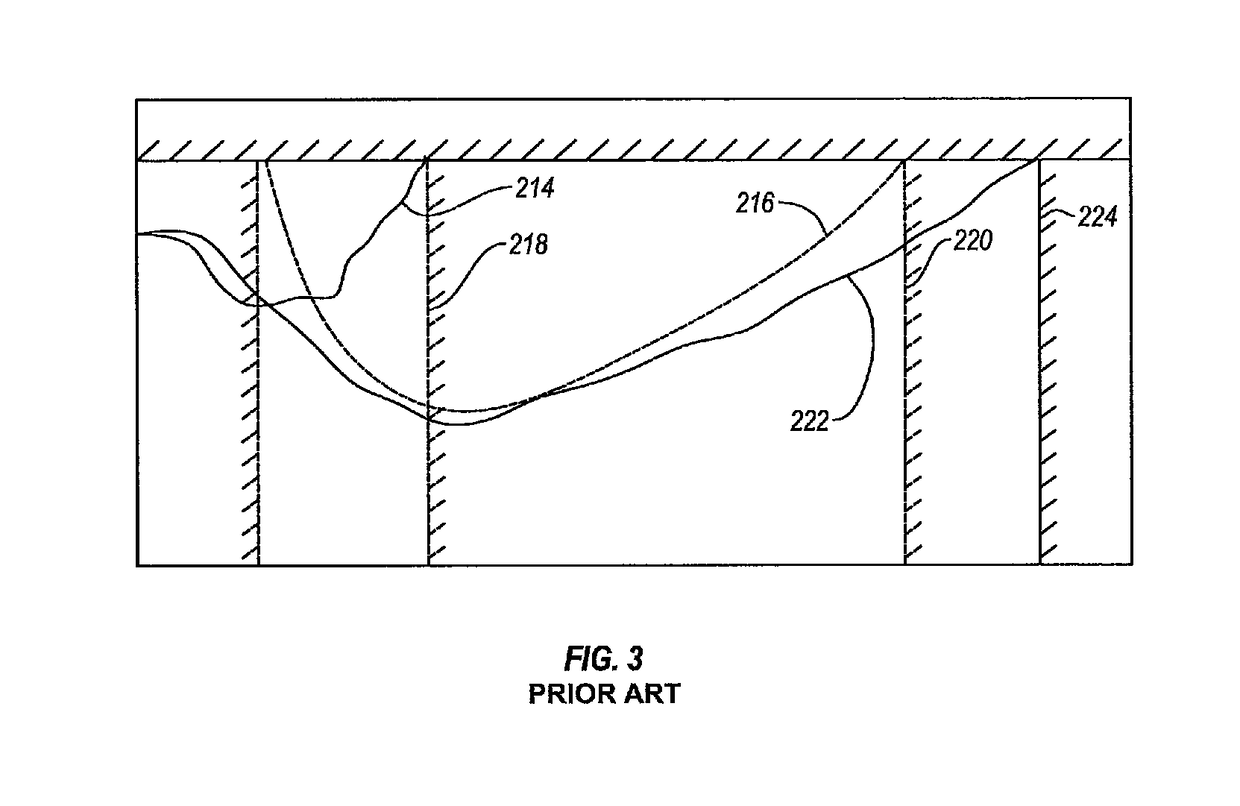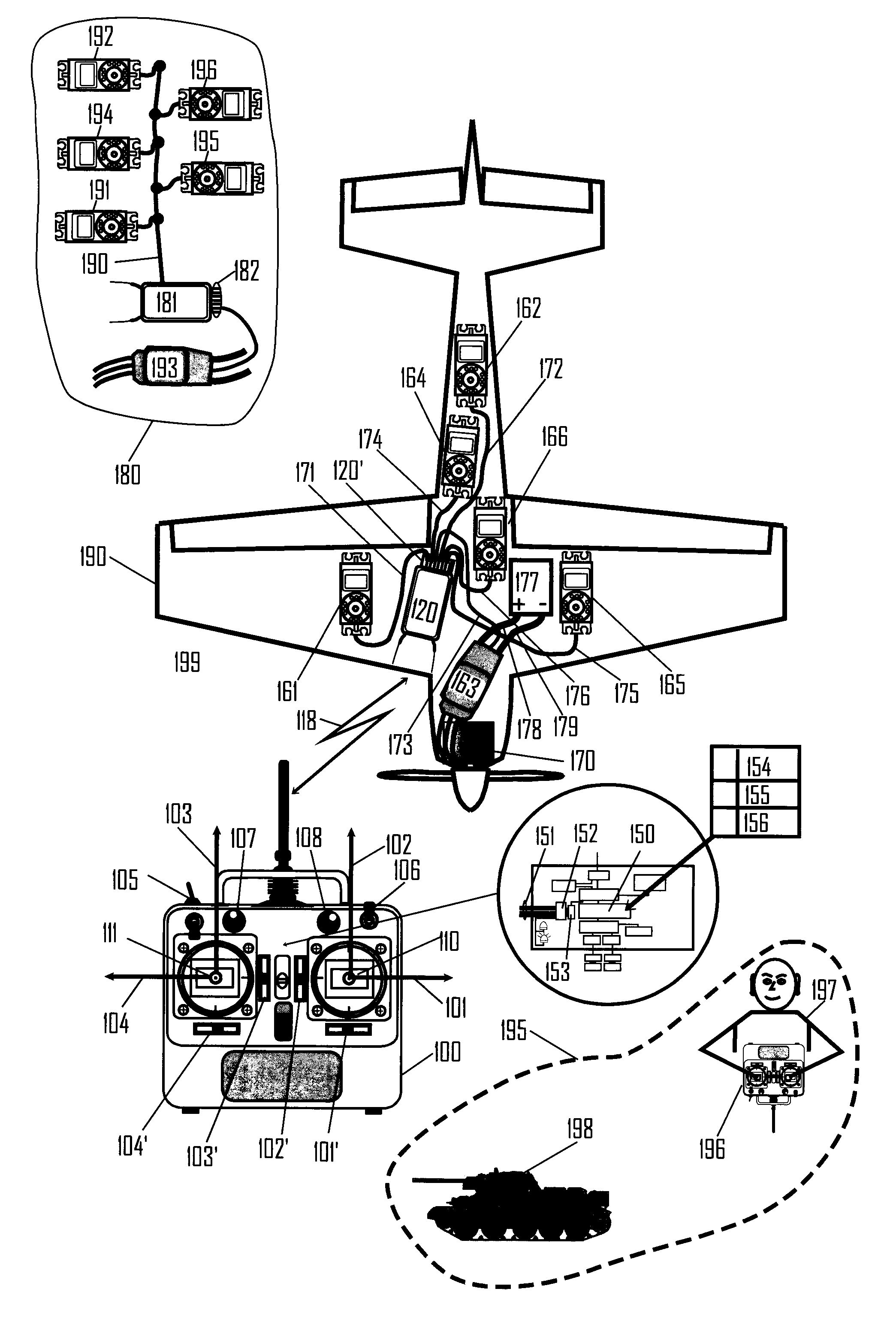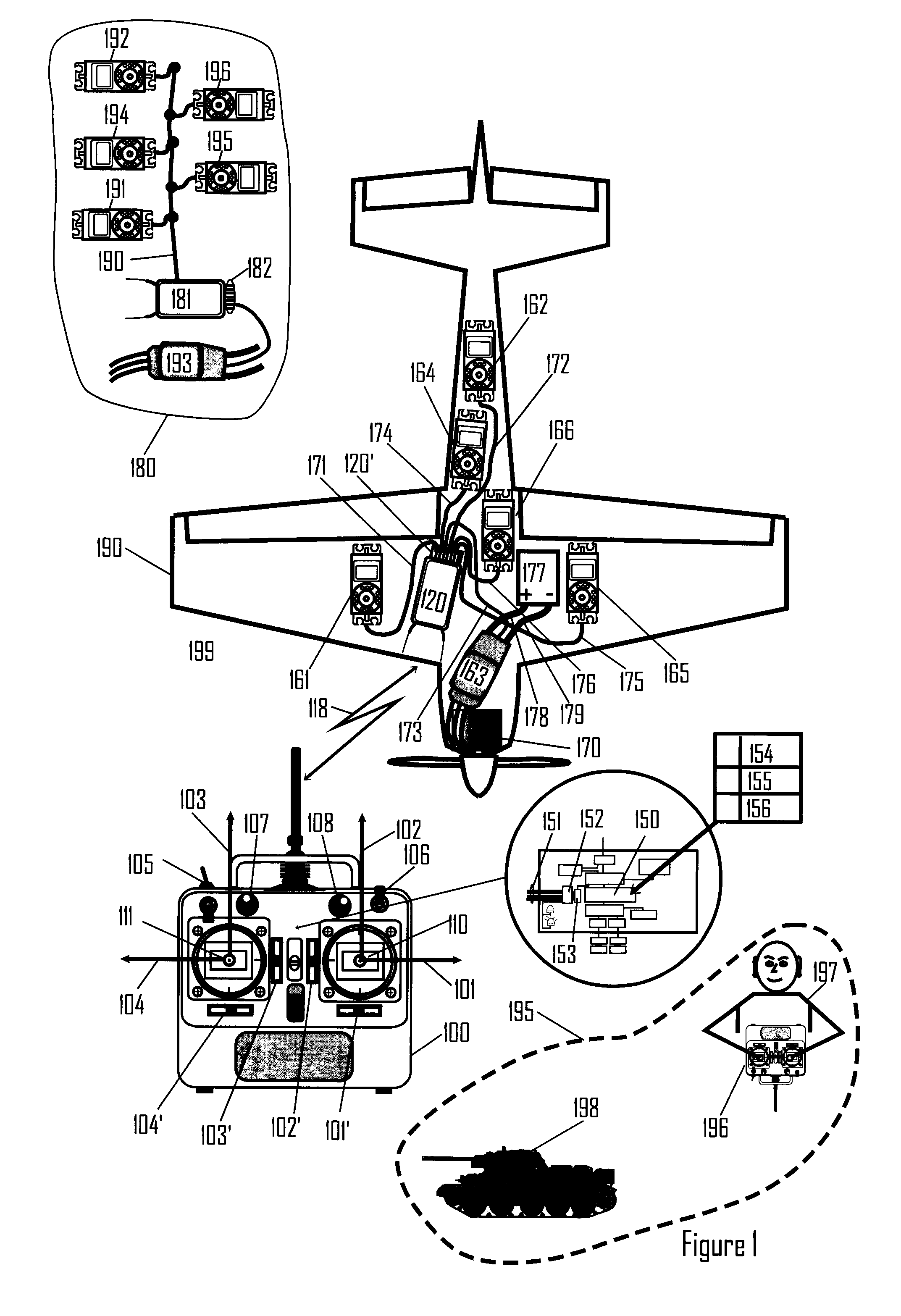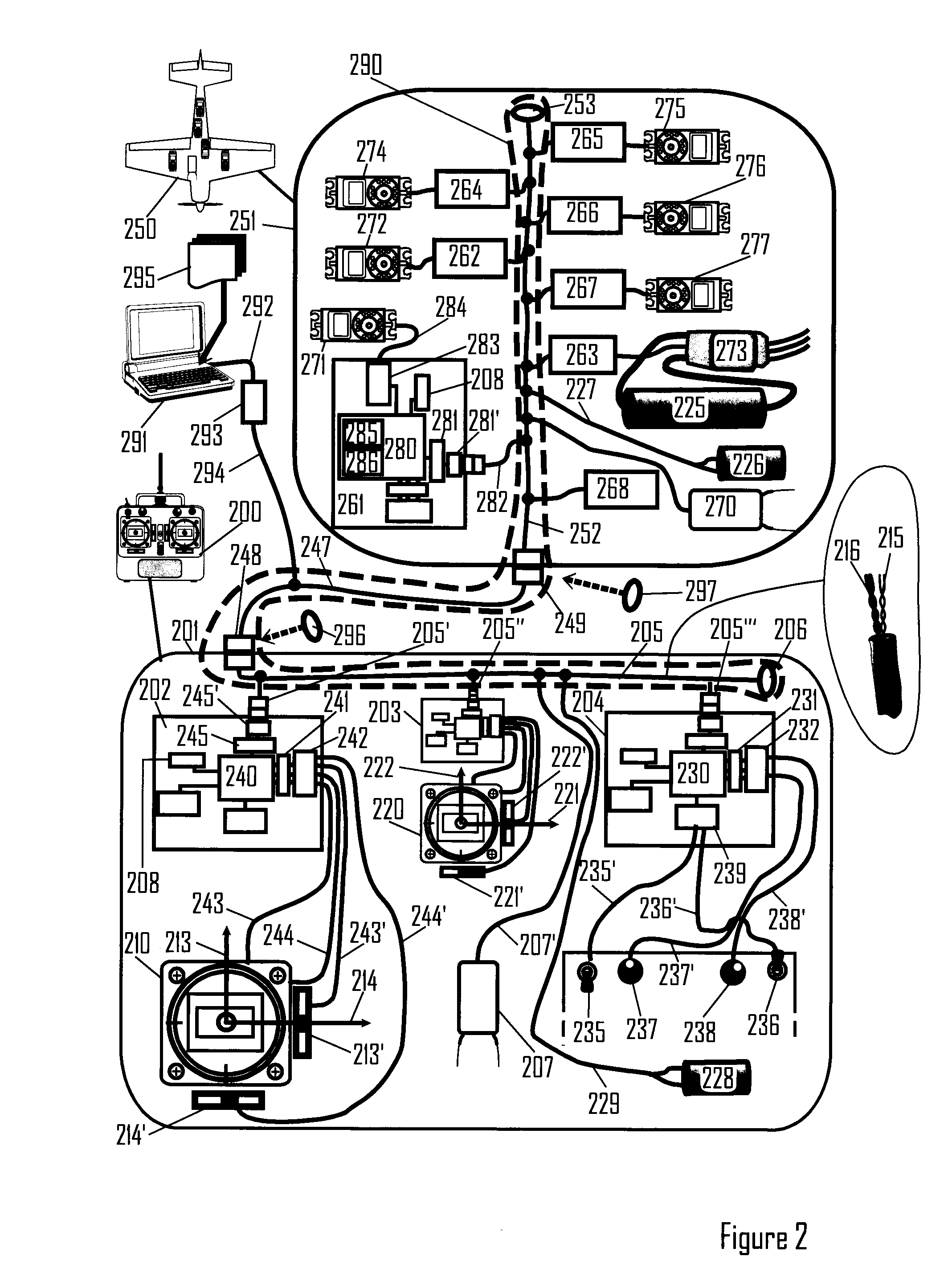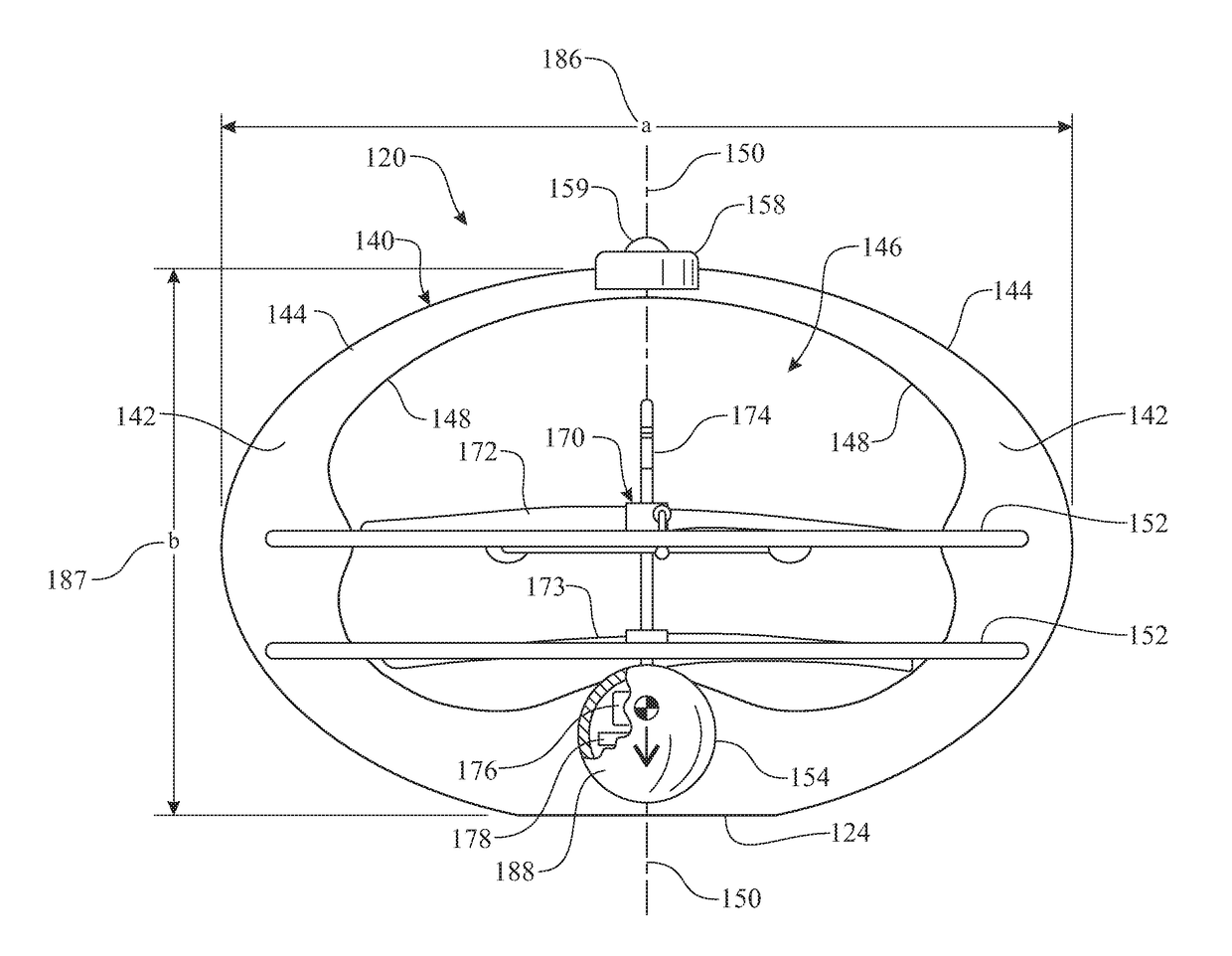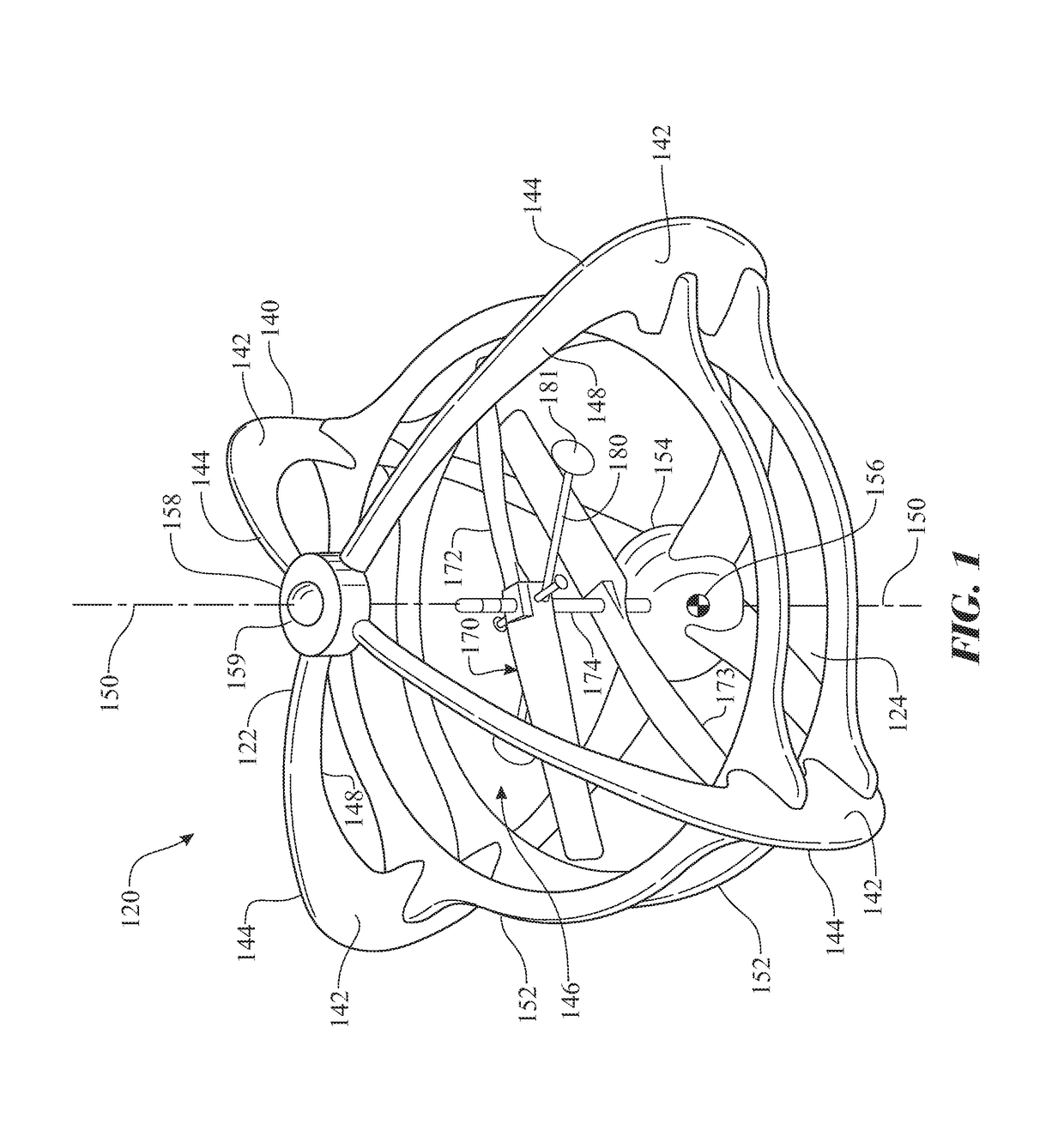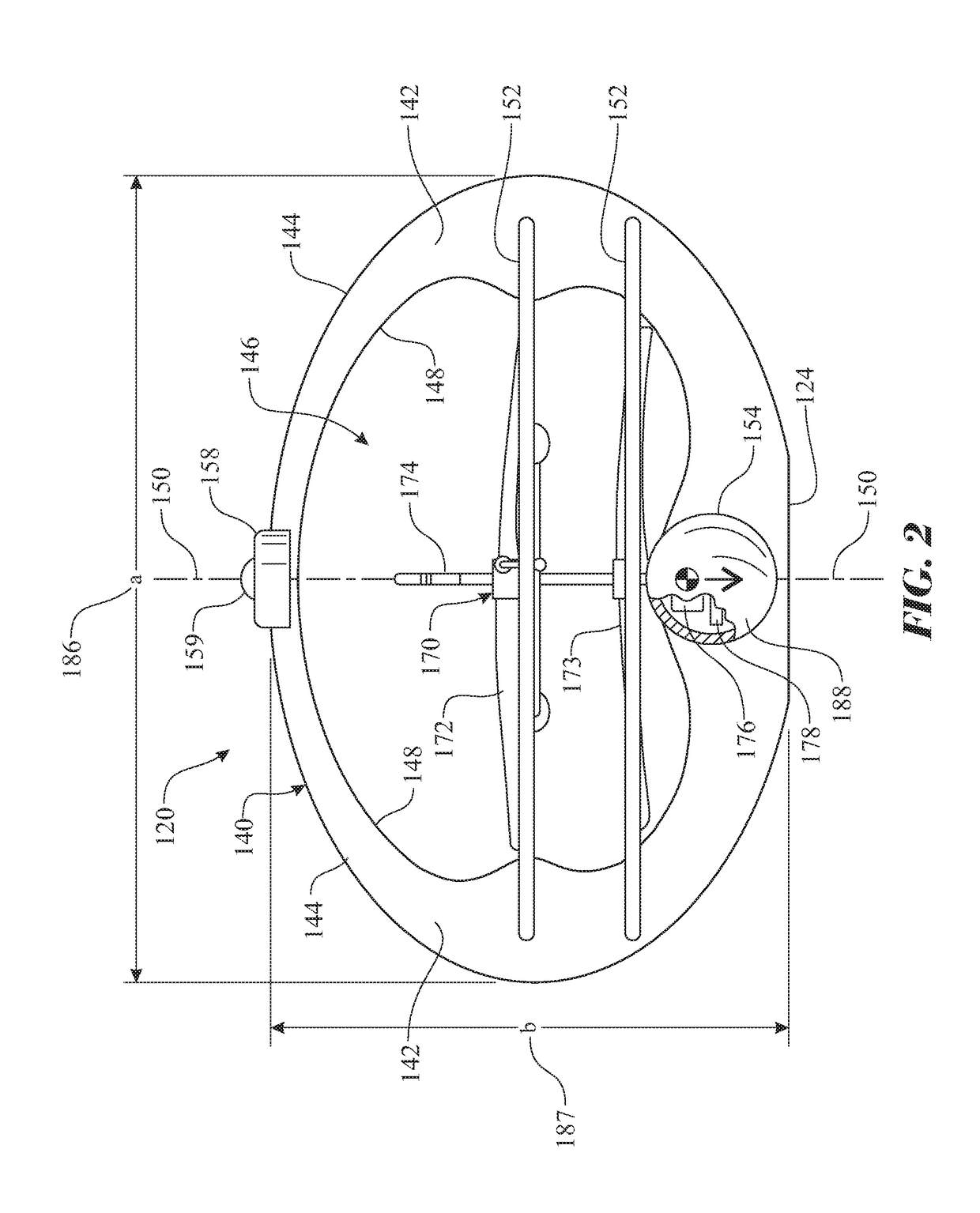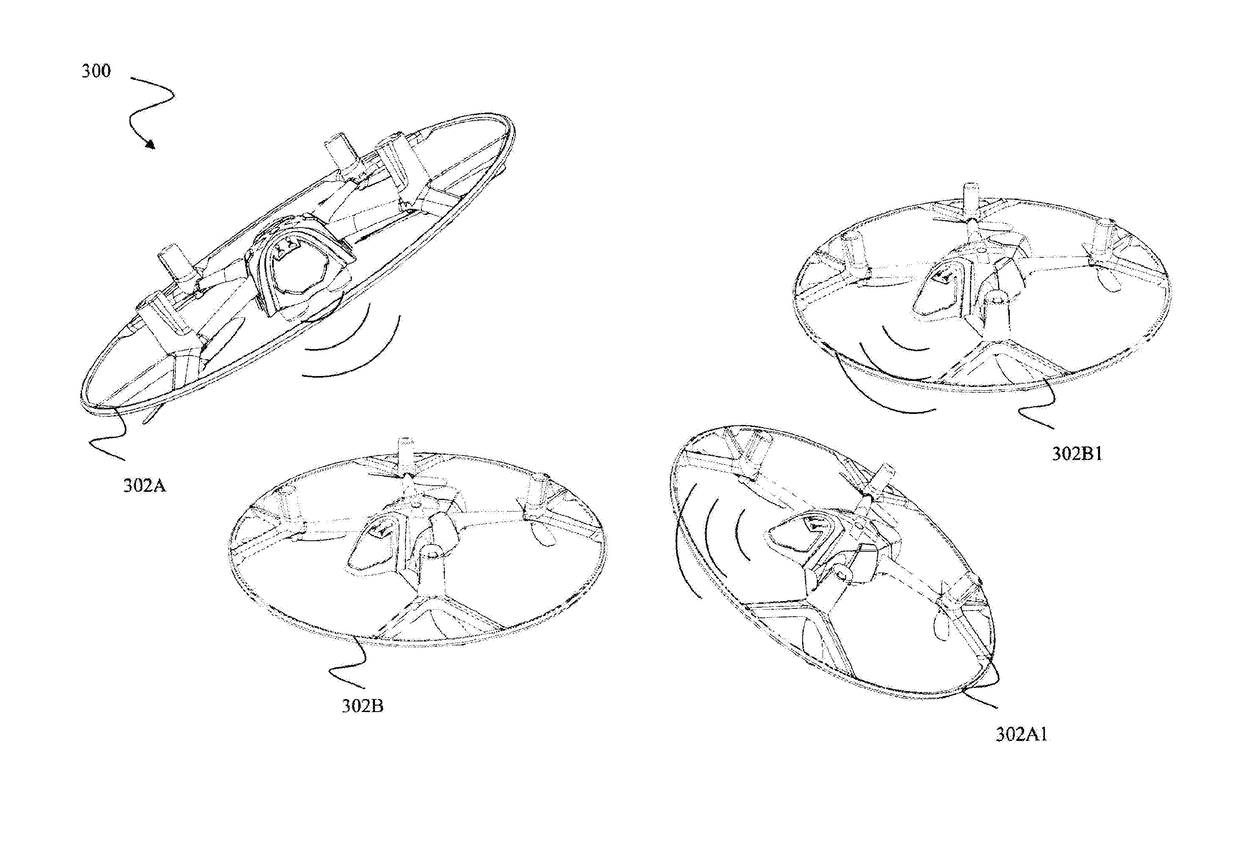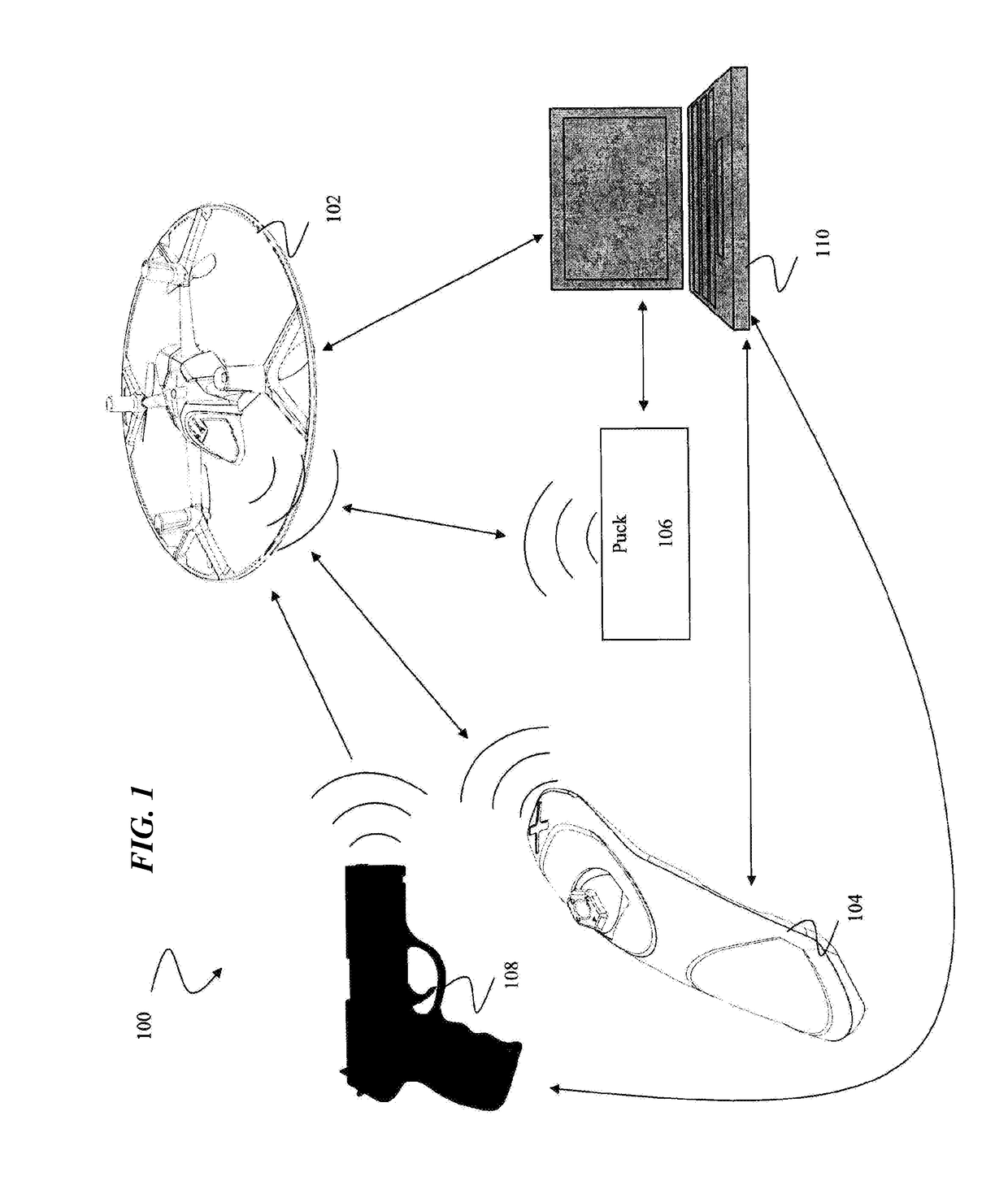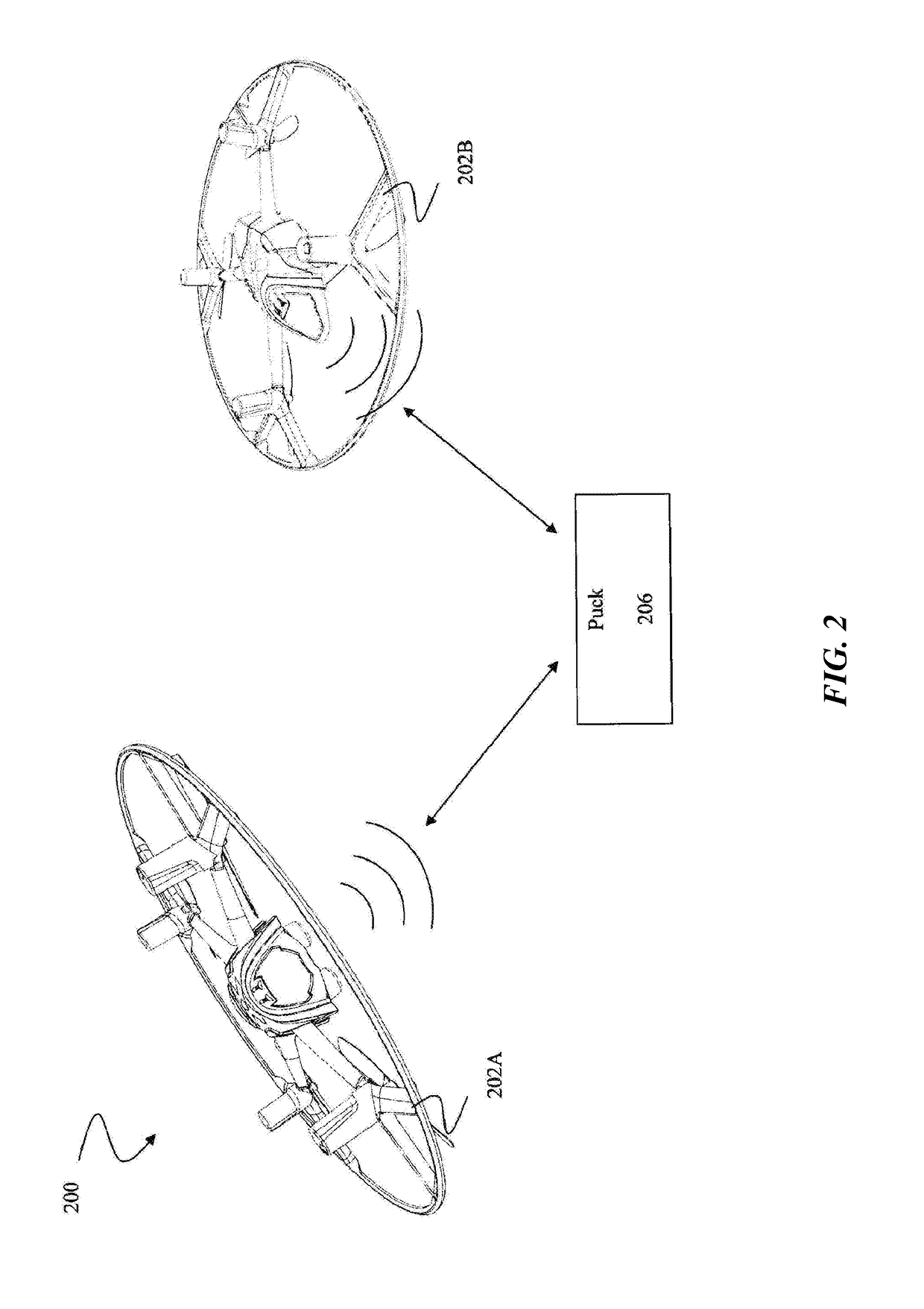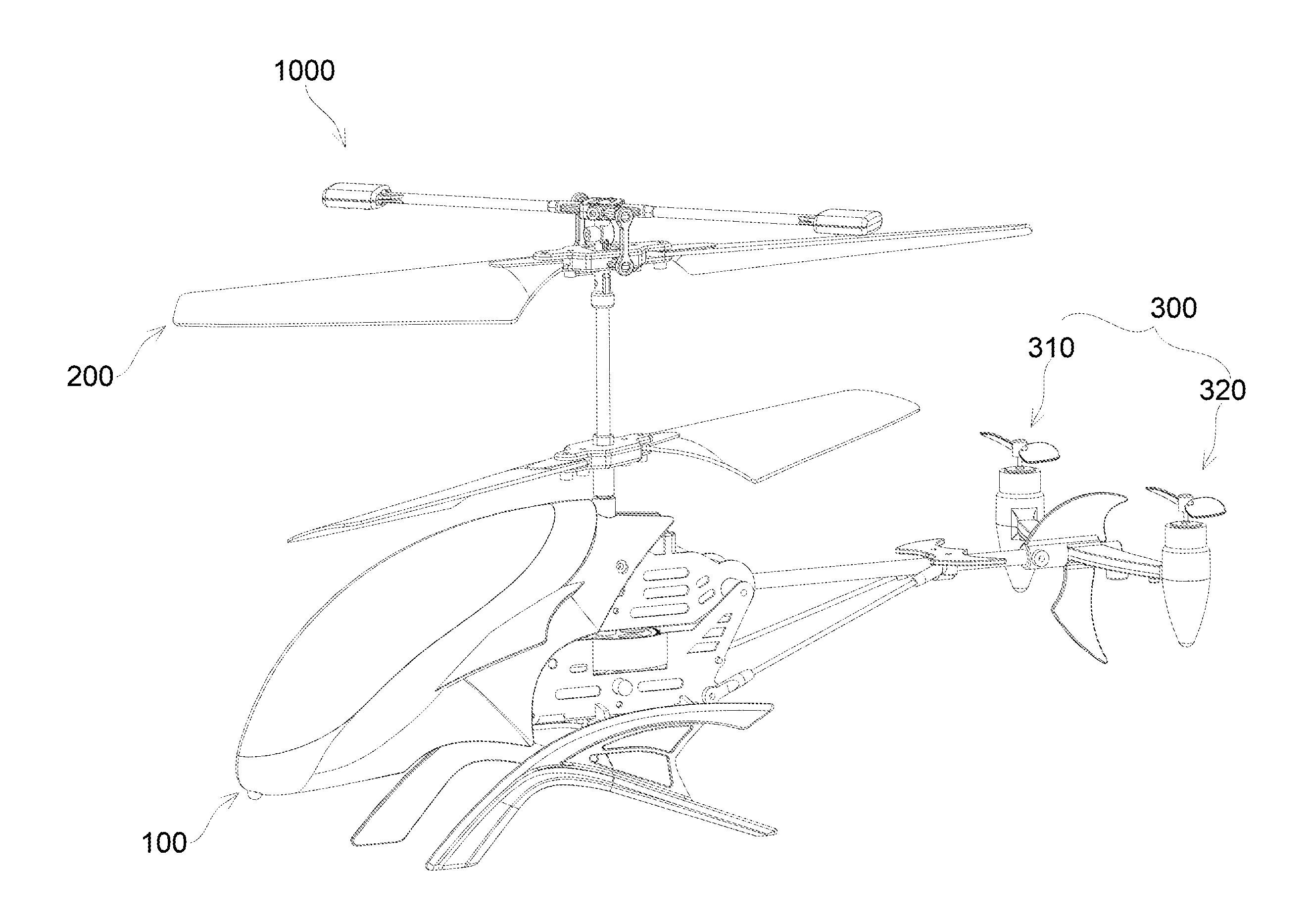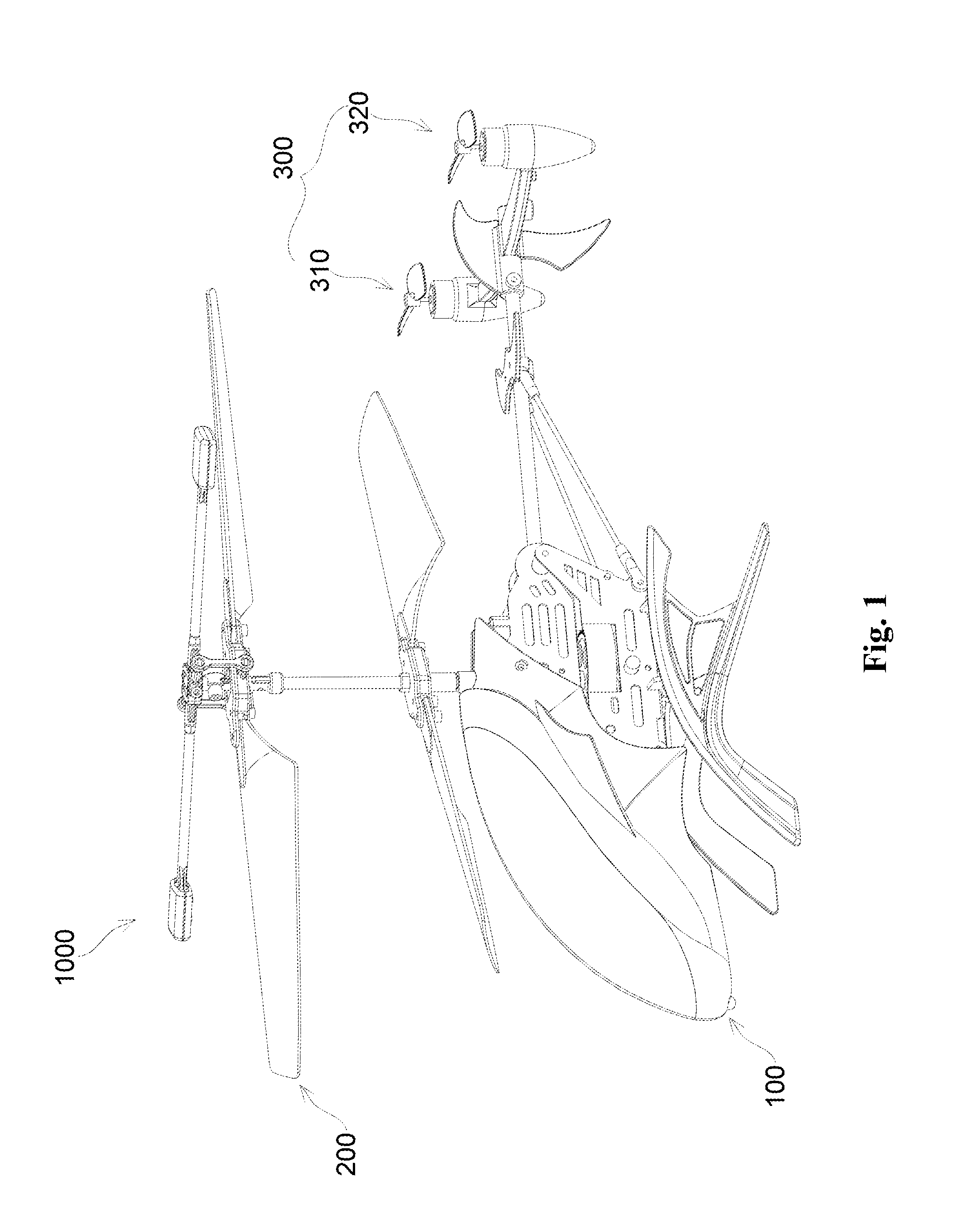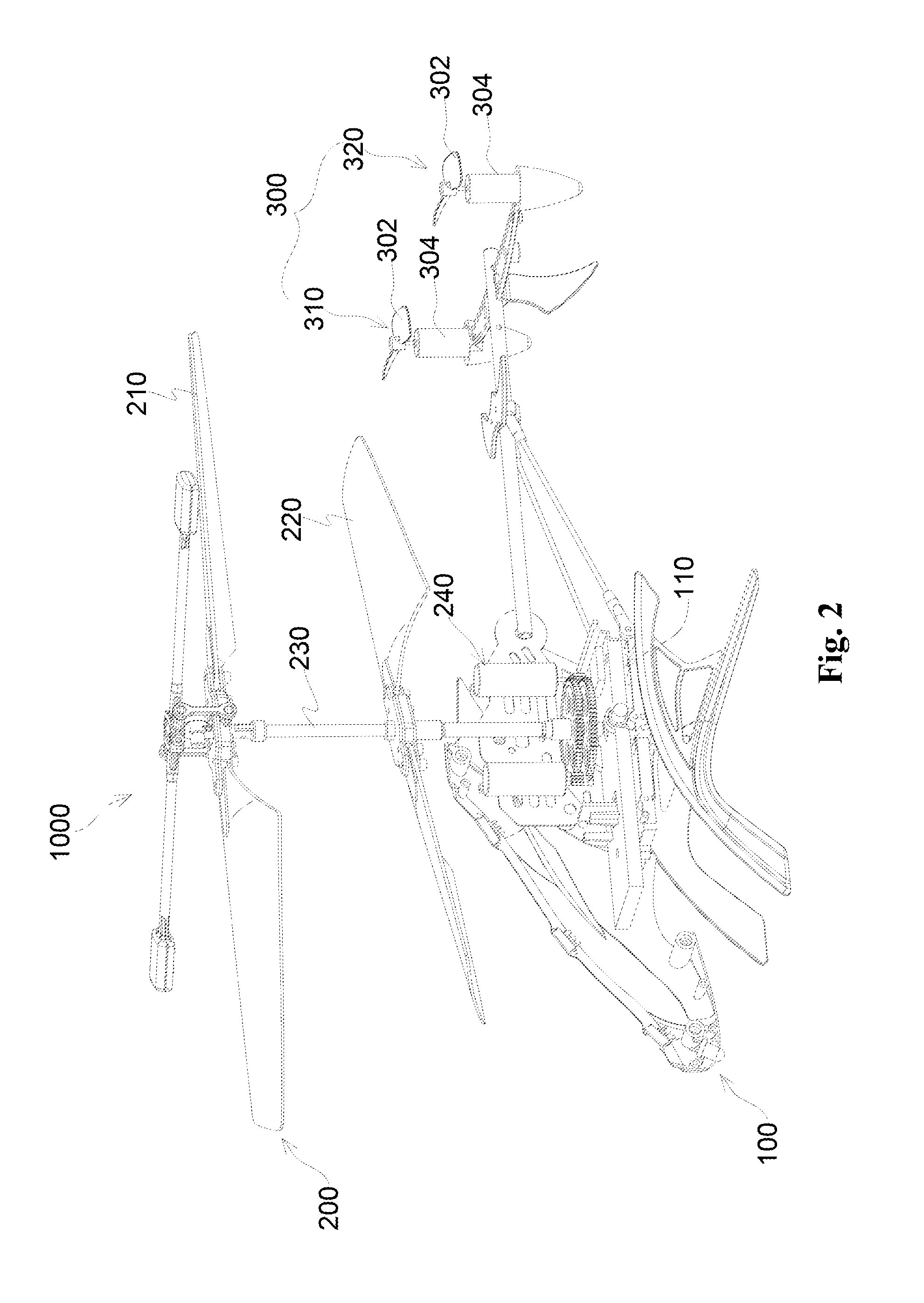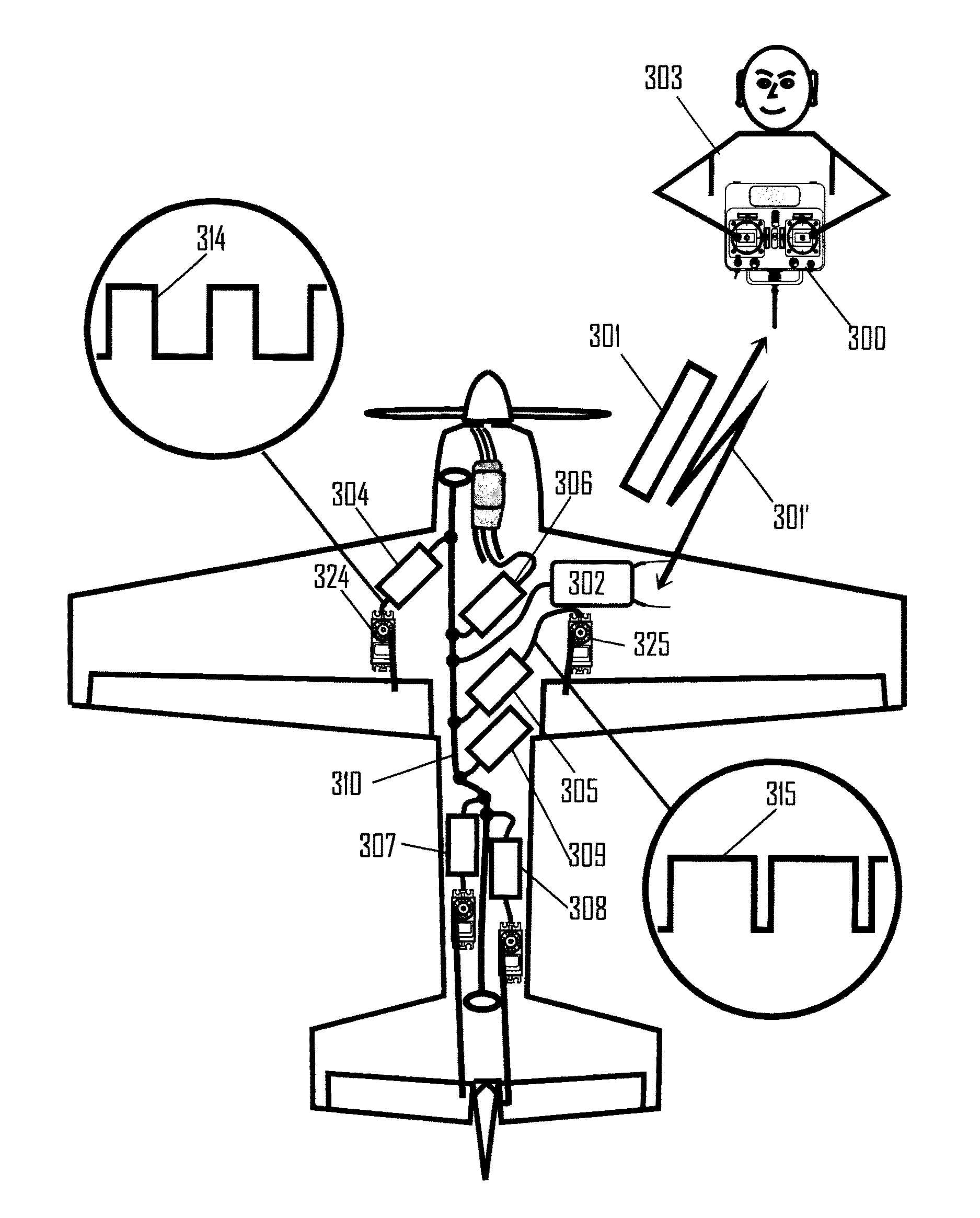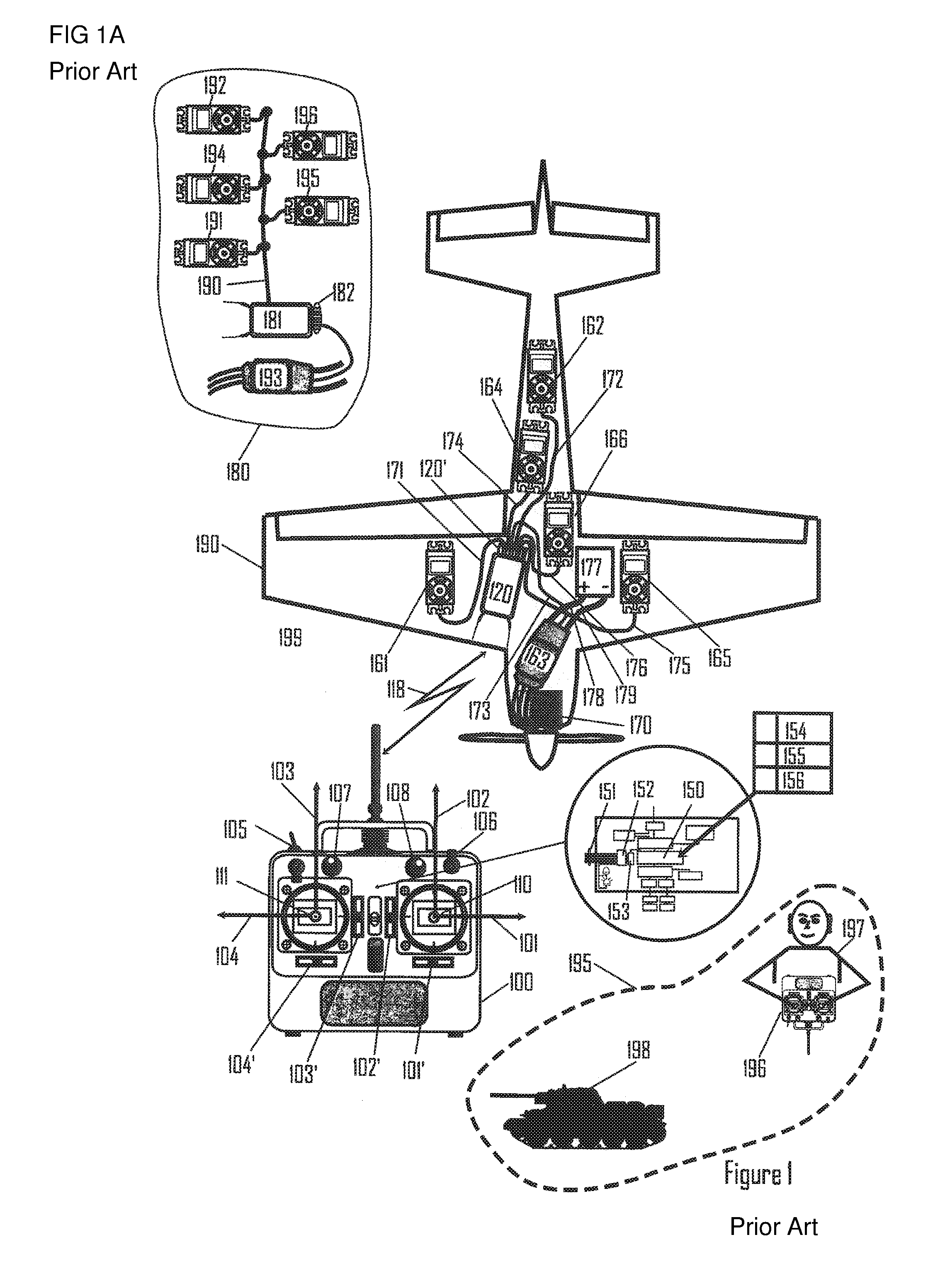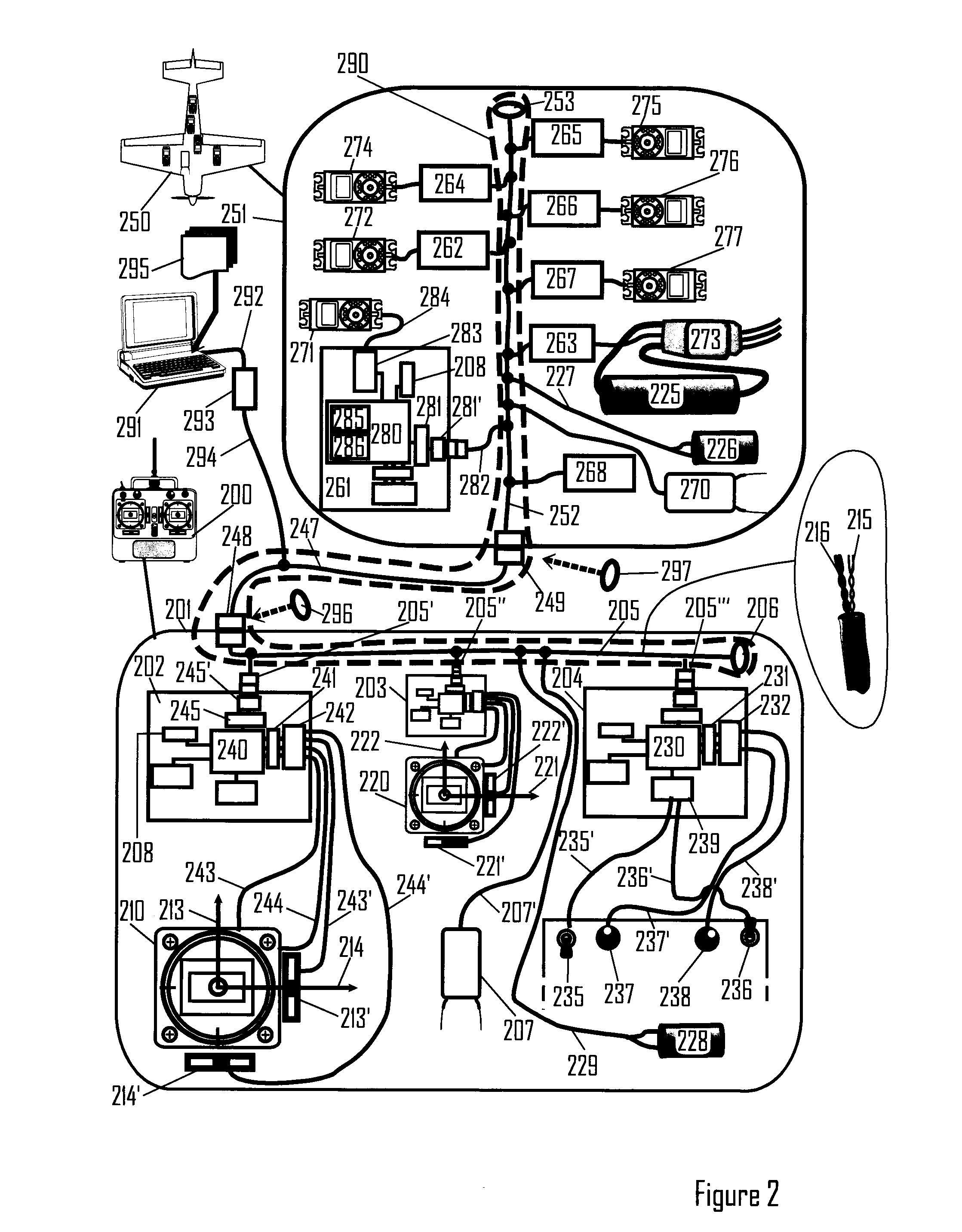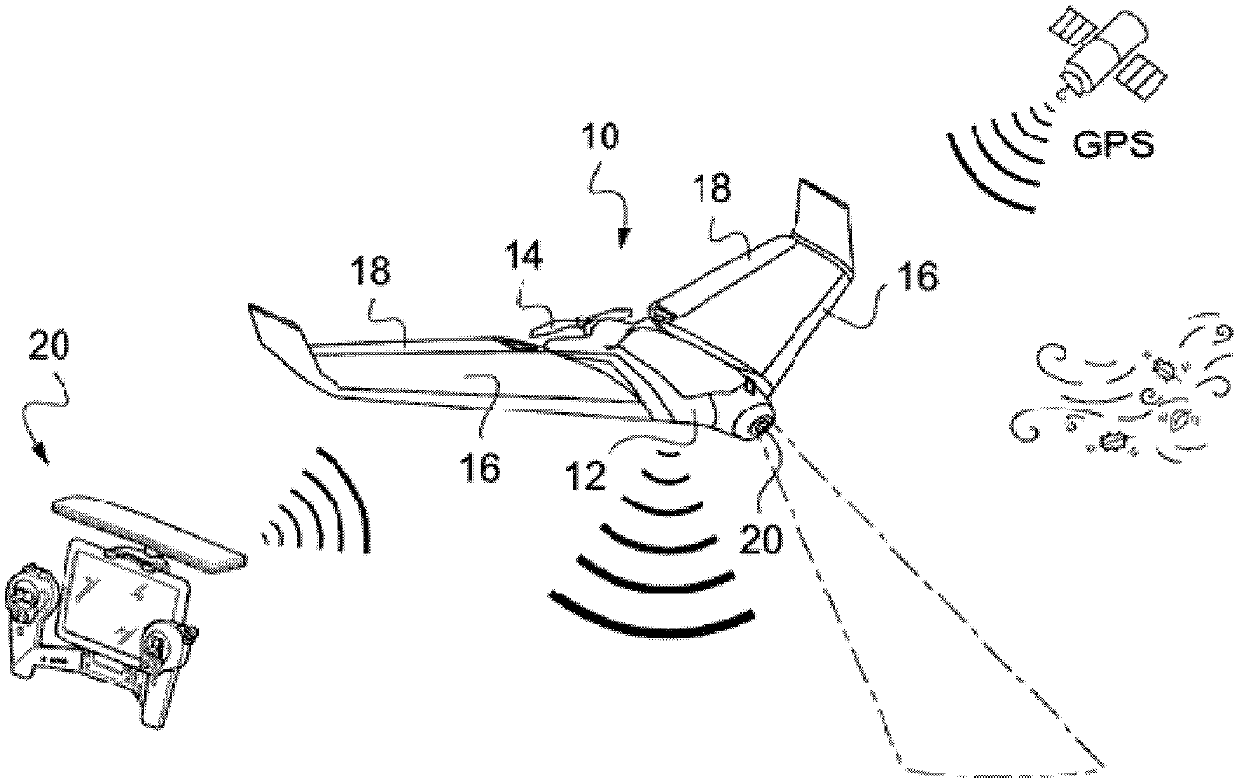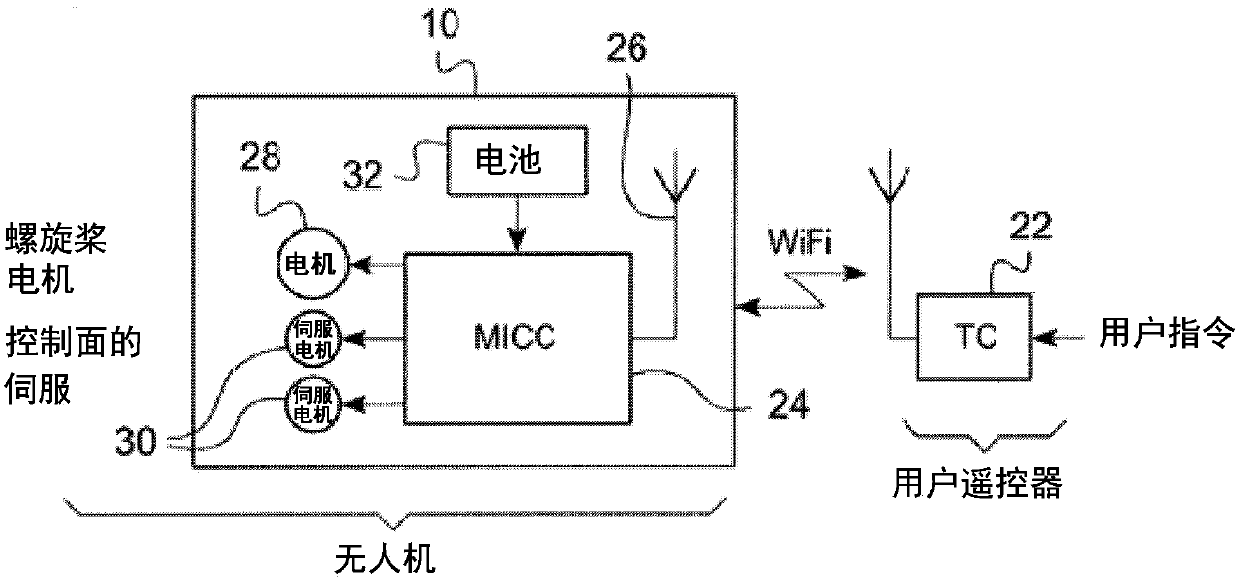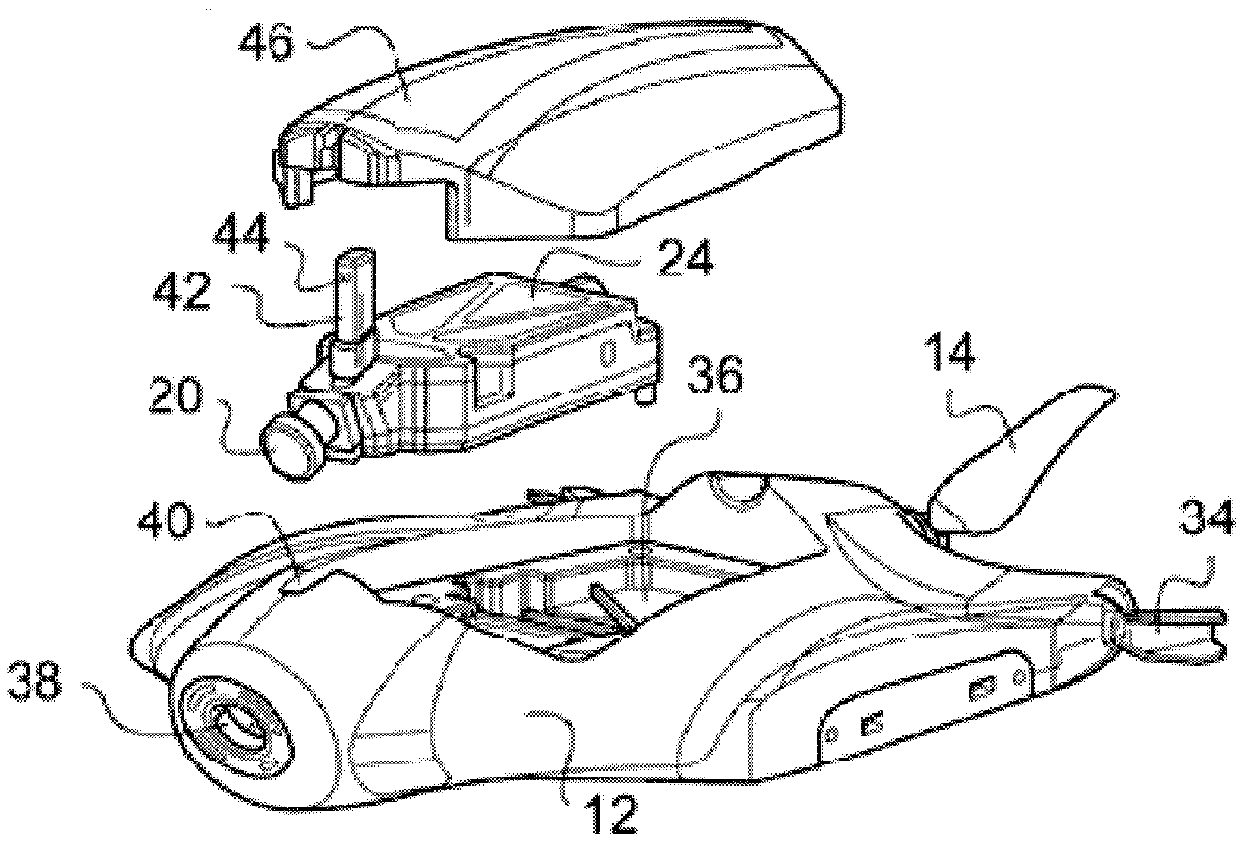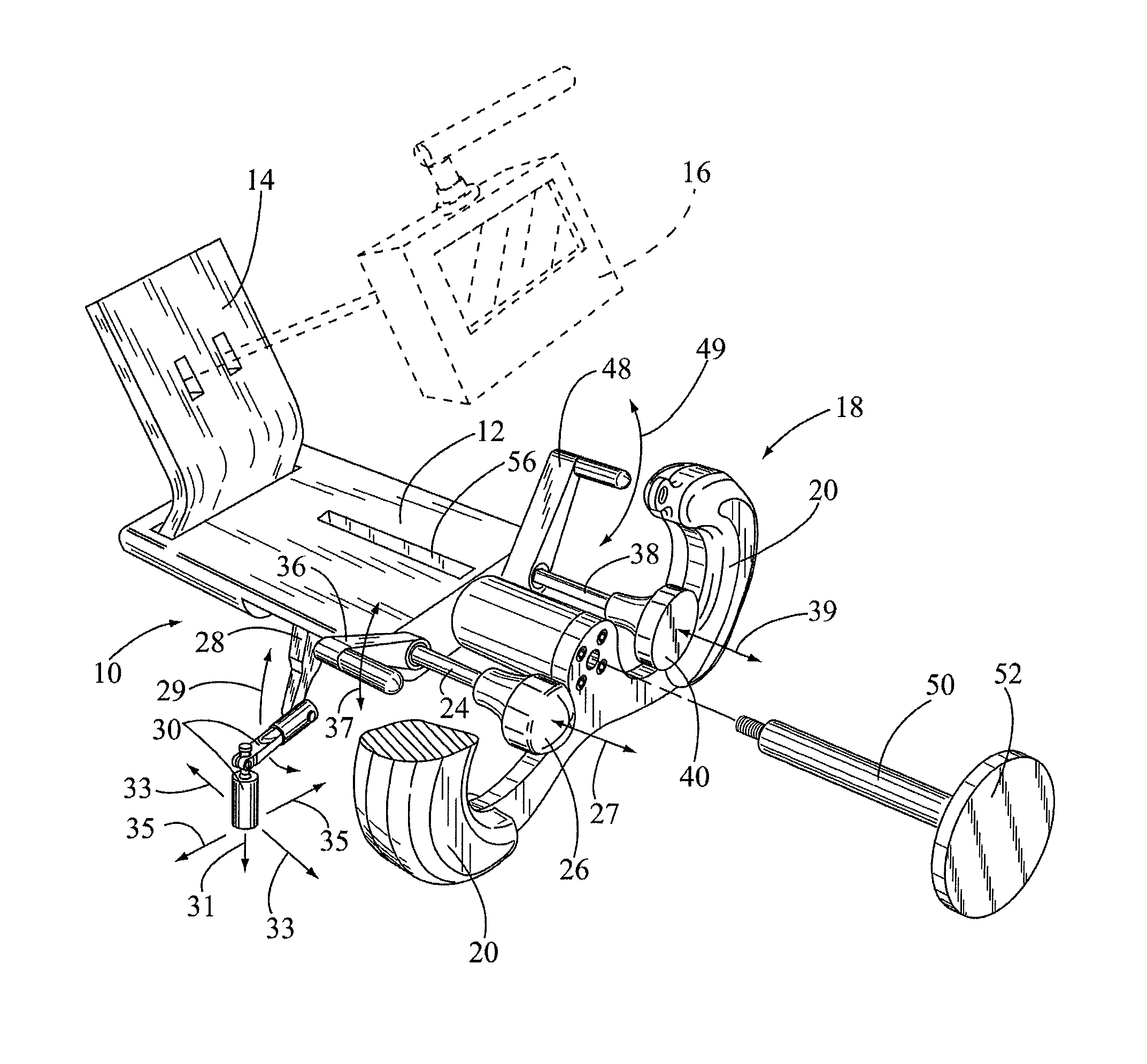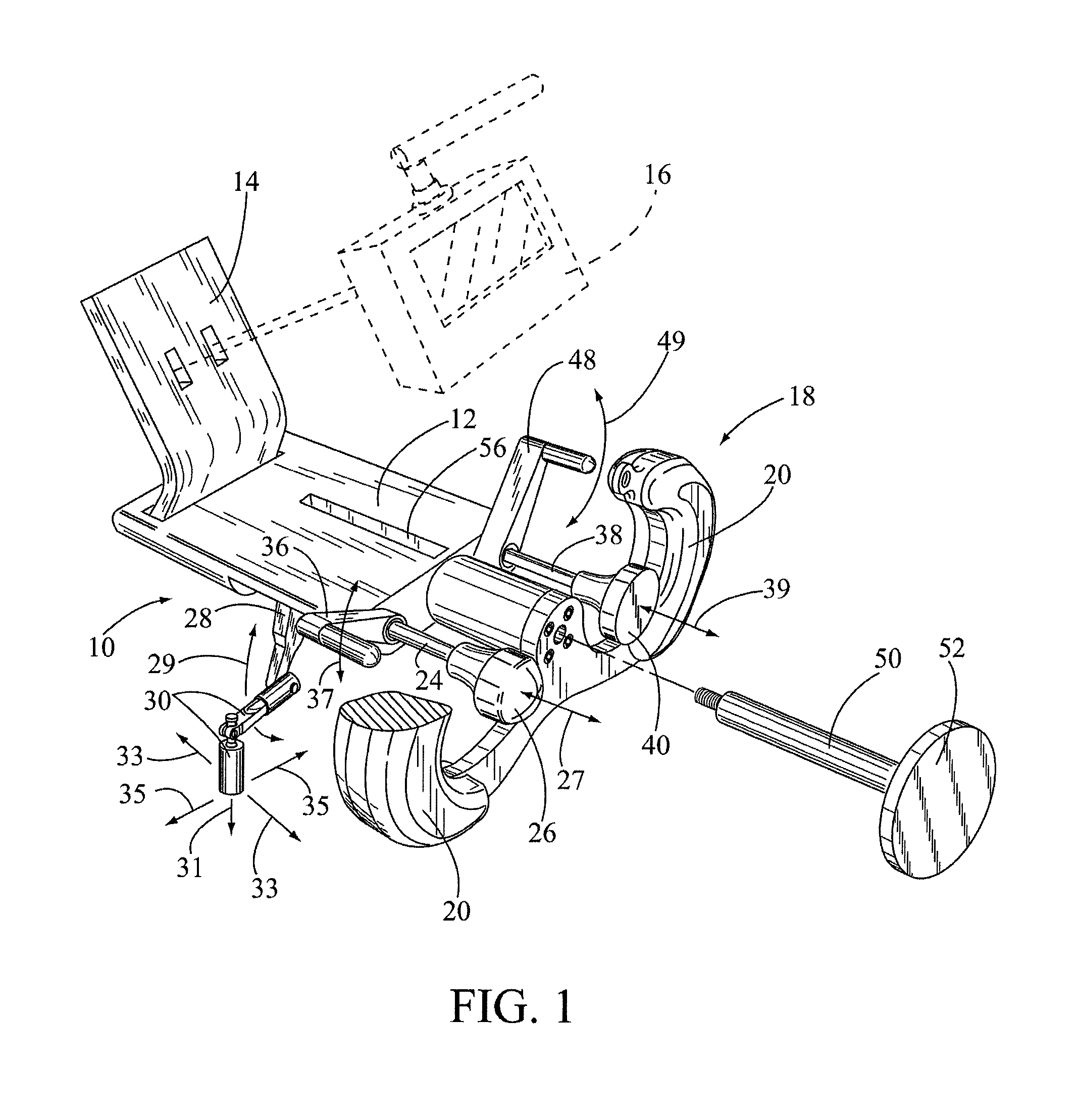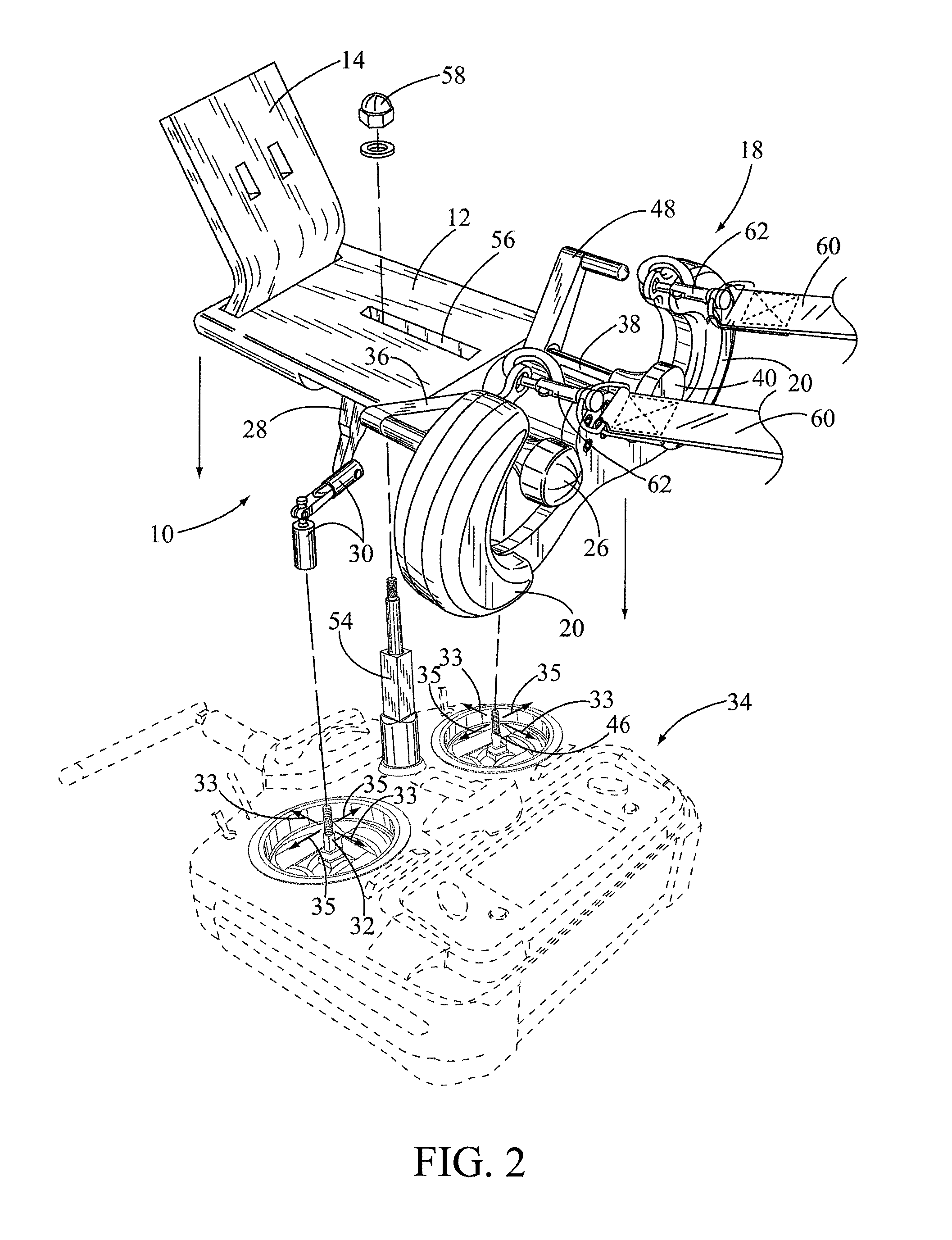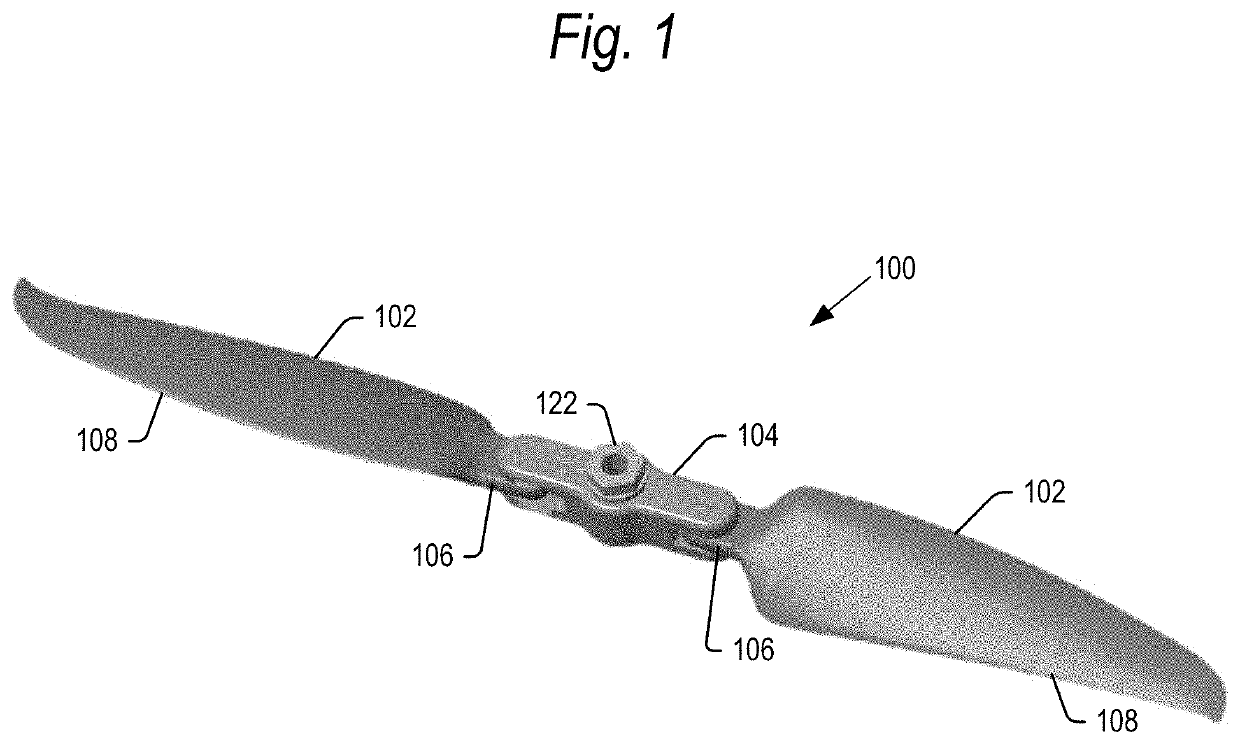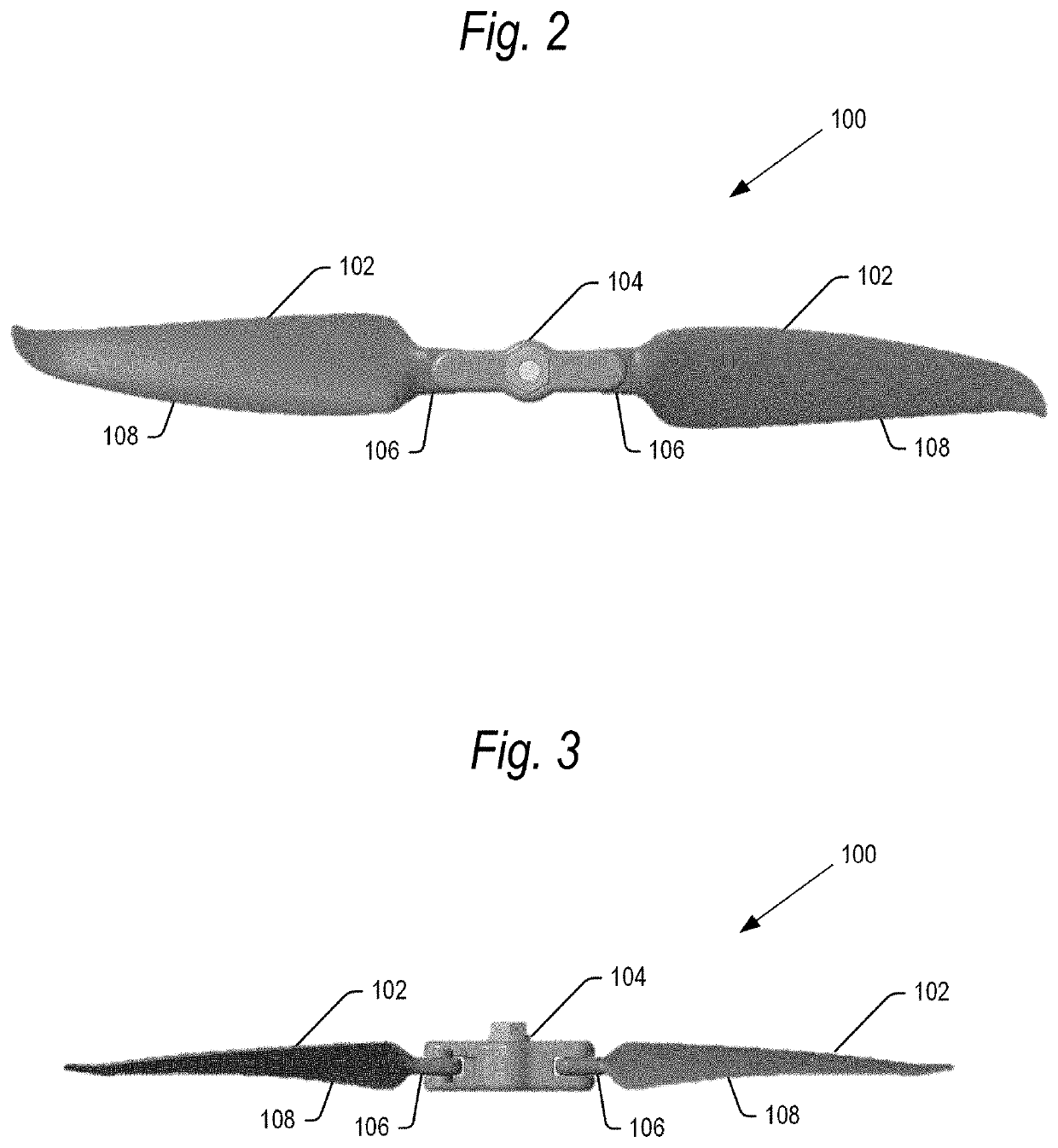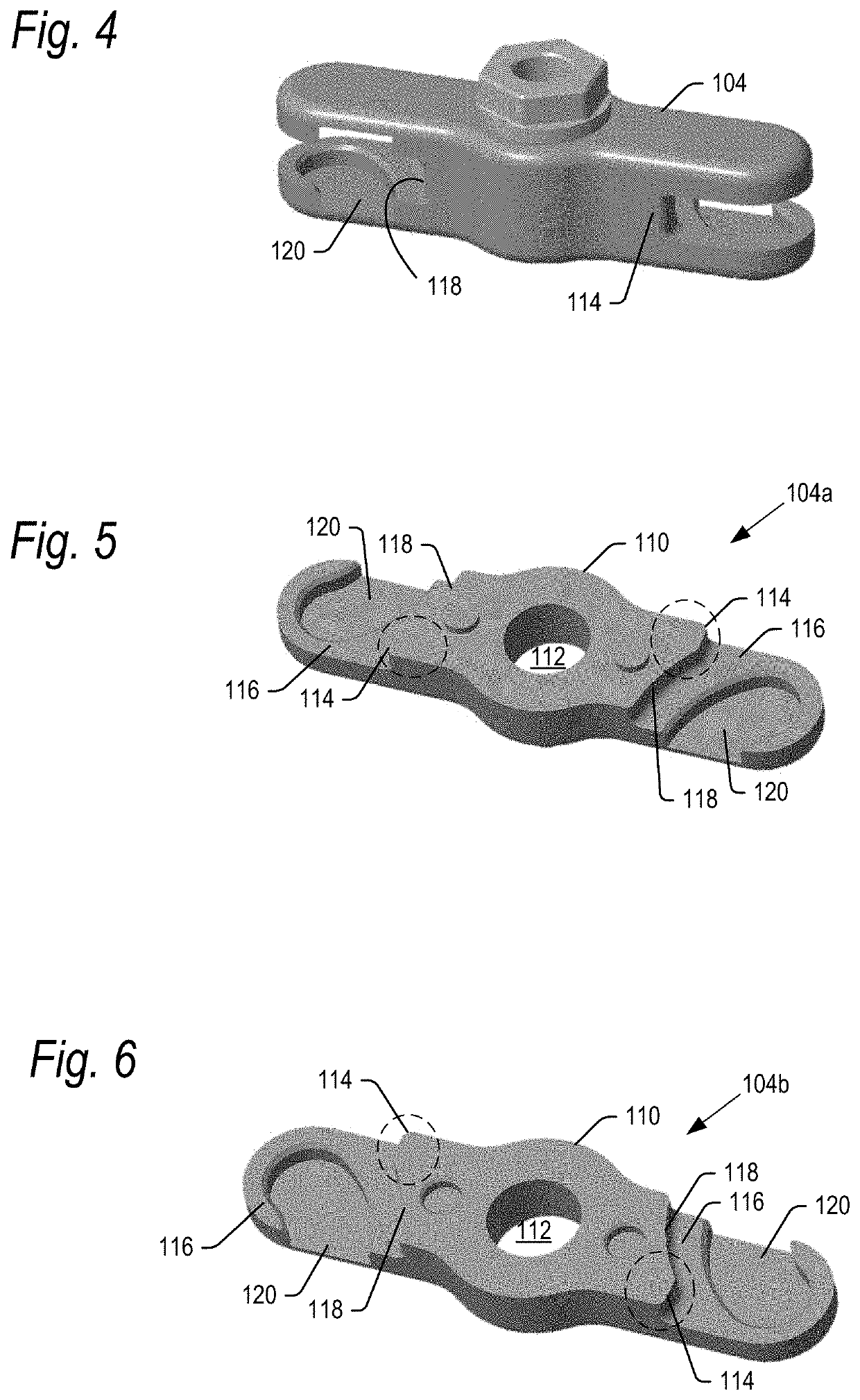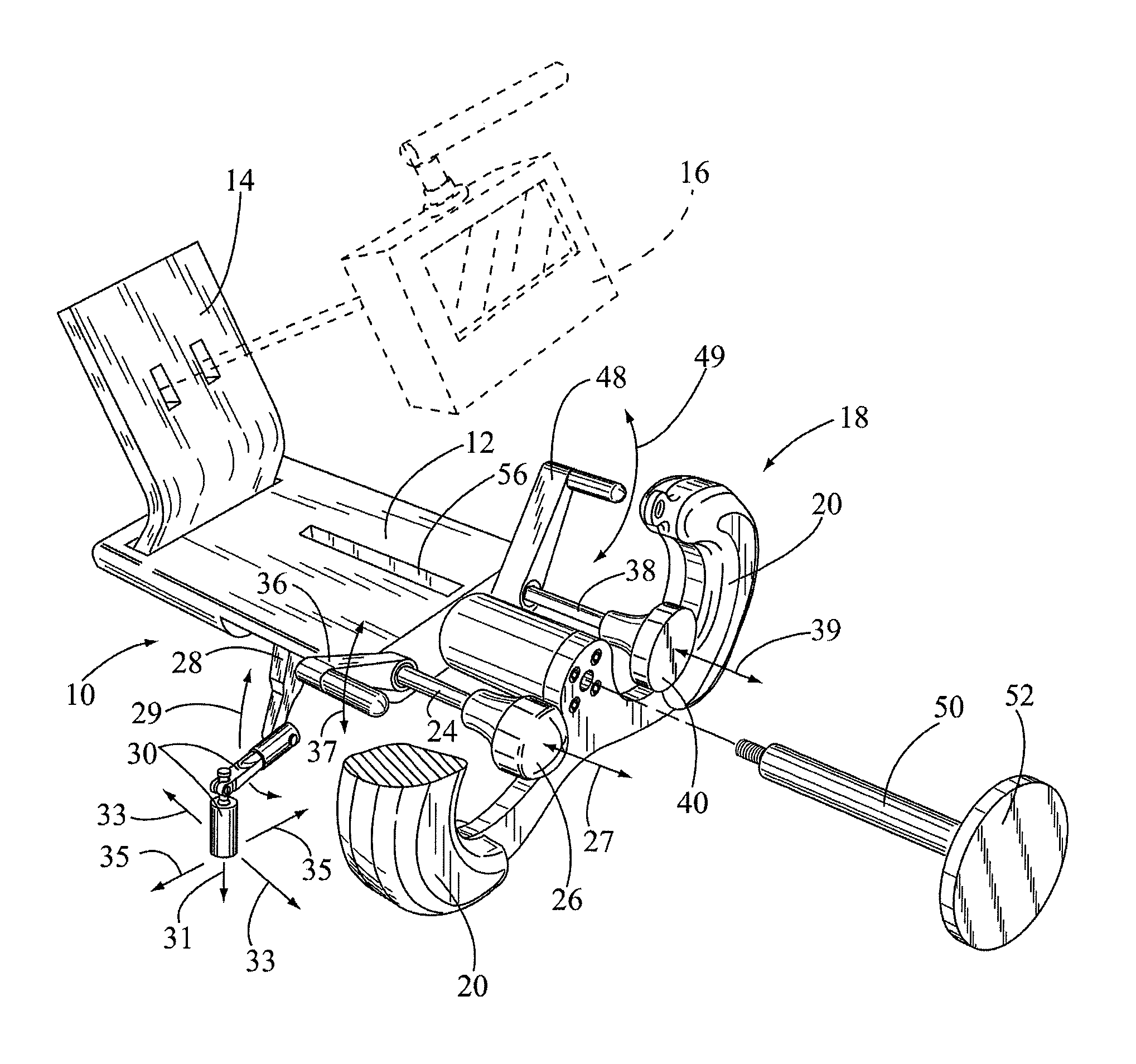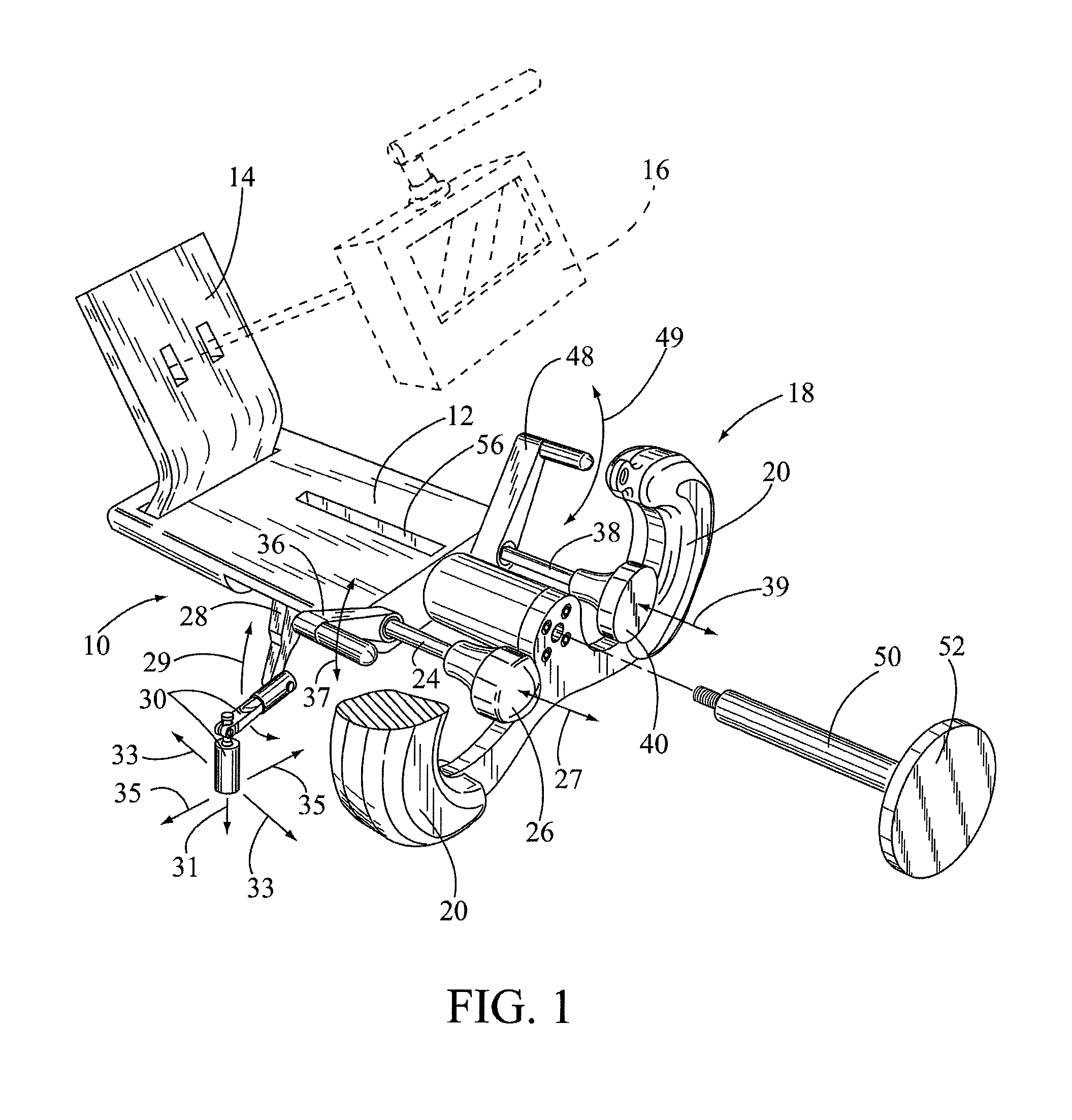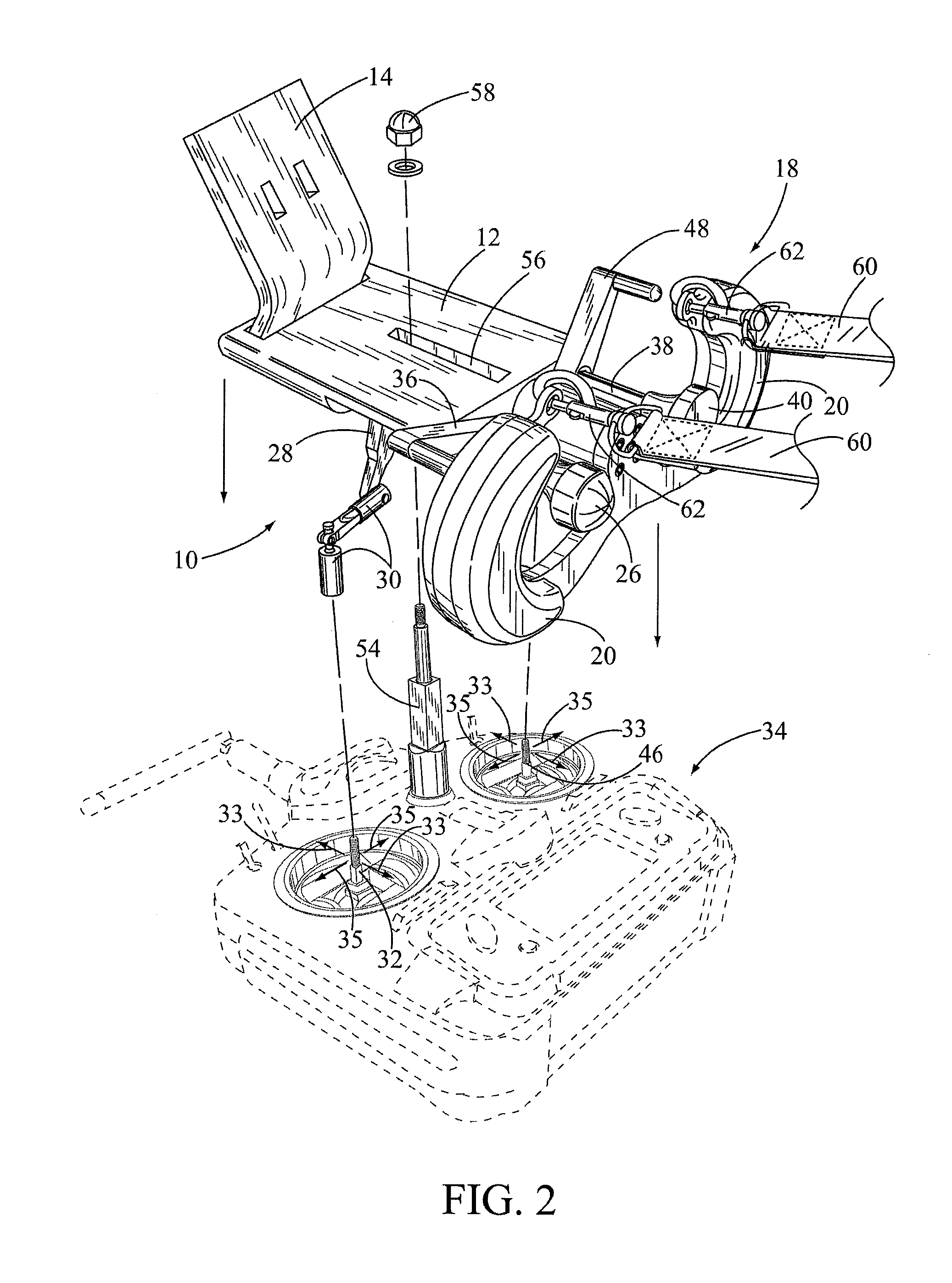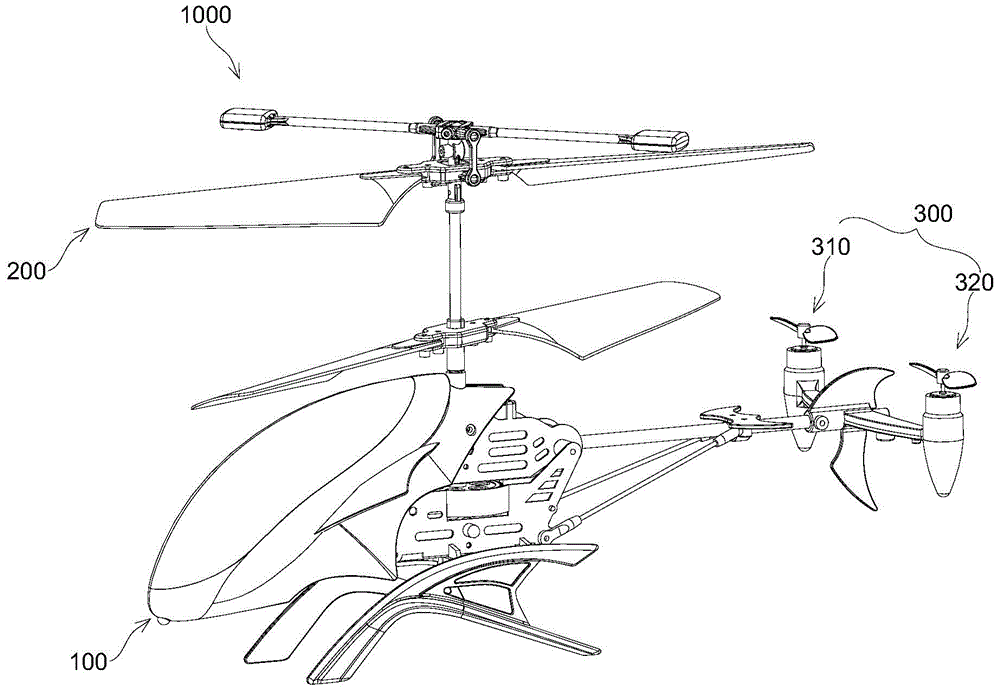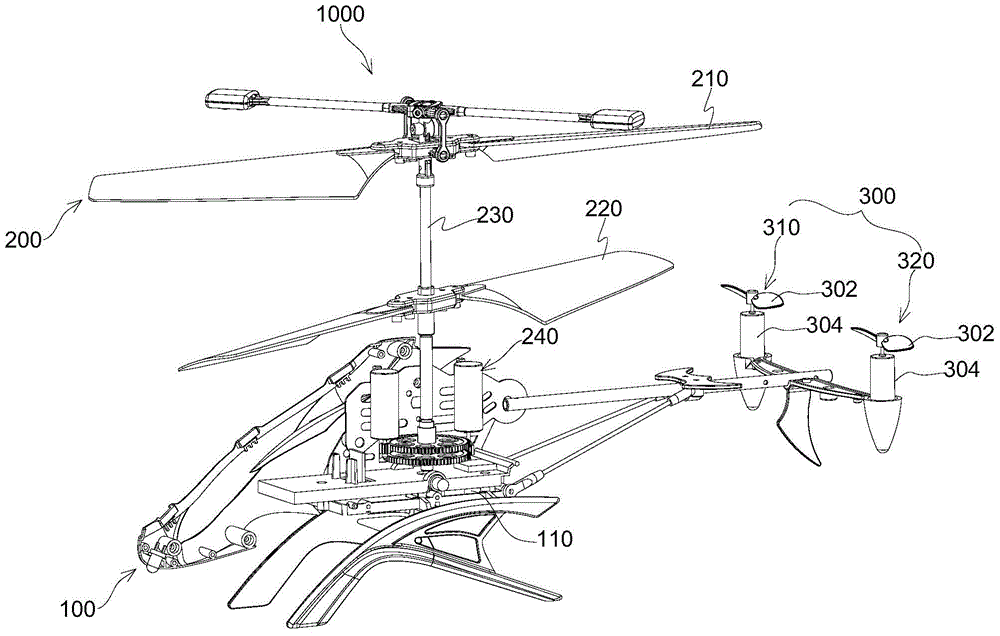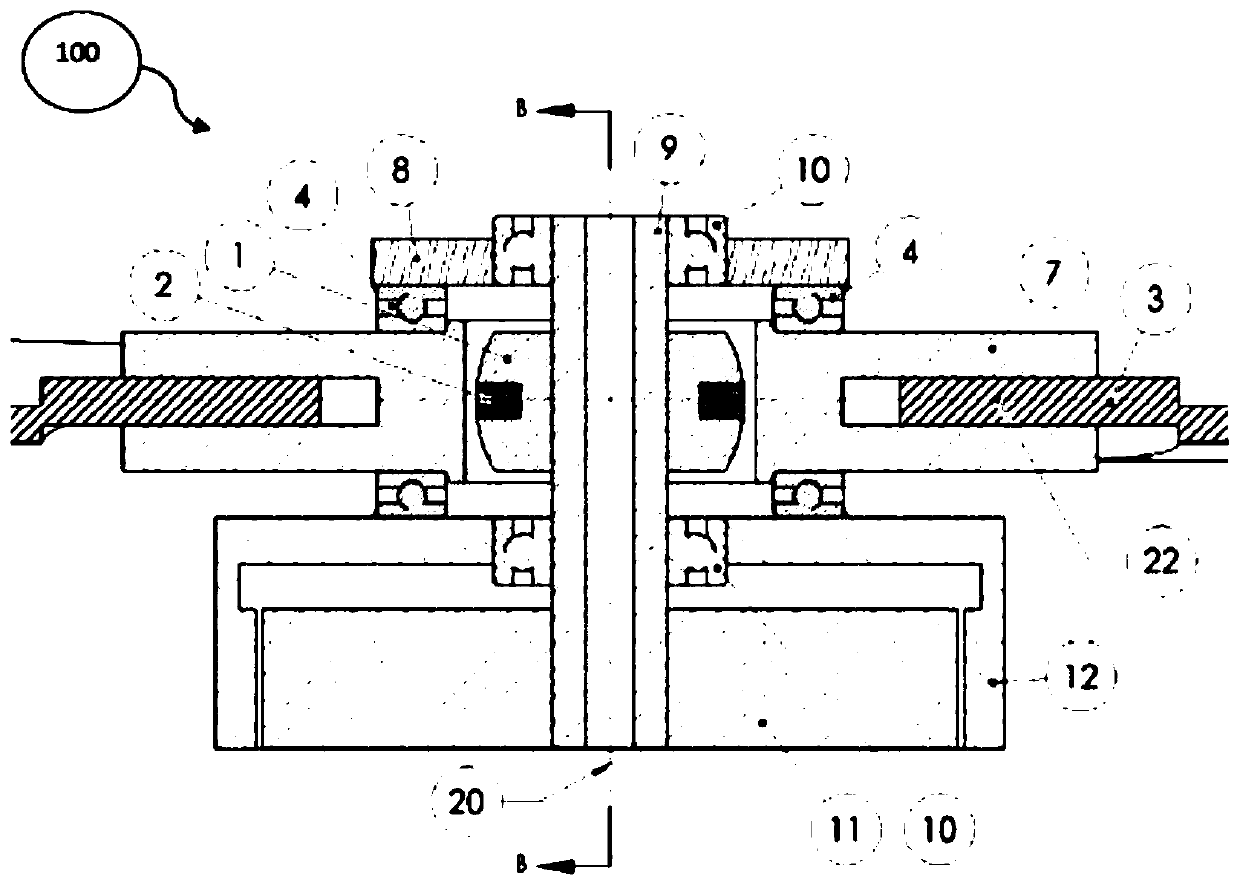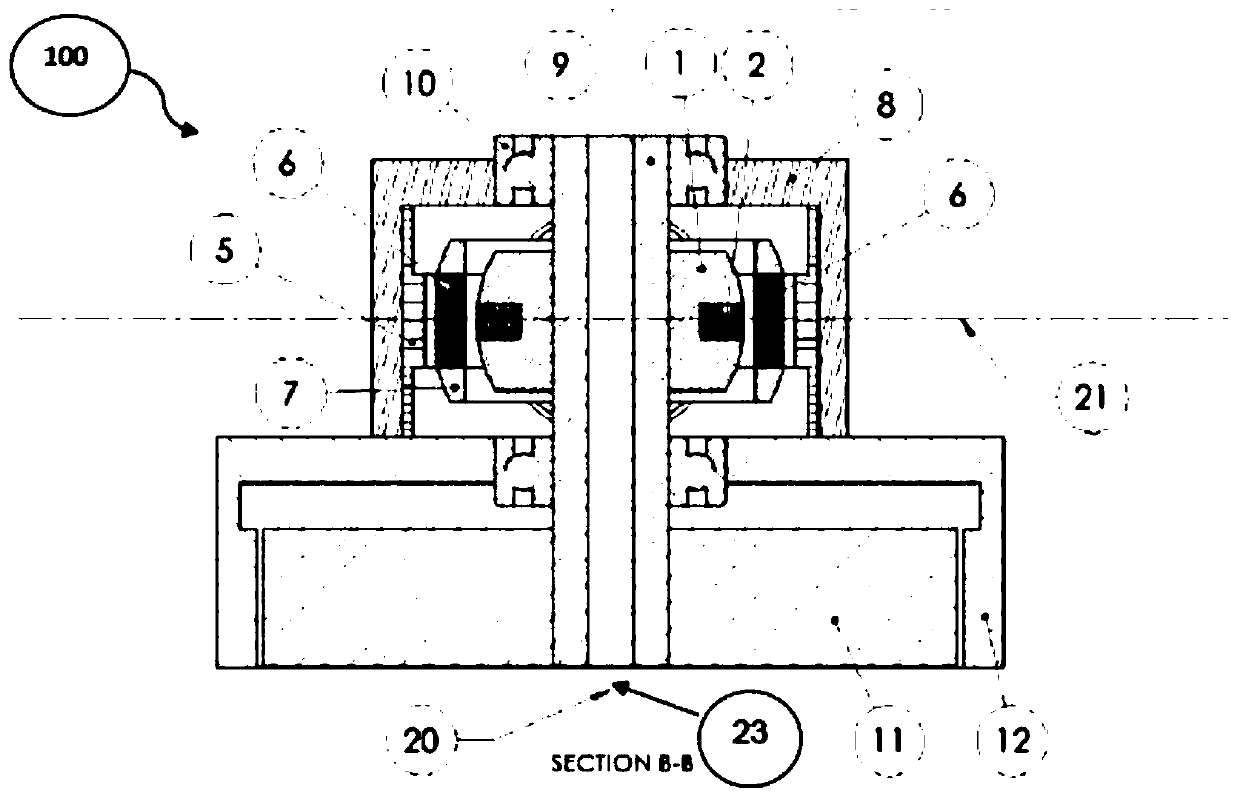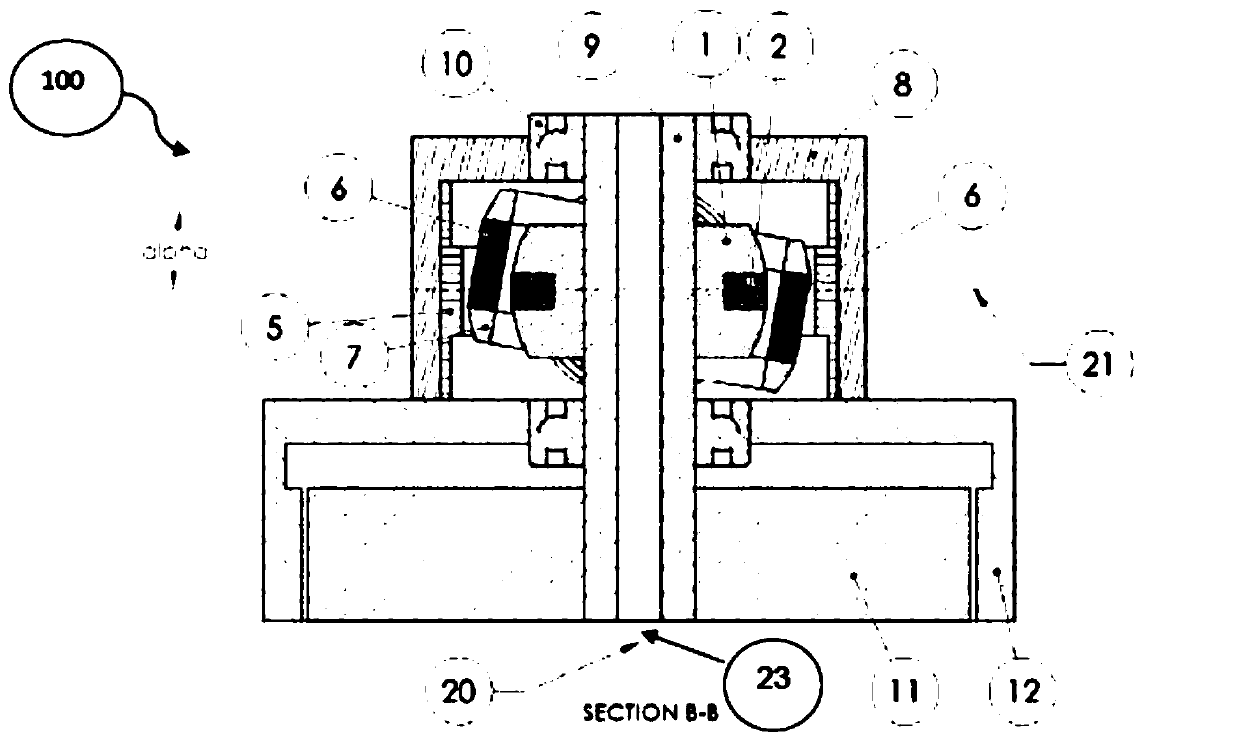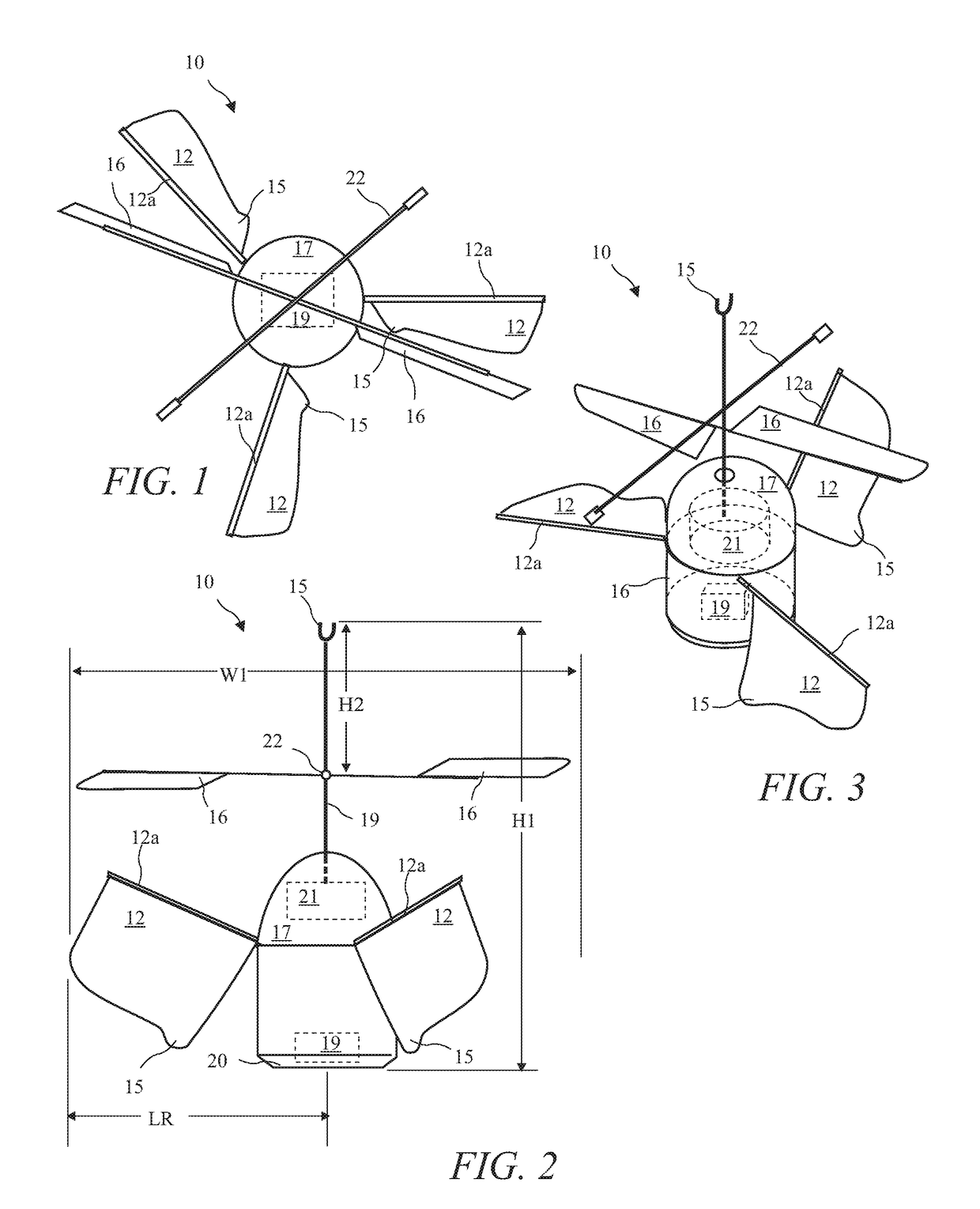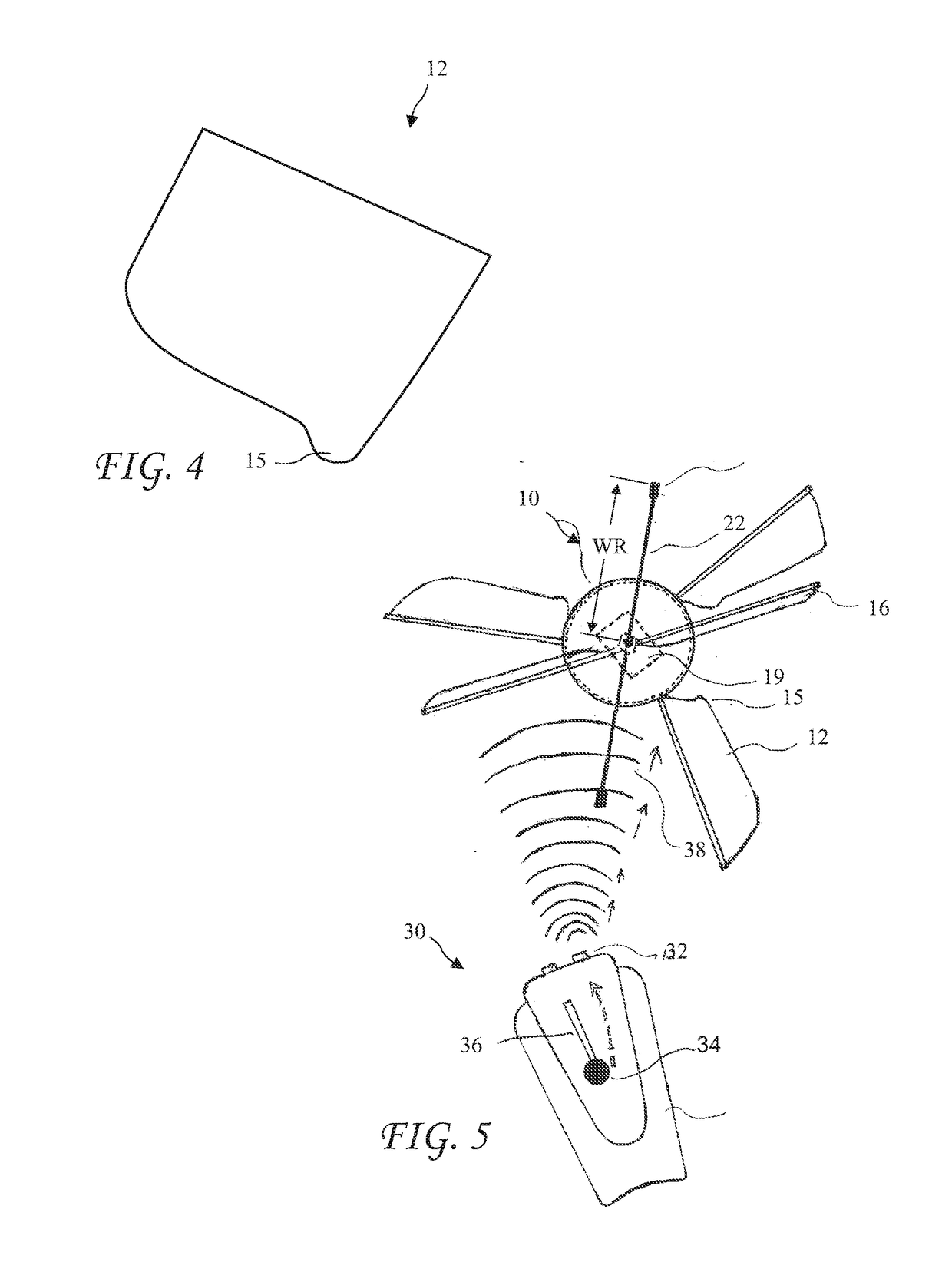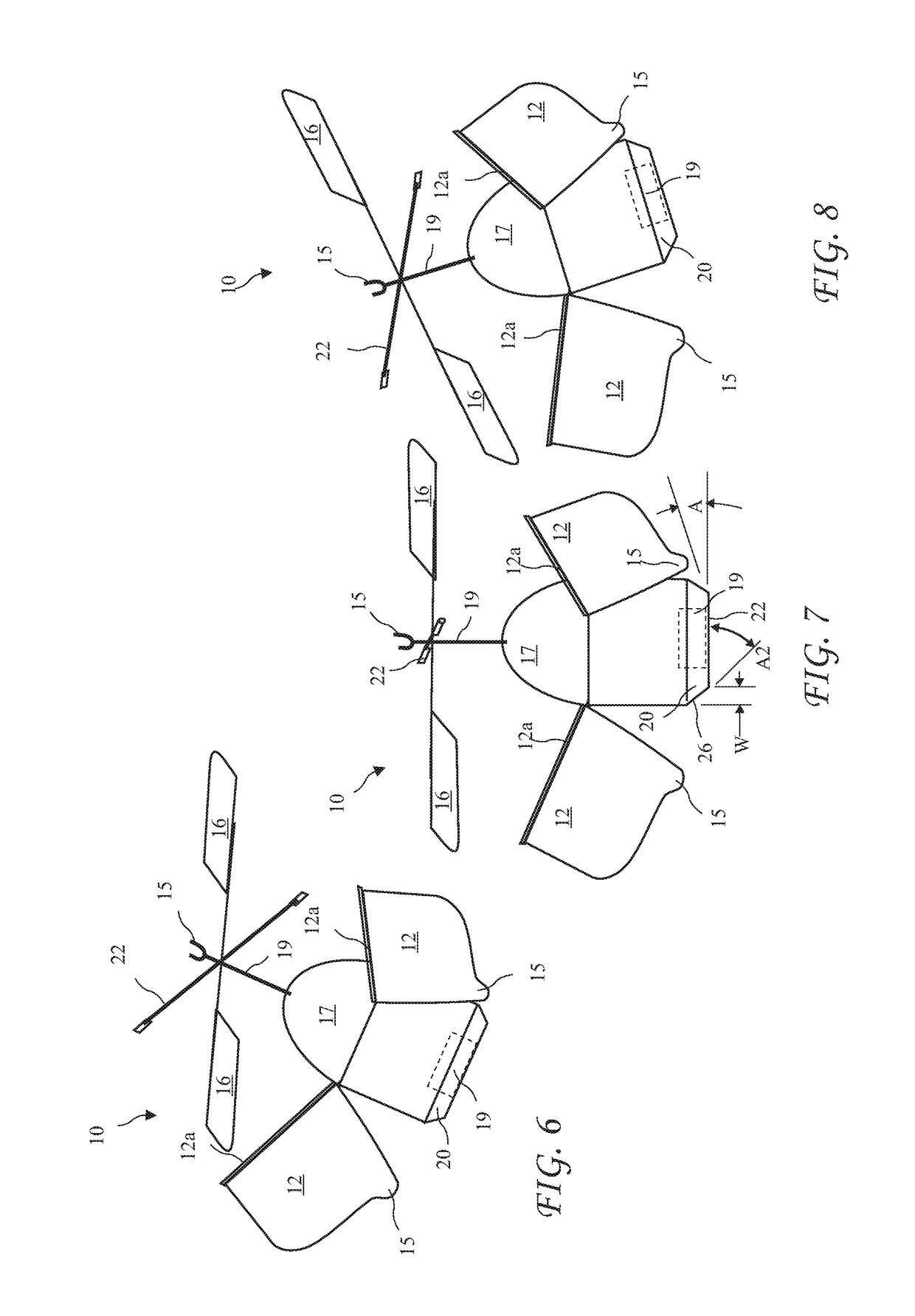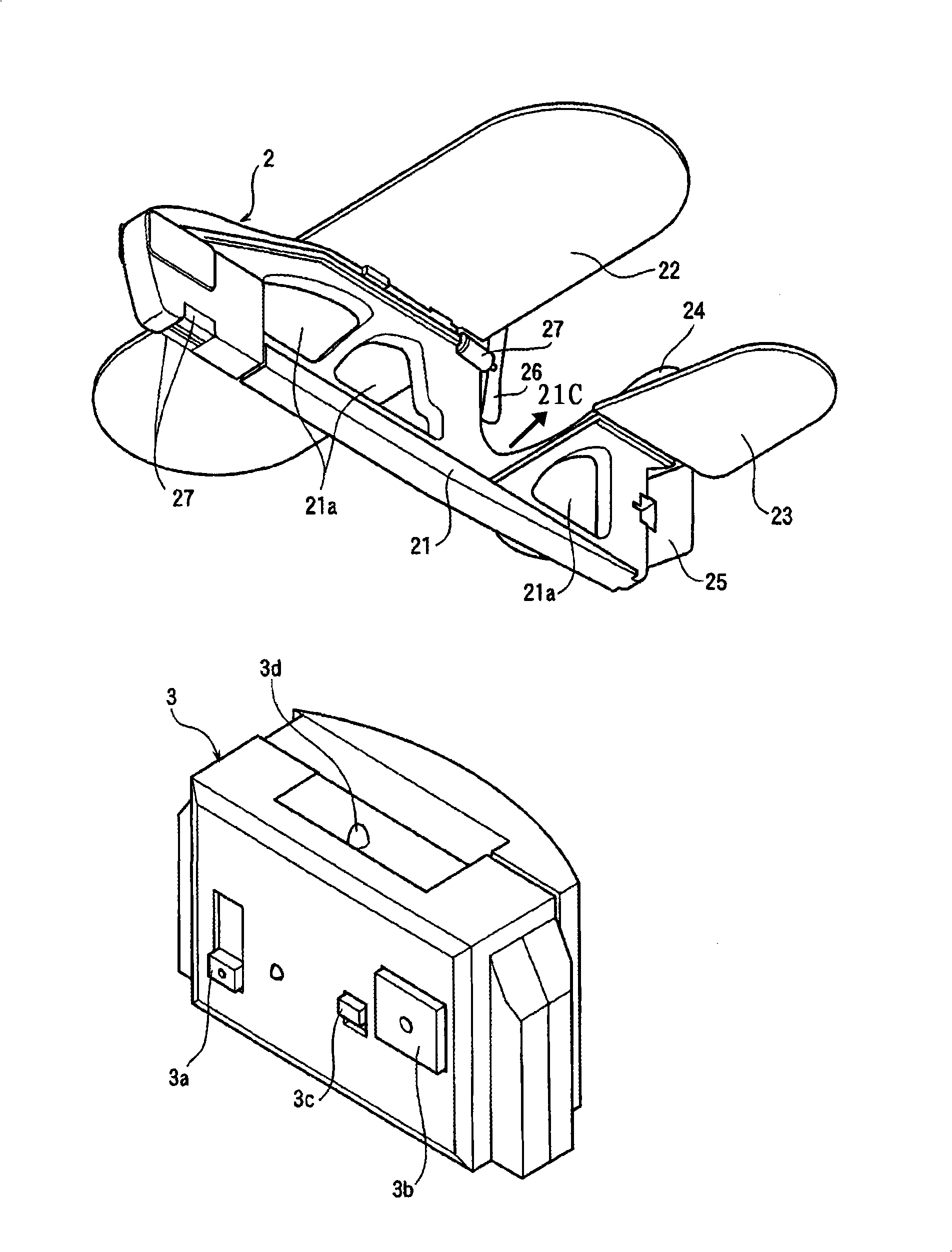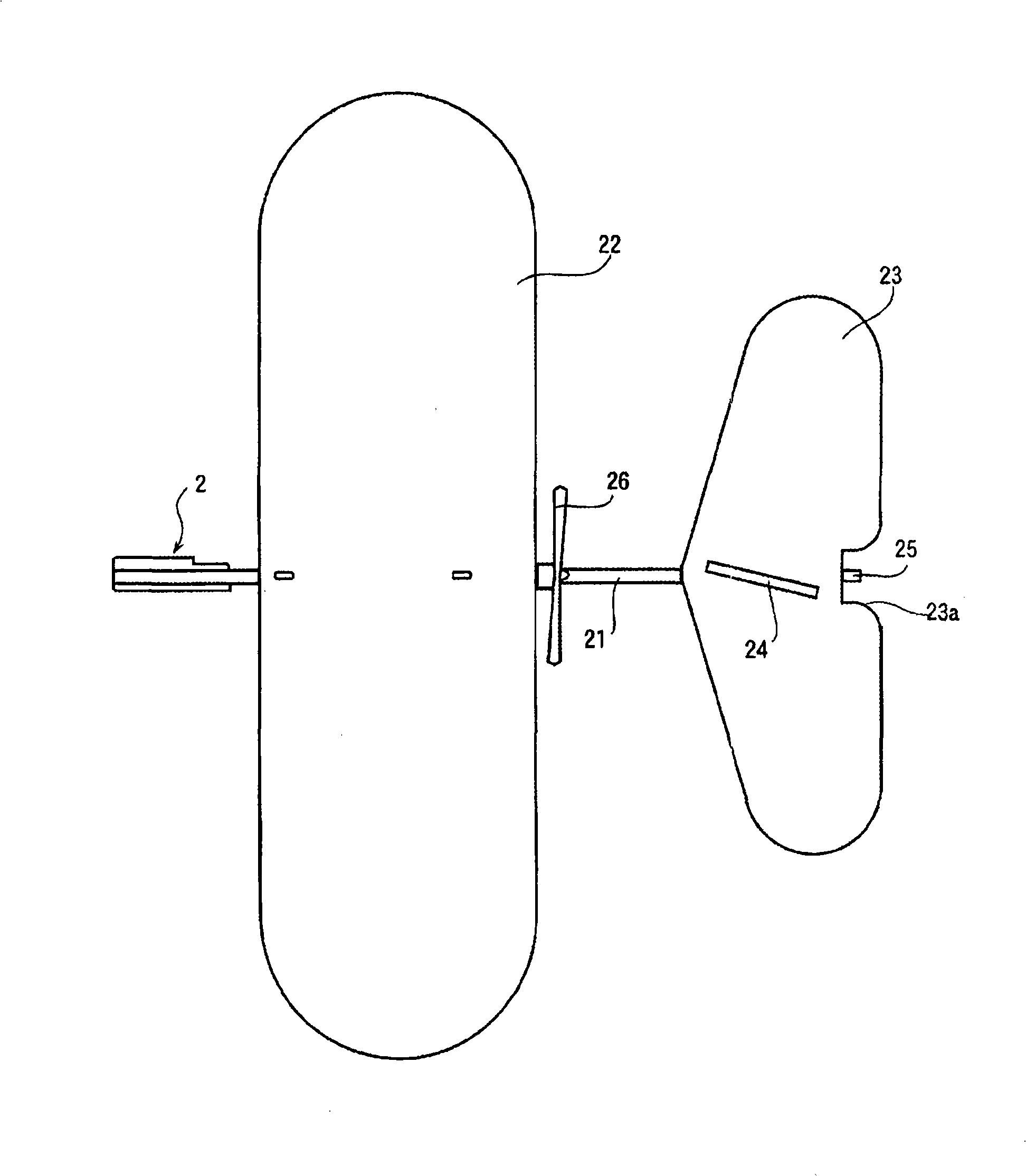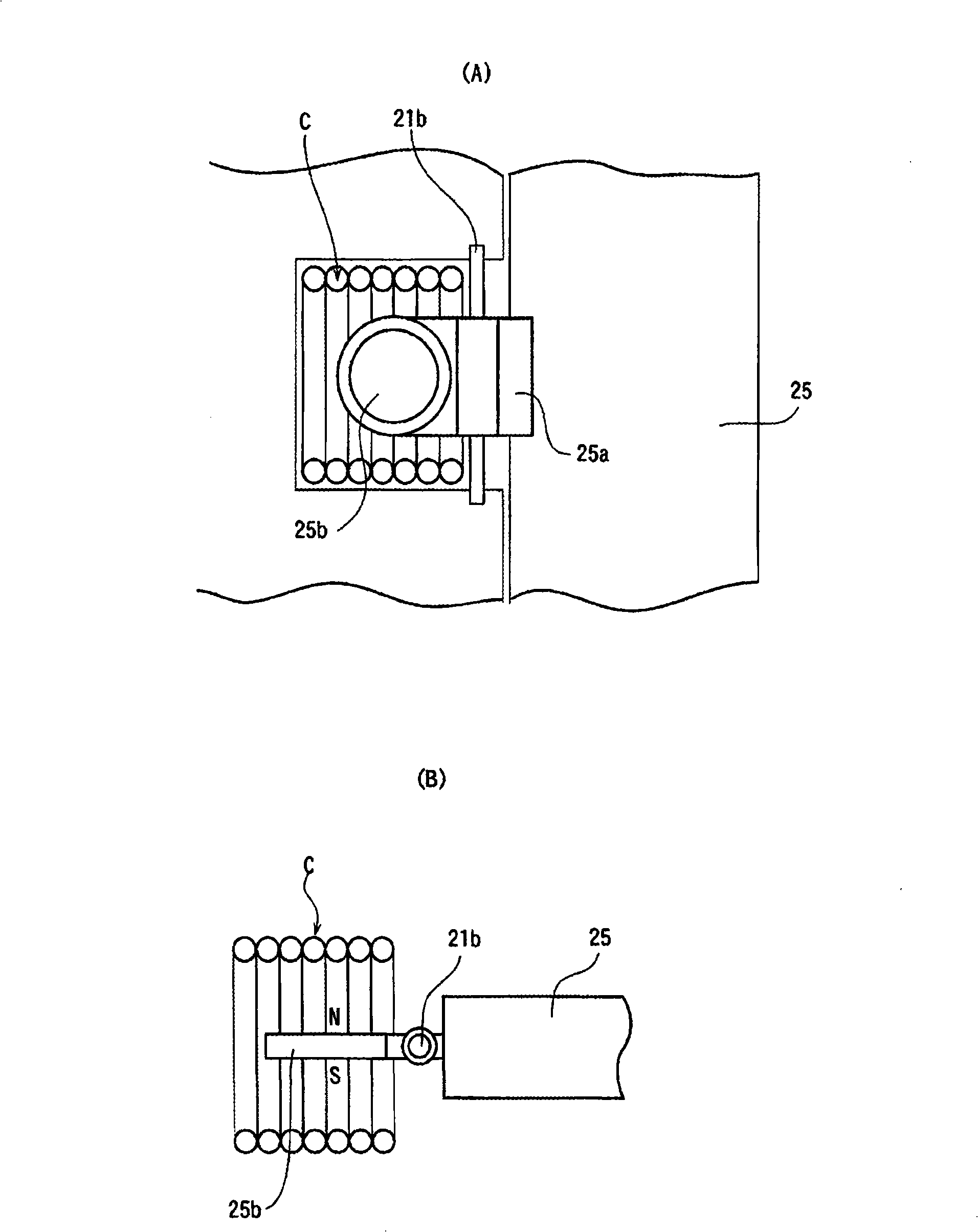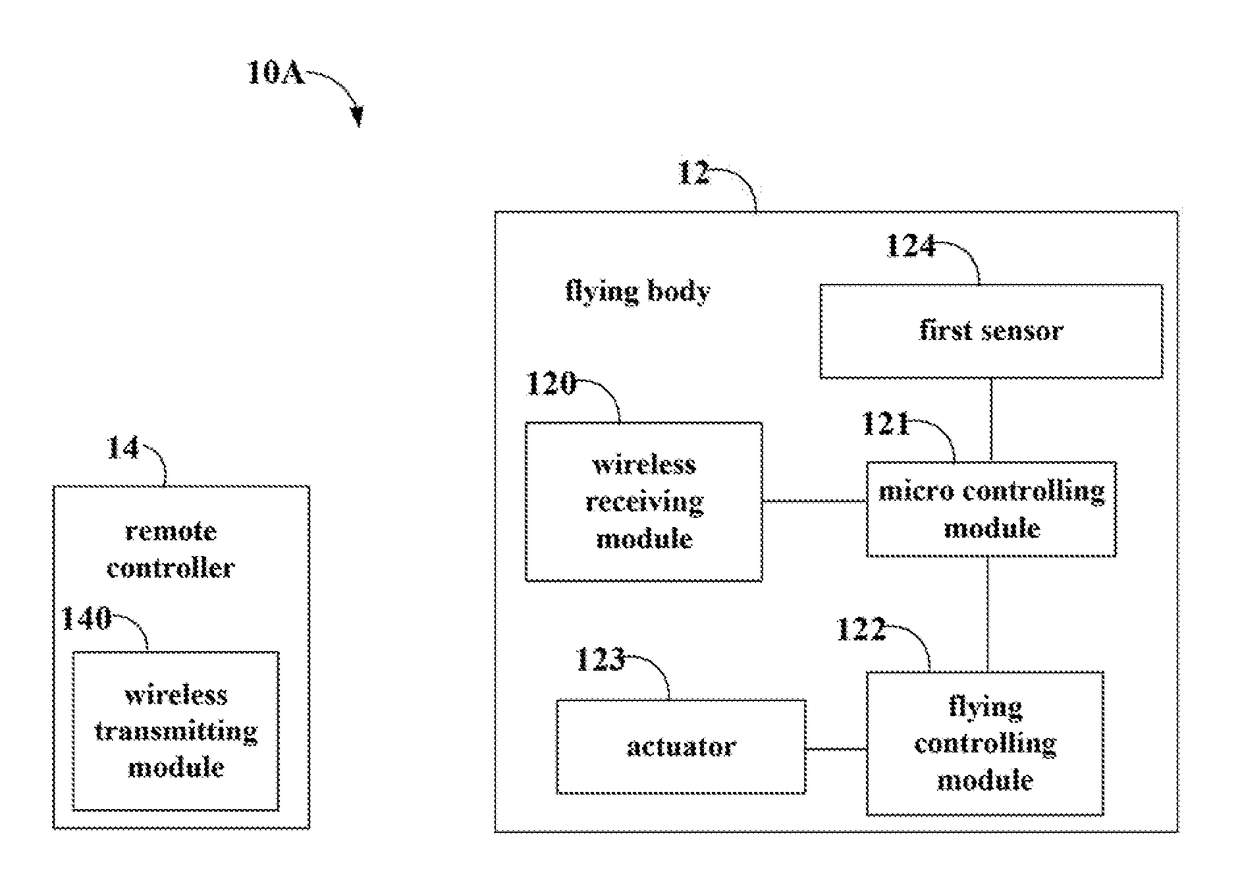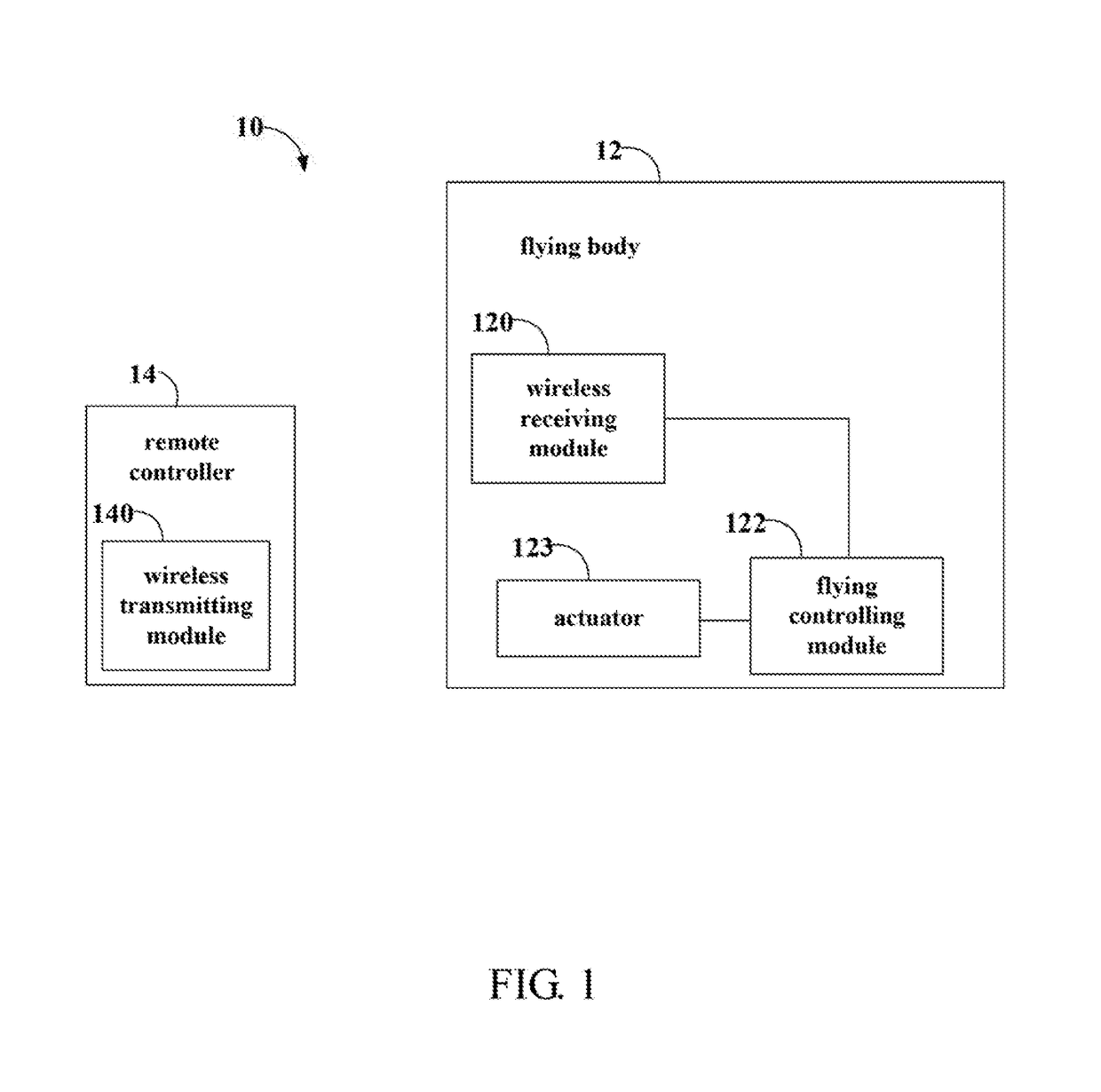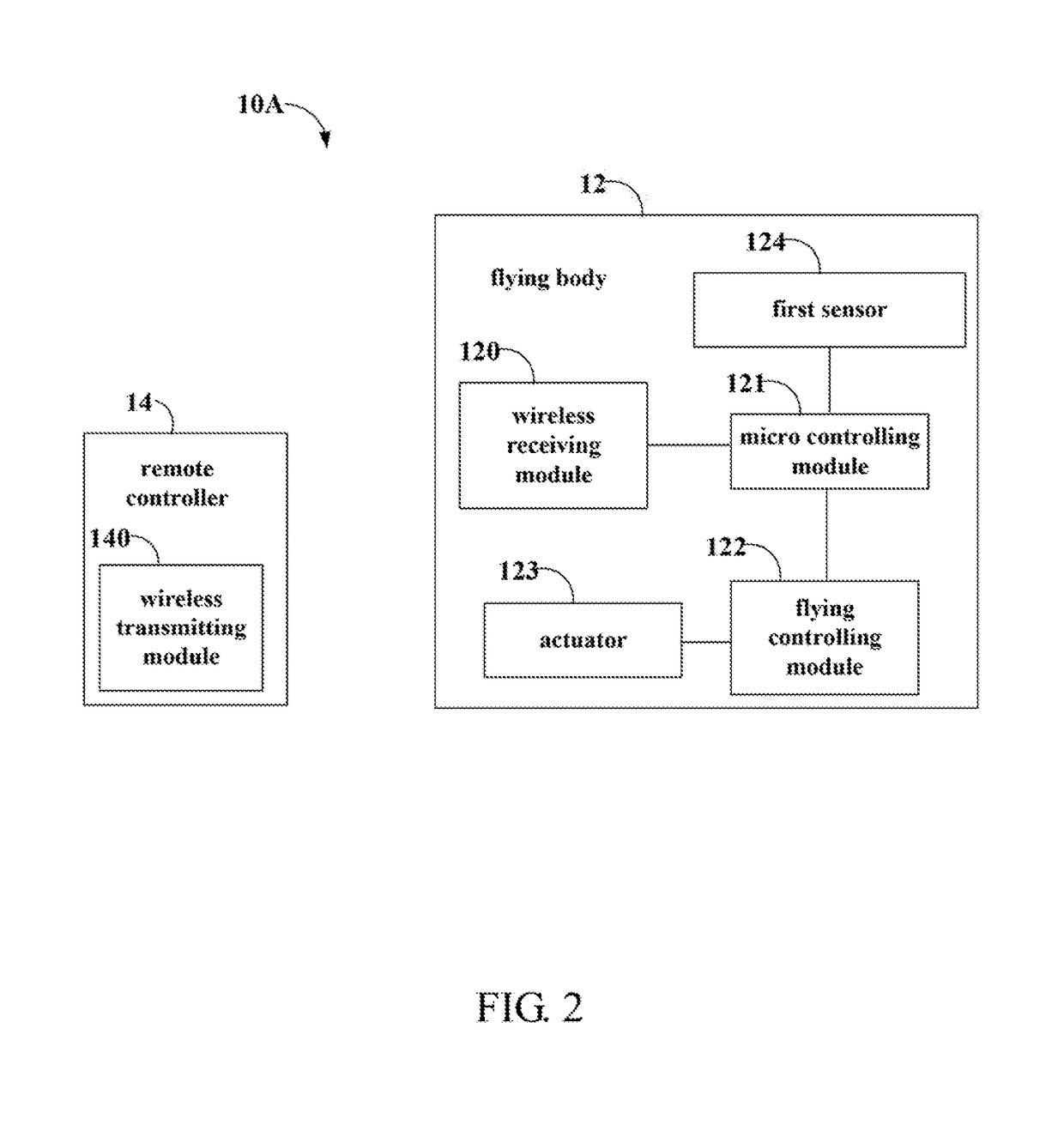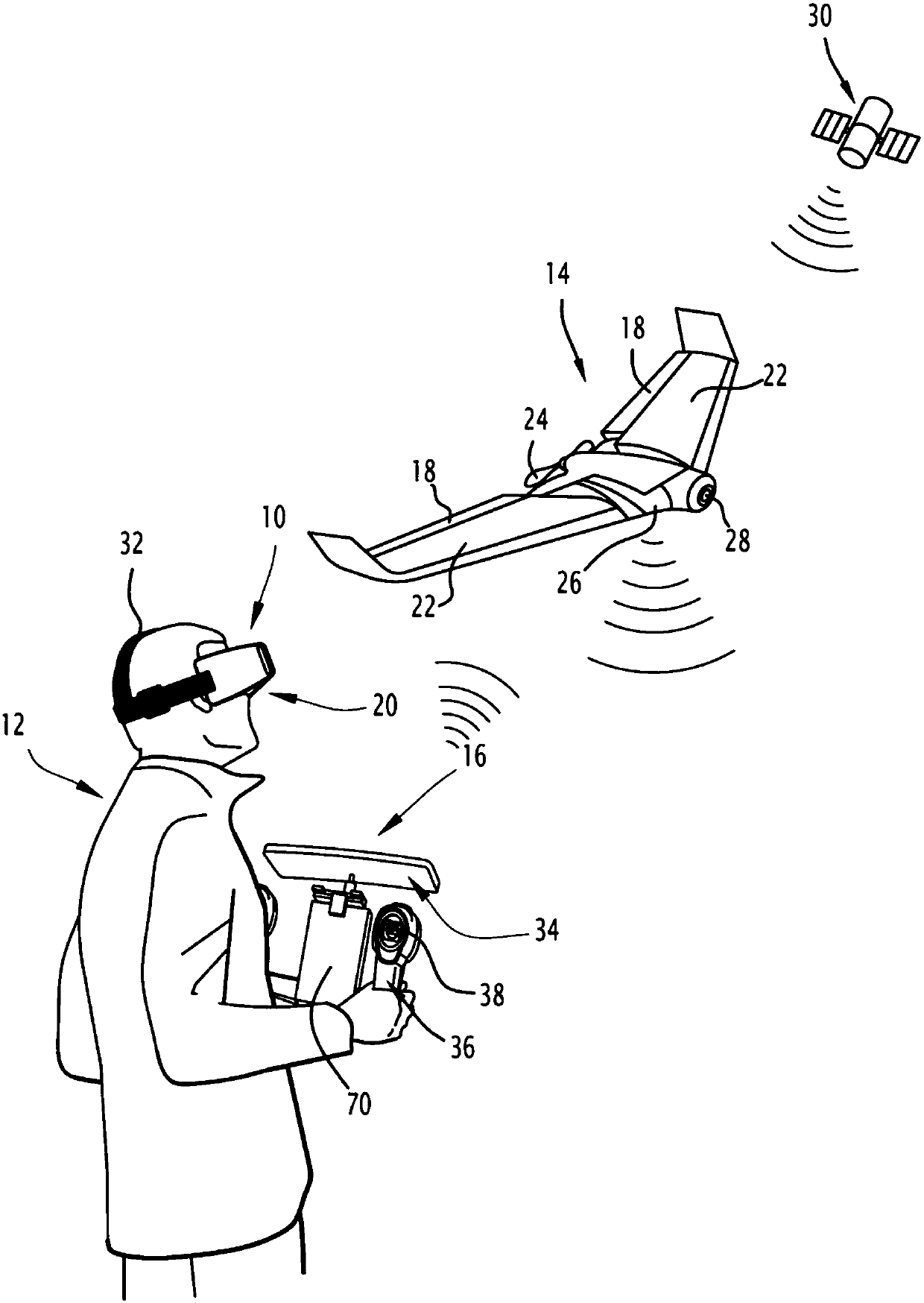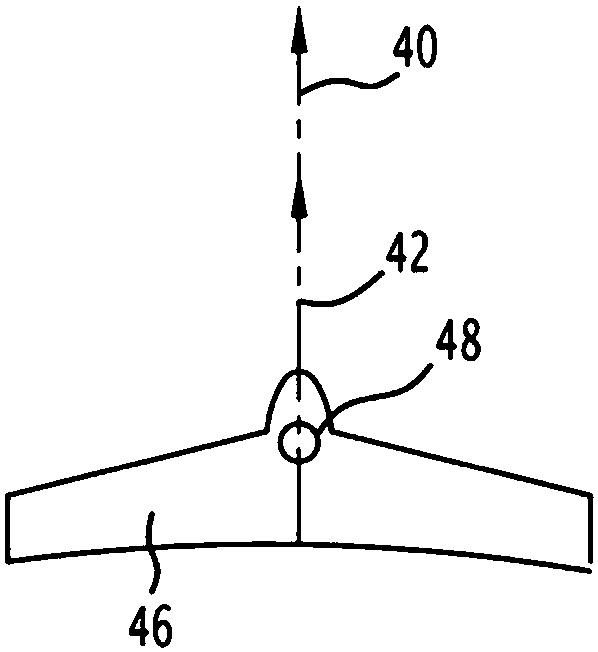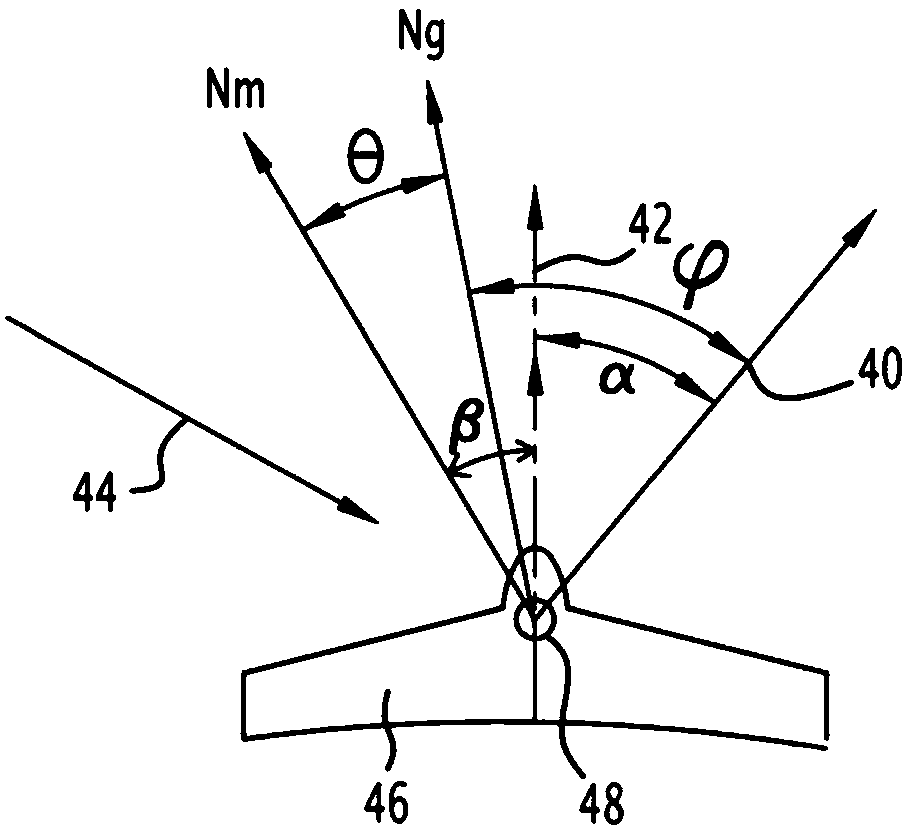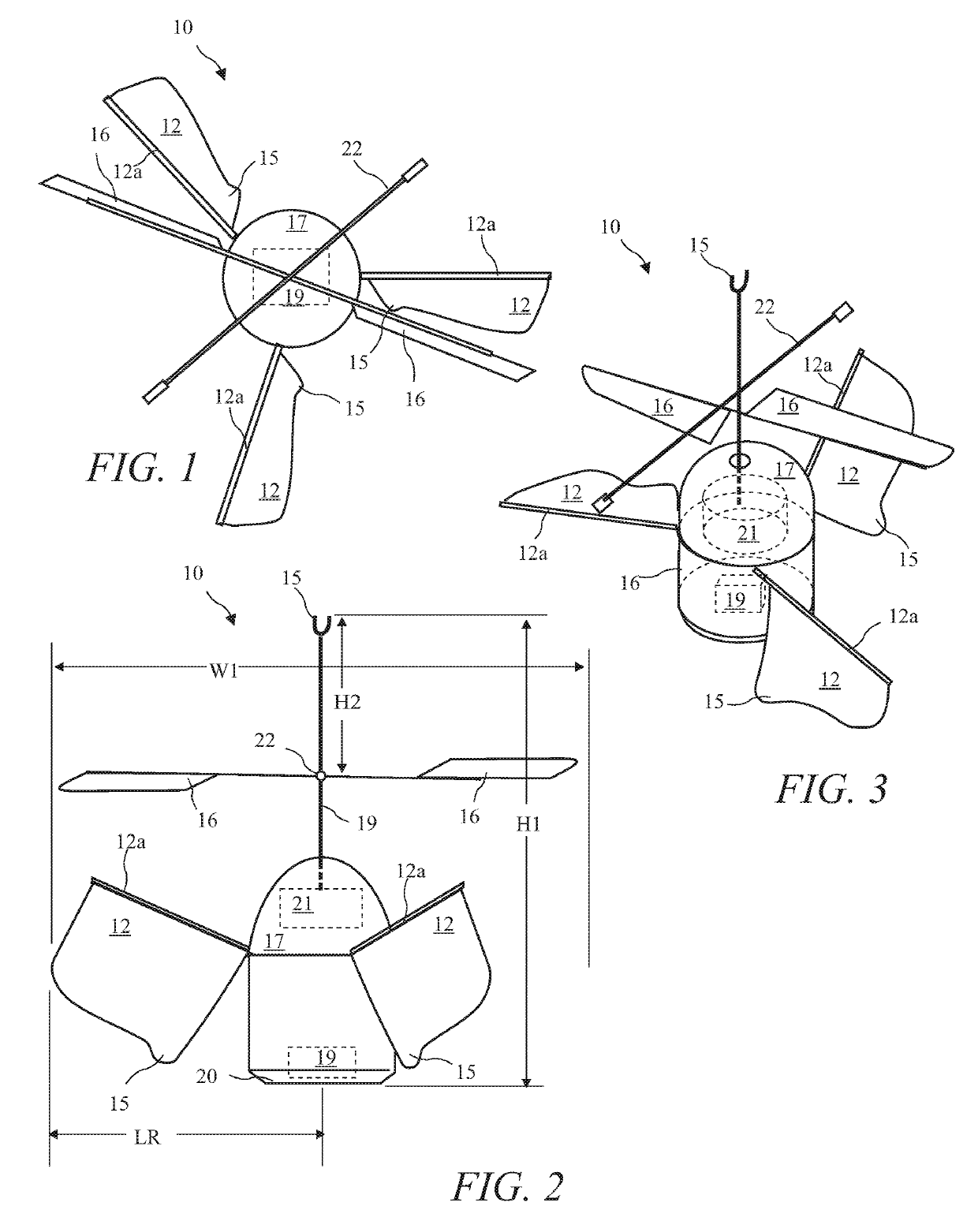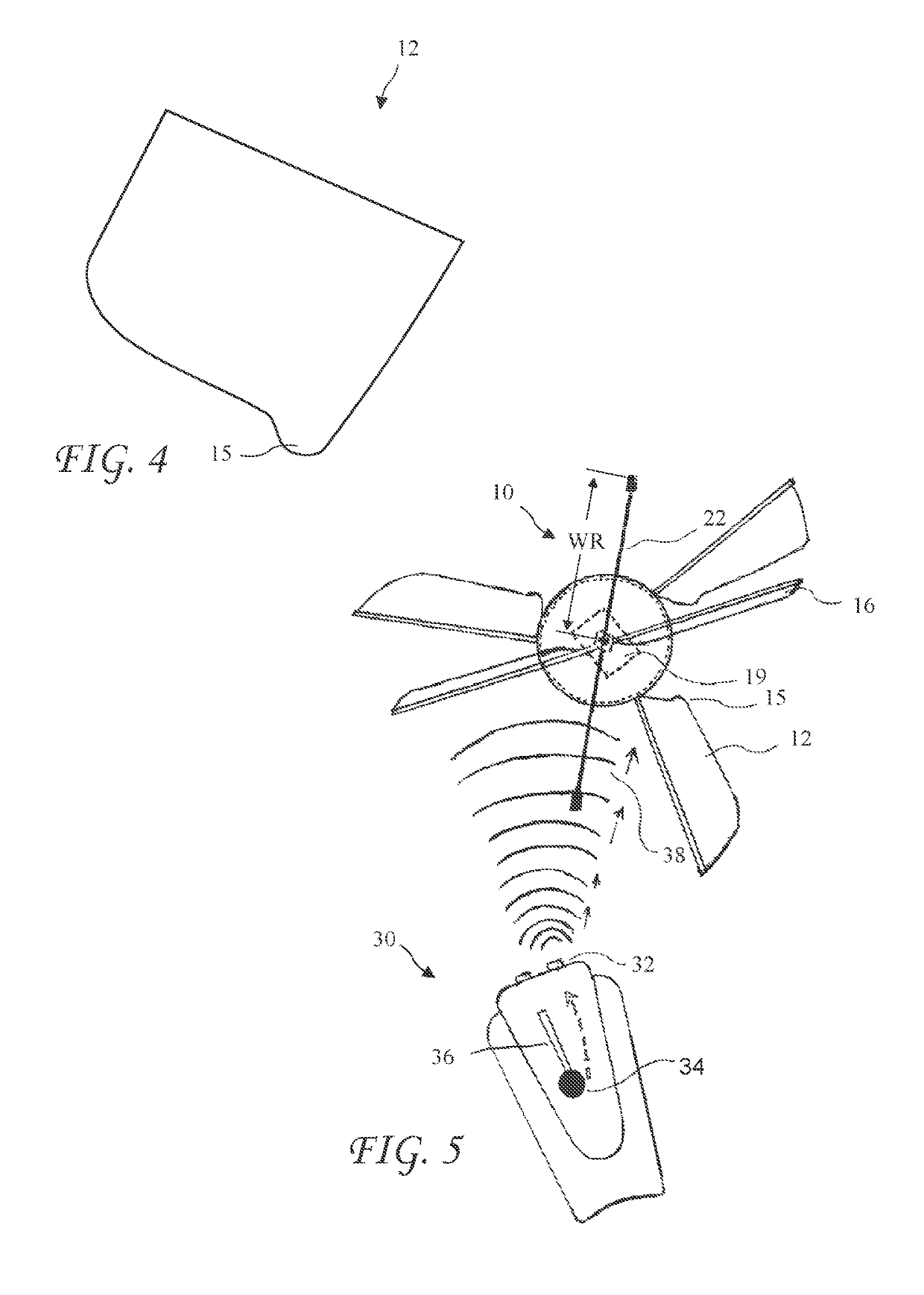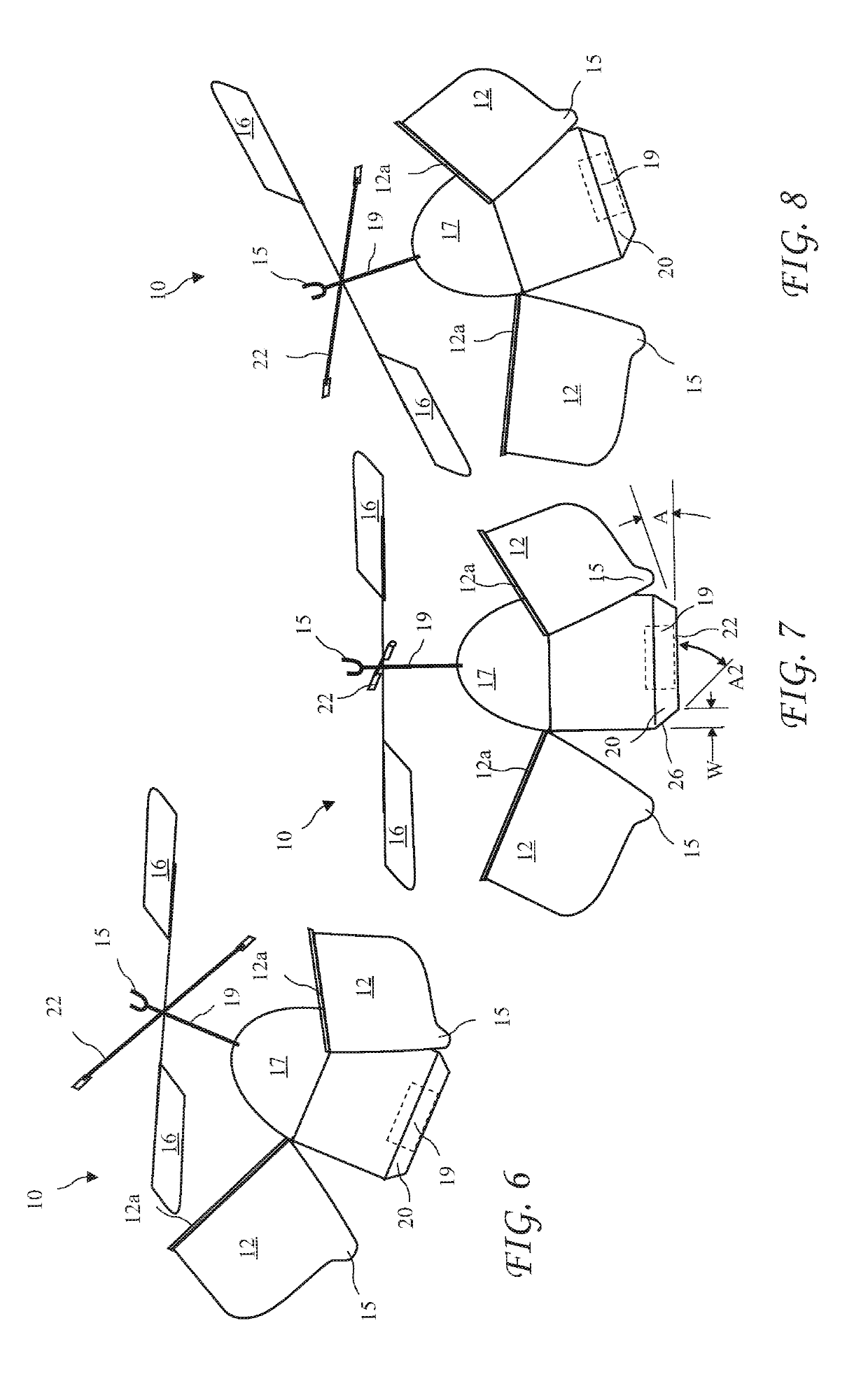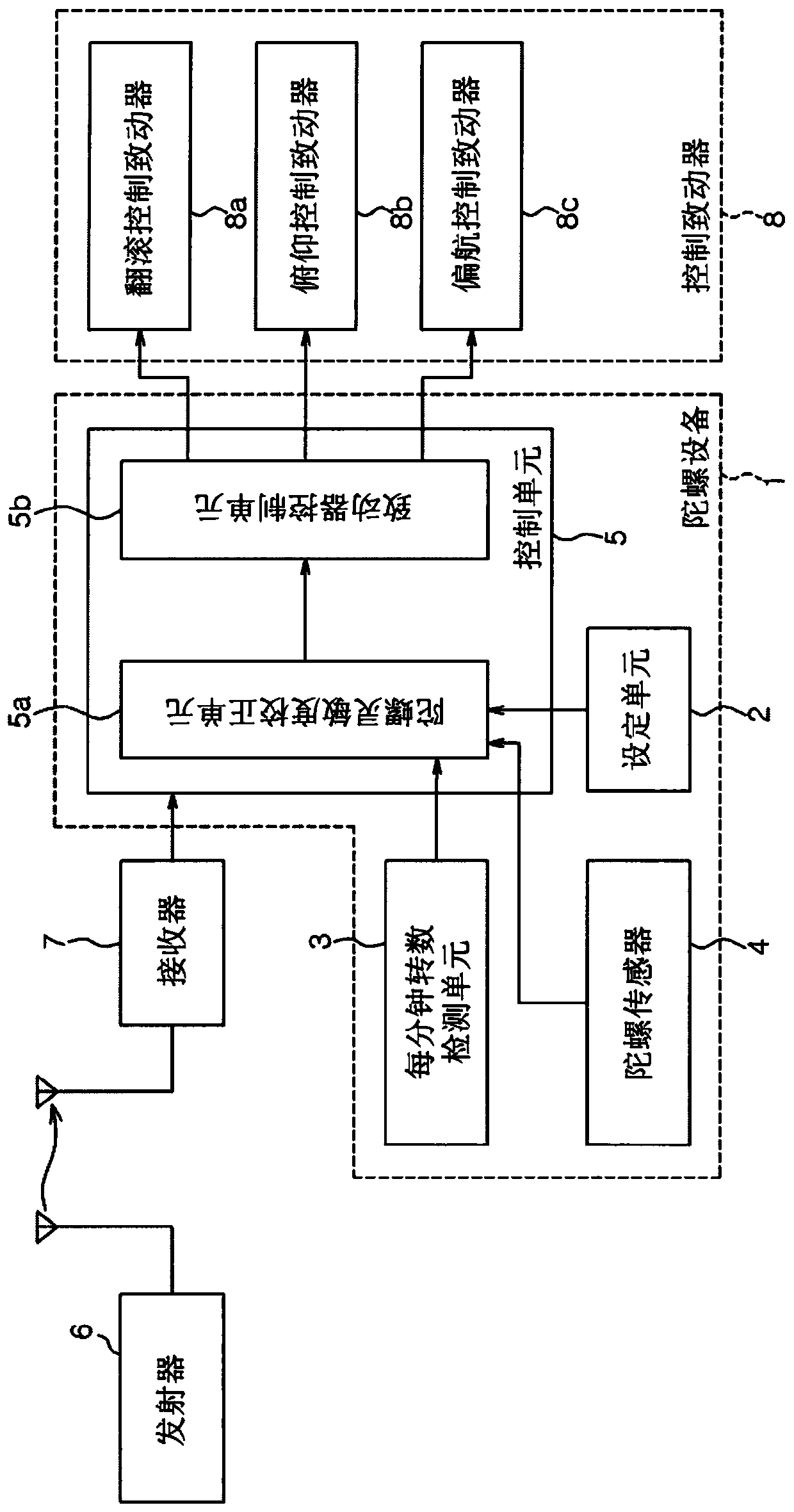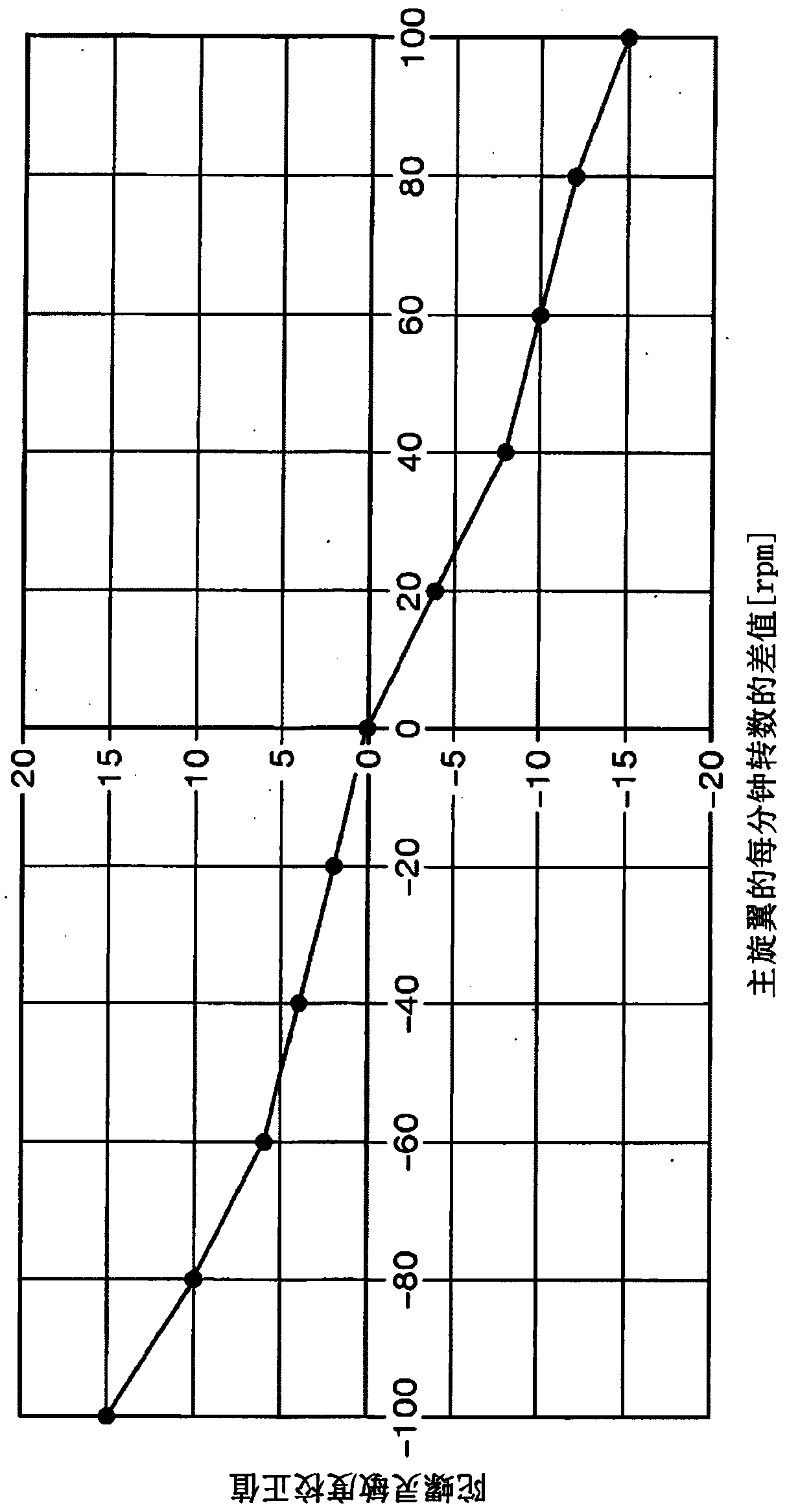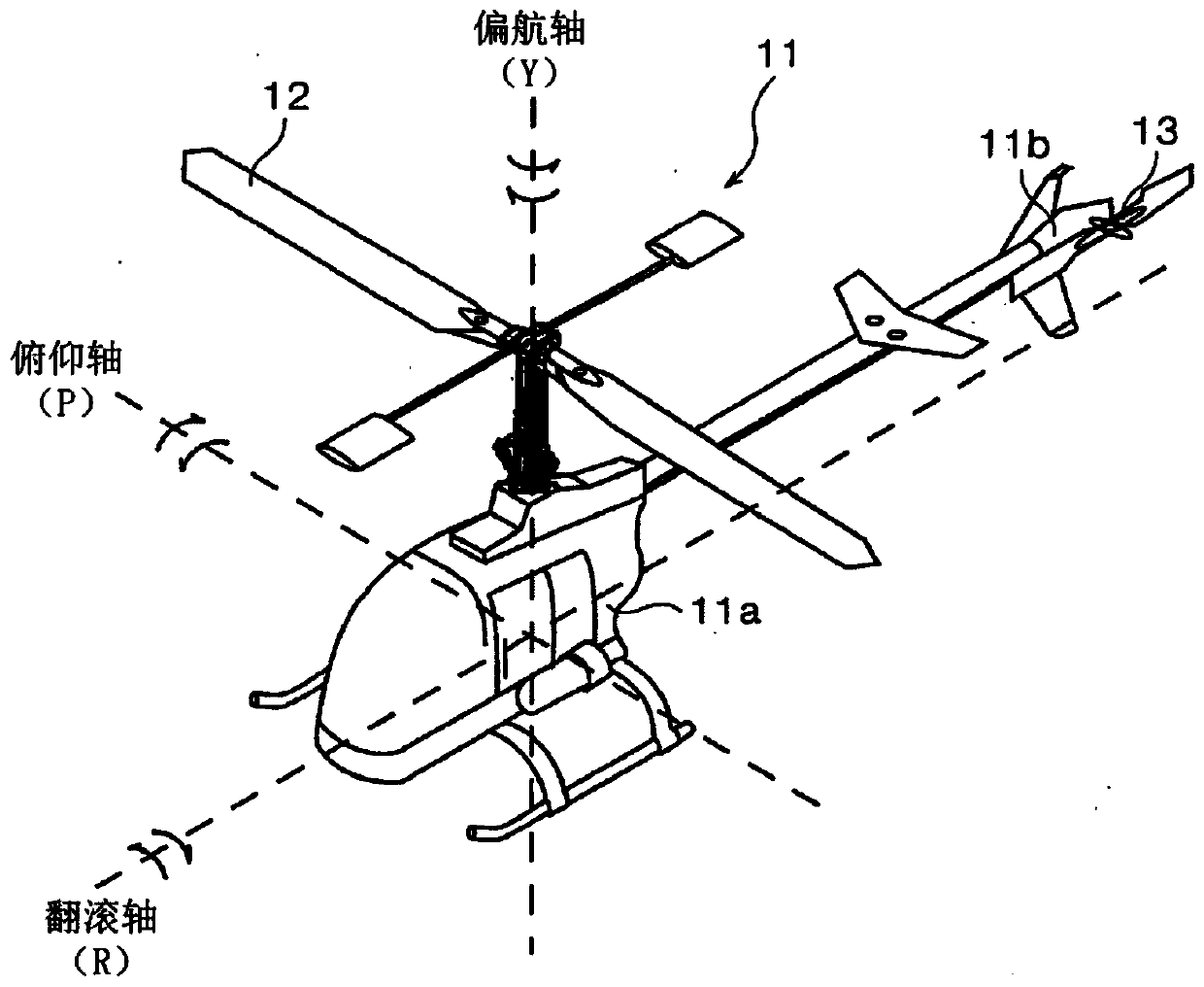Patents
Literature
34results about "Model aircraft" patented technology
Efficacy Topic
Property
Owner
Technical Advancement
Application Domain
Technology Topic
Technology Field Word
Patent Country/Region
Patent Type
Patent Status
Application Year
Inventor
Using handheld device to control flying object
InactiveUS20140008496A1Prevent crashLanding safetyModel aircraftActuated automaticallyFree fallingGyroscope
Method and system for remote control of a drone helicopter and RC plane using a handheld device is disclosed. Piloting commands and actions are performed using the handheld device, which includes a motion sensor module, with gyro-sensor and g-sensor for controlling roll, yaw and pitch of flying object under relative or absolute coordinate system. The gyro-sensor controls both heading and rotation of flying object in place around its yaw by rotating handheld device around its yaw axis; g-sensor controls pitch and roll by rotating handheld device around its pitch axis and roll axes. Upon determining free falling of flying object, throttle is thereby adjusted so as to land it safely. Flying object further has a camera, and video images are transferred wireless to be displayed on touch screen, and image zoom-in and zoom-out are provided via multi-touch of touch screen. RF and IR capability is included for wireless communication.
Owner:CYWEE GROUP
Remote-control flying copter and method
ActiveUS20140099853A1Easy to useProvide controlModel aircraftSelf-moving toy figuresPropellerDistal portion
A hovering remote-control flying craft having a molded frame assembly includes a plurality of arms extending from a center body with an electric motor and corresponding propeller on each arm. In various embodiments, the motor and propeller are mounted downward-facing at a distal portion of each arm with a motor cover over the motor. The center body can be formed of a two-piece molded structure that sandwiches a circuit board to provide structural support for the frame. The circuit board can include a plurality of tabs that facilitate mounting of wire connectors, and can also provide antennas and emitters for both IR and RF communications. In some embodiments, a removable safety ring protects the propellers from lateral contact.
Owner:QFO LABS
Method of piloting a multiple rotor rotary-wing drone to follow a curvilinear turn
InactiveUS8473125B2Reduce number of degree of freedomModel aircraftPropellersRemote controlUncrewed vehicle
The respective motors of the drone (10) can be controlled to rotate at different speeds in order to pilot the drone both in attitude and speed. A remote control appliance produces a command to turn along a curvilinear path, this command comprising a left or right turning direction parameter and a parameter that defines the radius of curvature of the turn. The drone receives said command and acquires instantaneous measurements of linear velocity components, of angles of inclination, and of angular speeds of the drone. On the basis of the received command and the acquired measurements, setpoint values are generated for a control loop for controlling motors of the drone, these setpoint values controlling horizontal linear speed and inclination of the drone relative to a frame of reference associated with the ground so as to cause the drone to follow curvilinear path (C) at predetermined tangential speed (u).
Owner:PARROT
Remote-control flying copter and method
ActiveUS9004973B2Increase awarenessFlight safetyModel aircraftSelf-moving toy figuresDistal portionRemote control
A hovering remote-control flying craft having a molded frame assembly includes a plurality of arms extending from a center body with an electric motor and corresponding propeller on each arm. In various embodiments, the motor and propeller are mounted downward-facing at a distal portion of each arm with a motor cover over the motor. The center body can be formed of a two-piece molded structure that sandwiches a circuit board to provide structural support for the frame. The circuit board can include a plurality of tabs that facilitate mounting of wire connectors, and can also provide antennas and emitters for both IR and RF communications. In some embodiments, a removable safety ring protects the propellers from lateral contact.
Owner:QFO LABS
Aerial vehicles and methods of use
An aerial vehicle capable of convertible flight from hover to linear flight includes a body having a longitudinal body axis, a plurality of forward wings, a plurality of aft wings, at least one motor, and at least three aerodynamic propulsors driven by the at least one motor. Each forward wing extends a forward wing plane. Each aft wing extends from an aft wing plane. The aerodynamic propulsors are mounted longitudinally between the plurality of forward wings and plurality of aft wings.
Owner:UNIVERSITY OF KANSAS
Controlled flight of a multicopter experiencing a failure affecting an effector
ActiveUS20160107751A1Improving and simplifying designAvoid excessive massModel aircraftUnmanned aerial vehiclesAngular velocityEngineering
According to a first aspect of the invention, there is provided a method for operating a multicopter experiencing a failure during flight, the multicopter comprising a body, and at least four effectors attached to the body, each operable to produce both a torque and a thrust force which can cause the multicopter to fly when not experiencing said failure. The method may comprise the step of identifying a failure wherein the failure affects the torque and / or thrust force produced by an effector, and in response to identifying a failure carrying out the following steps, (1) computing an estimate of the orientation of a primary axis of said body with respect to a predefined reference frame, wherein said primary axis is an axis about which said multicopter rotates when flying, (2) computing an estimate of the angular velocity of said multicopter, (3) controlling one or more of said at least four effectors based on said estimate of the orientation of the primary axis of said body with respect to said predefined reference frame and said estimate of the angular velocity of the multicopter. The step of controlling one or more of said at least four effectors may be performed such that (a) said one or more effectors collectively produce a torque along said primary axis and a torque perpendicular to said primary axis, wherein (i) the torque along said primary axis causes said multicopter to rotate about said primary axis, and (ii) the torque perpendicular to said primary axis causes said multicopter to move such that the orientation of said primary axis converges to a target orientation with respect to said predefined reference frame, and (b) such that said one or more effectors individually produce a thrust force along said primary axis.
Owner:ETH ZZURICH
Sided performance coaxial vertical takeoff and landing (VTOL) UAV and pitch stability technique using oblique active tilting (OAT)
InactiveUS20130105620A1Increasing thrust and power capabilityReduce total powerModel aircraftPropellersRotational axisGyroscopic moment
A system for increasing the thrust and power capabilities of a side by side vertical takeoff and landing vehicle and to optimize the coaxial rotor performance. The system including a first coaxial rotor spaced from an aircraft body and a second coaxial rotor spaced from the aircraft body and opposite the first coaxial rotor. The first coaxial rotor having a first top propeller aligned with a first bottom propeller along a first rotational axis. The second coaxial rotor having a second top propeller aligned with a second bottom propeller along a second rotational axis. A gyroscopic moment to maintain pitch stability is controlled by modulating the first and second top propellers having a different angular speed or different torque from the first and second bottom propellers and tilting the first and second coaxial rotors towards the central axis with a common tilt angle and a common tilt rate.
Owner:KING ABDULLAH II DESIGN & DEV BUREAU
Controlled flight of a multicopter experiencing a failure affecting an effector
ActiveUS9856016B2Improving and simplifying designAvoid excessive massModel aircraftUnmanned aerial vehiclesAngular velocityEngineering
According to a first aspect of the invention, there is provided a method for operating a multicopter experiencing a failure during flight, the multicopter comprising a body, and at least four effectors attached to the body, each operable to produce both a torque and a thrust force which can cause the multicopter to fly when not experiencing said failure. The method may comprise the step of identifying a failure wherein the failure affects the torque and / or thrust force produced by an effector, and in response to identifying a failure carrying out the following steps, (1) computing an estimate of the orientation of a primary axis of said body with respect to a predefined reference frame, wherein said primary axis is an axis about which said multicopter rotates when flying, (2) computing an estimate of the angular velocity of said multicopter, (3) controlling one or more of said at least four effectors based on said estimate of the orientation of the primary axis of said body with respect to said predefined reference frame and said estimate of the angular velocity of the multicopter. The step of controlling one or more of said at least four effectors may be performed such that (a) said one or more effectors collectively produce a torque along said primary axis and a torque perpendicular to said primary axis, wherein (i) the torque along said primary axis causes said multicopter to rotate about said primary axis, and (ii) the torque perpendicular to said primary axis causes said multicopter to move such that the orientation of said primary axis converges to a target orientation with respect to said predefined reference frame, and (b) such that said one or more effectors individually produce a thrust force along said primary axis.
Owner:ETH ZZURICH
VTOL propulsion for aircraft
ActiveUS8960592B1Enable stabilizationGood effectModel aircraftAircraft navigation controlFlight vehicleSpray nozzle
An aircraft, such as a radio controlled aircraft, capable of vertical take-off and landing. The aircraft has a compressor in a fuselage that contains an interconnected first and second fans driven by a motor. An intake provides air to the first fan, while a bypass duct directs airflow to the second fan. Air flow from the first fan to the second fan is controlled by a valve, which is operated in tandem with doors in the bypass duct. Nozzles direct air flow out of the compressor in a selected one of a vertical or non-vertical direction for conventional flight or for hover. Hover tubes are provided to adjust the aircraft in pitch, yaw and roll. The hover tubes operate simultaneously with conventional flight controls.
Owner:CONCEPT AIRCRAFT LLC
Sided performance coaxial vertical takeoff and landing (VTOL) UAV and pitch stability technique using oblique active tilting (OAT)
InactiveUS8931729B2Increasing thrust and power capabilityReduce total powerModel aircraftPropellersRotational axisPower capability
A system for increasing the thrust and power capabilities of a side-by-side vertical takeoff and landing vehicle to optimize the coaxial rotor performance. The system includes a first coaxial rotor spaced from an aircraft body and a second coaxial rotor spaced from the aircraft body and opposite the first coaxial rotor. The first coaxial rotor has a first top propeller aligned with a first bottom propeller along a first rotational axis. The second coaxial rotor having a second top propeller aligned with a second bottom propeller along a second rotational axis. A gyroscopic moment to maintain pitch stability is controlled by modulating the first and second top propellers, which have a different angular speed or different torque from the first and second bottom propellers, and tilting the first and second coaxial rotors towards the central axis with a common tilt angle and a common tilt rate.
Owner:KING ABDULLAH II DESIGN & DEV BUREAU
Integrated control/command module for a flying drone
InactiveUS20180039272A1Streamline designStreamline manufactureModel aircraftAutonomous decision making processPower flowComputer module
A module for a drone that integrates an electronic circuit and one or more sensors for the attitude, altitude, speed, orientation and / or position of the drone in the same one-piece housing. The module also integrates an electronic power circuit that receives set command values prepared by the processor of the electronic circuit on the basis of the data provided by the integrated sensors and provides, as an output, corresponding signals for directly supplying current or voltage to the propulsion means of the drone and to the control surfaces.
Owner:PARROT
Self-righting aeronautical vehicle and method of use
ActiveUS10112694B2Reduce structural stiffnessArea minimizationModel aircraftFuselage framesAviationVertical axis
A self-righting aeronautical vehicle comprising a hollowed frame and a lift mechanism. The exterior of the frame and center of gravity are adapted to self-right the vehicle. The frame can include sealed, hollowed sections for use in bodies of water. The frame can be spherical in shape enabling inspection of internal surface of partially or fully enclosed structures. Inspection equipment can be integrated into the vehicle and acquired data can be stored or wirelessly communicated to a server. A controlled or other mass can be pivotally assembled to a pivot axle spanning across the interior of the frame. The pivot axis can rotate about a vertical axis (an axis perpendicular to the elongated axis). The propulsion mechanisms can be adapted for use as a terrestrial vehicle when enclosed in a sealed spherical shell.
Owner:ADVANCED AERODYNAMICS
Aerial vehicles and methods of use
An aerial vehicle capable of convertible flight from hover to linear flight includes a body having a longitudinal body axis, a plurality of forward wings, a plurality of aft wings, at least one motor, and at least three aerodynamic propulsors driven by the at least one motor. Each forward wing extends a forward wing plane. Each aft wing extends from an aft wing plane. The aerodynamic propulsors are mounted longitudinally between the plurality of forward wings and plurality of aft wings.
Owner:UNIVERSITY OF KANSAS
Remote Control System and Method and Usage Related to Such a System
ActiveUS20150301528A1Easy retrievalStrategy is limitedModel aircraftRemote controlled aircraftComputer hardwareArea network
The invention relates to a remote control system (195) comprising mobile units (190, 1102, 1105), and a by control means (106, 110) provided controller unit for these. Said units are equipped with a function performing means (161) and transferring means (207, 270) that generates information signals (301) respectively transmits the same. Signal processing means (261, 268) and their exerting function (314) for controlling the functions of the respective mobile unit are placed respectively takes place only in the current mobile device. In accordance with the proposed use in connection with the present invention object, a controller area network type of system is constructed with a distributed and integrated network structure (1751). Only signal processing means (1753) and their function exertion means (1754) for controlling of a mobile unit, which is positioned in the actual unit, is used for its control. According to the method establishes a structure of a controller area network type with modular units (1753′), nodes (1753) and a communication protocol (501) for the node communication. All messages transmitted by the nodes are received by the modular units (1754, 1792). A information comparison (1755, 176) is used to select respective message or part thereof.
Owner:KVASER
Self-righting aeronautical vehicle and method of use
A self-righting aeronautical vehicle comprising a hollowed frame and a lift mechanism. The exterior of the frame and center of gravity are adapted to self-right the vehicle. The frame can include sealed, hollowed sections for use in bodies of water. The frame can be spherical in shape enabling inspection of internal surface of partially or fully enclosed structures. Inspection equipment can be integrated into the vehicle and acquired data can be stored or wireles sly communicated to a server. A controlled or other mass can be pivotally assembled to a pivot axle spanning across the interior of the frame. The pivot axis can rotate about a vertical axis (an axis perpendicular to the elongated axis). The propulsion mechanisms can be adapted for use as a terrestrial vehicle when enclosed in a sealed spherical shell.
Owner:ADVANCED AERODYNAMICS
System for game play with multiple remote-control flying craft with wireless communication
InactiveUS20180008890A1Electric circuit arrangementsWith electric batteriesRemote controlFlight vehicle
A gaming system for enabling three-dimensional game play of remote-control craft controlled by a controller, each craft including a communication system with both radio frequency (RF) and infrared (IR) capabilities. The system can include a plurality of hovering remote-control flying craft each controlled by a handheld controller, and further may include at least one additional game accessory elements, such as a puck, a ground station or a gun. Each pairing of craft and controllers communicate via an RF protocol that transmits at least control communications between the controller and the craft based on pair identification information in an RF communication protocol. The craft and game-accessory elements also communicate via at least an IR protocol that communicates game-play information. Selectable pairs of craft and controllers may be assigned to different teams for playing multiplayer team games based on team identification information in the RF communication protocol.
Owner:QFO LABS
Remote control helicopter toy with double propellers on empennage
InactiveUS20150038045A1Good effectFree rotationModel aircraftToy aircraftsControl circuitAerospace engineering
The present invention discloses a remote control helicopter toy with double propellers on the empennage. The remote control helicopter toy with double propellers on the empennage comprises a helicopter body (100), a power supply, a control circuit board (110), a main propeller device (200) and a tail propeller device (300). The power supply and the control circuit board (110) are disposed inside the helicopter body (100); the main propeller device (200) and the tail propeller device (300) are electrically connected to the control circuit board (110); and the tail propeller device (300) comprises a left propeller (320) and a right propeller (310), which are disposed bilaterally symmetrically in a tail part of the helicopter body (100).
Owner:LIN RIZHUANG
Remote control system and method and usage related to such a system
ActiveUS9529358B2Strategy is limitedEasy to checkModel aircraftUnmanned aerial vehiclesModular unitArea network
The invention relates to a remote control system (195) comprising mobile units (190, 1102, 1105), and a by control means (106, 110) provided controller unit for these. Said units are equipped with a function performing means (161) and transferring means (207, 270) that generates information signals (301) respectively transmits the same. Signal processing means (261, 268) and their exerting function (314) for controlling the functions of the respective mobile unit are placed respectively takes place only in the current mobile device. In accordance with the proposed use in connection with the present invention object, a controller area network type of system is constructed with a distributed and integrated network structure (1751). Only signal processing means (1753) and their function exertion means (1754) for controlling of a mobile unit, which is positioned in the actual unit, is used for its control. According to the method establishes a structure of a controller area network type with modular units (1753′), nodes (1753) and a communication protocol (501) for the node communication. All messages transmitted by the nodes are received by the modular units (1754, 1792). A information comparison (1755, 176) is used to select respective message or part thereof.
Owner:KVASER
Integrated control/command module for a flying drone
Integrated control / command module for a flying drone. A module for a drone that integrates an electronic circuit (100) and one or more sensors (104-116) for the attitude, altitude, speed, orientationand / or position of the drone in the same one-piece housing (48). The module also integrates an electronic power circuit (200) that receives set command values prepared by the processor of the electronic circuit on the basis of the data provided by the integrated sensors and provides, as an output, corresponding signals for directly supplying current or voltage to the propulsion means of the droneand to the control surfaces.
Owner:PARROT
Portable cockpit yoke assembly for mounting on a radio controlled transmitter used with a model airplane
InactiveUS8740665B1Easy to operateDirect contact guaranteeModel aircraftControlling membersJet aeroplaneJoystick
A cockpit yoke assembly adapted for mounting on top of a RC transmitter for controlling the operation of a model airplane. The yoke assembly includes a first control arm with a throttle knob. The first control arm is attached to a first ball and socket linkage adapted for attachment a first joystick on the transmitter. A rudder control lever is attached to the first control arm. The yoke assembly includes a second control arm with an elevator knob. The second control arm is attached to a second ball and socket linkage adapted for attachment to a second joystick on the transmitter. An aileron control lever is attached to the second control arm. The first and second ball and socket linkage are used for moving the first and second joysticks fore or aft and left or right during the operation of the model airplane.
Owner:BOWERS RICHARD A
Quick release folding propeller blades for a model aircraft
A quick release propeller for model airplanes is disclosed including two or more blades mounted to a hub. For each blade, the hub includes a slot and a shoulder. Each blade includes a base portion having pins which slide into the slot in the hub. The slots are curved which prevents the blades from being removed unless they are rotated at predefined threshold angle with respect to the hub.
Owner:LANDING PROD INC
Portable cockpit yoke assembly
InactiveUS9522726B1Easy to operateDirect contact guaranteeControlling membersModel aircraftJoystickControl arm
A cockpit yoke assembly adapted for mounting on top of a RC transmitter for controlling the operation of a model airplane. The yoke assembly includes a first control arm with a throttle knob. The first control arm is attached to a first ball and socket linkage adapted for attachment a first joystick on the transmitter. A rudder control lever is attached to the first control arm. The yoke assembly includes a second control arm with an elevator knob. The second control arm is attached to a second ball and socket linkage adapted for attachment to a second joystick on the transmitter. An aileron control lever is attached to the second control arm. The first and second ball and socket linkage are used for moving the first and second joysticks fore or aft and left or right during the operation of the model airplane.
Owner:BOWERS RICHARD A
Device for directly controlling a blade by means of an electromechanical actuator
ActiveCN110914150AImprove responseReduce power consumptionModel aircraftPropellersClassical mechanicsControl theory
The present invention relates to a device for directly controlling a blade which comprises a stator (1), at least one blade support (7) composed of at least one curved magnet (6), the blade support (7) being secured to at least one blade (3) and pivotally coupled to the rotor (8) for varying the alpha angle of said blades with the excitation of the stator (1). The stator (1) is a partially spherical stator, the stator core (1) being the intersection of the blade axis (22) and the rotor axis (20), said stator being radially close to the magnets (3) to control the rotation of the blades (3) around the blade axis (22). A magnetic ring (5) holds the blades (3) in a neutral position, the system can be compared to a cyclically controlled mechanical oscillator, the frequency, phase and amplitudeof the oscillation being controlled by said stator. The invention relates to a device providing a compact, lightweight and robust solution for controlling the direction of an aircraft.
Owner:亚恩雷蒙德阿尔伯特威林格
Self-Righting Remotely Controlled Object
ActiveUS20190015756A1Prevent and reduce damageImprove stabilityModel aircraftGavity operated toysPropellerEngineering
Owner:GOLLIHER CLAYTON R
Propeller plane toy
InactiveCN101293141AReduce the impactImprove straightnessAircraft stabilisationToy aircraftsSteering anglePlastic materials
A propeller plane toy comprising a plane body having a main body composed of a foamed plastic material, flying by rotating a propeller and turning by turning a rudder to the right and left about the longitudinal axis, and a controller for remote controlling rotation of the propeller and turning of the rudder, wherein the rudder is arranged such that the maximum steering angle on one side receiving a stronger slipstream out of the right and left sides of the plane body becomes smaller than the maximum steering angle on the other side.
Owner:TOMY CO LTD
Method for realizing or improving obstacle avoidance functionality of flying device and flying device using the same
This disclosure relates to a method for realizing obstacle avoidance functionality of a flying device. The method includes: providing a flying device without obstacle avoidance functionality, wherein the flying device includes a flying body and a remote controller; the flying body includes a wireless receiving module, a flying controlling module and an actuator; and second, installing a sensor and a micro controlling module; the wireless receiving module only send a first flying order that is from the remote controller, to the micro controlling module; the sensor only send an obstacle information to the micro controlling module; and the micro controlling module calculates the first flying order and the obstacle information to obtain a second flying order, and sends the second flying order to the flying controlling module; and the flying controlling module controls the flying body to fly according to the second flying order.
Owner:HON HAI PRECISION IND CO LTD
Method for capturing a video, related computer program and electronic system for capturing a video
InactiveCN107734290AMake up for the effects of driftTarget flight directionAircraft componentsTelevision system detailsElectronic systemsFlight direction
The invention relates to a method for capturing a video using a camera on board a fixed-wing drone (14), the camera comprising an image sensor (28), the drone (14) having, during flight, a drift angle(alpha) between the longitudinal axis (42) of the drone (14) and a flight direction (40) of the drone (14). This method comprises: determining the drift angle (alpha) of the drone (14); and obtaining(108) video by image acquisition corresponding to a zone (Zc) with reduced dimensions relative to those of the image sensor, the position (PZc) of the zone being determined (110) as a function of thedrift angle (alpha) of the drone (14).
Owner:PARROT
Self-righting remotely controlled object
ActiveUS10500517B2Prevent and reduce damageImprove stabilityModel aircraftGavity operated toysLouverElectrical and Electronics engineering
Owner:GOLLIHER CLAYTON R
Driving control device for remote controlled helicopter
ActiveCN111216887AStable remote controlModel aircraftRemote controlled aircraftAerospace engineeringYaw
A driving control device for a remote controlled helicopter includes an rpm detection unit that detects an rpm of a main rotor, a gyro sensor that detects angular velocities of control axes includingroll, pitch and yaw axes, and a control unit that generates a control signal of a control actuator for controlling movements of the control axes based on the angular velocities detected by the gyro sensor and a steering signal sent from a transmitter. The control unit has information on the gyro sensitivities of the control axes and information on a set rpm of the main rotor which are preset for each of the flight states of the remote controlled helicopter, and corrects the gyro sensitivities based on a difference between the set rpm corresponding to a selected flight state among the flight states and an rpm of the main rotor detected by the rpm detection unit.
Owner:FUTABA CORPORATION
Features
- R&D
- Intellectual Property
- Life Sciences
- Materials
- Tech Scout
Why Patsnap Eureka
- Unparalleled Data Quality
- Higher Quality Content
- 60% Fewer Hallucinations
Social media
Patsnap Eureka Blog
Learn More Browse by: Latest US Patents, China's latest patents, Technical Efficacy Thesaurus, Application Domain, Technology Topic, Popular Technical Reports.
© 2025 PatSnap. All rights reserved.Legal|Privacy policy|Modern Slavery Act Transparency Statement|Sitemap|About US| Contact US: help@patsnap.com
